#but how mean he is does seem to correlate with a case's personal significance to him
Explore tagged Tumblr posts
Text
I'm a bit late responding to this but you can apply the same thing to Turnabout Academy. Klavier asks Athena and Apollo to find the Gavinners banner after the reveal that the Themis Academy banner has blood on it. Like it comes off as him being self-centered at first, but I don't think it's a stretch to assume he knew exactly why it disappeared (and he does imply that it's connected to Courte's murder, because he says "You never know — it might just be connected to the case at hand." Athena's reaction is "Really? Or does he just want his banner back?").
It's really interesting. I feel like both the Ace Attorney fandom and the characters in the games he shows up in vastly underestimate his intelligence, and he uses it to his advantage because he's incredibly intelligent. He's not quite at Sholmes's level, but he's still incredibly intelligent, to the point he did know something was wrong when Daryan missed his cue, and he did realize there might be something more to his banner disappearing after finding out about the Themis banner. It's made pretty obvious in Turnabout Corner that he's at least 3 steps ahead of Apollo at all times, I wouldn't be surprised if that applies to Turnabout Academy too.
It makes it a little funny that he doesn't really clarify why he wants Apollo to pick out the missed cue in Guilty Love in Turnabout Serenade or find the Gavinners banner in Turnabout Academy, like he's just letting anyone who interacts with him think he's an egocentric asshole who doesn't care about people being murdered when, in reality, he's at least 3 steps ahead of literally everyone else, including detectives, which feels like it lends more credence to my original point of the origin of "Klavier someone was murdered" being Klavier masking how he feels about a situation.
He claims he "felt a conspiracy brewing" and brought in Ema as extra security for the Gavinners' concert in Turnabout Serenade, and it didn't prevent a man from being murdered under his nose at his concert. His mentor was murdered in Turnabout Academy, and he's even further into the whole "I'll pretend to be an egocentric asshole to cope with this because I don't know how else to deal with this" thing (which I really want to analyze but I'll do it later) than he was in Turnabout Serenade. Klavier, by Ace Attorney prosecutor standards, is super friendly. If a case is personal to him he gets mean and uncharacteristically aggressive.
This is super obvious in Turnabout Academy in my opinion, where he was just being an asshole to Apollo for most of the case (and I do mean that, because there were points where I was surprised by how much of a dick Klavier was being. Granted, he's not blatantly mean the entire case, but he's absolutely mean enough that it stood out to me). Like it's obviously teasing, but it's so much meaner than it was in AA4 frankly. Granted, it's also obvious at points in Turnabout Serenade (like how he basically bribes Apollo into helping him pinpoint Daryan's missed cue by saying he'll help Apollo investigate his case if Apollo helps find the missed cue), but I think by virtue of how personal Turnabout Academy is to him compared to Turnabout Serenade (at least at first, because by the end of Turnabout Serenade it becomes incredibly obvious just how personal the case is to Klavier), he's more of a dick.
I obviously might be misremembering cases, but I don't remember Klavier being quite as mean to Apollo in Turnabout Corner or Turnabout Succession as he was in Turnabout Serenade or Turnabout Academy, and I very much think it's because he was coping with the cases being personal to him by getting mean with his teasing. It is also worth noting that he didn't really snap at Vera until he realized Kristoph was involved in everything. At that point he got incredibly aggressive to the point of visibly scaring Vera, which, when you first play the game, comes off as him just being desperate to find out what happened, and then you replay it and realize that the case just got incredibly personal to him (like when I replayed AJ:AA, I hit that point in Turnabout Succession and I think I actually cried because that's the exact moment he realizes Kristoph was involved, and how exactly Kristoph knew about the forged diary page).
Basically, Klavier is (almost always) a few steps ahead of Apollo (which I really don't think is talked about enough to be honest), and the second he realizes just how personal a case is to him, he has a tendency to get aggressive, and the more personal the case is to him the meaner he gets (which I'm kinda surprised I haven't seen anyone talk about honestly, it explains so much of Klavier's behavior and very much holds the implication that it's a coping mechanism of some sort).
Anyway, TL;DR: Klavier's more intelligent than I think people realize, he seems to use the fact that everyone around him seems to think he's just self-centered to his advantage, and his aggression very much comes off as a coping mechanism when you consider specifically when he tends to get aggressive/mean.
I feel like something that isn't discussed enough is the possibility that Klavier’s behavior in both Apollo Justice and Dual Destinies is a coping mechanism. Like I very much think that at least part of what we see of Klavier is a mask. I don't think it's fully a mask, but I 100% think "Klavier someone was murdered" being a meme comes from Klavier masking trauma and how he does so. Not that I don't think he's silly or a perfectionist normally, but I think he purposely plays some of his personality traits up if something happens to someone close to him or at one of his events, unless he hits a breaking point (which he very much did in Turnabout Succession, because Kristoph pushed him to that point). Like he's a rockstar, he has an image to uphold so he probably feels like he HAS to mask trauma and sadness and depression, which is the unfortunate case for a lot of celebrities irl too (especially when they're young).
Klavier actively masking the trauma caused by Turnabout Serenade and Turnabout Academy would explain a lot of his behavior tbh.
#some of this might be off but i very much think how mean klav is directly correlates to how personal a case is for him#thats not to say hes not a bit mean generally (because he absolutely can be)#but how mean he is does seem to correlate with a case's personal significance to him#and he absolutely gets more aggressive the second he realizes a case has more personal significance to him than he initially thought#and i would genuinely be surprised if kristoph doesn't have something to do with that#i might psychoanalyze klavier later. typing this up led me to some other realizations about klav's behavior#and it's so interesting to me#anyway again something here might be off. feel free to correct me
191 notes
·
View notes
Text
My One And Only - Chapter 16
Previous | Next | Master List
Chapter 16! When I have new chapters, I post it on Wattpad first then here then on AO3 as fast as I can. I watched Gang of Secrets yesterday, I fangirled greatly.
Adrien hoped that Ladybug wasn't too injured, she's far too valuable and important to be lost, especially at the beginning of, what looks like, Hawkmoth's new rise of power.
"Something tells me things are about to get a lot more serious from here on out"
————————————————————
"-ngel, Angel it's time to wake up" Marinette's eyes fluttered open at the sound of Damian's soft voice. She lifted her head off of his chest and sat up next to him, the green-eyed boy nuzzled her neck much like a cat. "Sorry for waking you but I do not wish to have your sleep schedule destroyed"
The girl giggled. "Kinda ironic that the true user of the miraculous of destruction doesn't want to have my sleep schedule destroyed" Then she shrugged. "Well I suppose you can't destroy something that's already destroyed"
"You should really get a full 8-hour sleep at least once a week" Damian grumbled as Marinette got up from the bed.
"Tell that to my cup of depresso- I mean espresso" she jokingly replied.
"In all seriousness, though" the green-eyed boy got up to sit in one of the armchairs in his hotel room. "How will you create a new team of heroes and who will you choose to uphold this responsibility?"
"Simple," she took a sip from her coffee, leaning on the wall. "I'll give each new member a miraculous, the first to join should be Adrien Agreste"
"The model?"
"Yep" the bluenette replied, popping the 'p'. "Believe it or not he was Chat Noir"
Damian raised one of his eyebrows. "They do seem quite different at first glance"
"I know right! Anyway, like I said, he was Chat Noir and he admitted to believing he was not the true owner of the miraculous. Though he might not think things through all the time, he's willing to listen and he's a good fighter"
"Admitting to that must have taken a lot of courage. He is attentive and skilled in combat" the black-haired boy hummed. "He sounds like an adequate addition to the team you are forming"
"You're just as important in this team as I am, Dami" Marinette reminded before putting a finger on her chin and thinking thoughtfully. "I was thinking maybe giving him the dog miraculous would work best"
Plagg scoffed. "The kid's gonna go from a cat to a dog eh? I know he doesn't make the wise decisions all the time but-"
Marinette rolled her eyes and continued as if Plagg hadn't said anything. "What's the power of the Dog miraculous, Tikki?"
"The Dog miraculous has the power of Location, it's ability is to retrieve and identify where any object or person is. The ability can locate them, hold them in place, bring them to the holder and/or rescue them possible captivity" Tikki stated, floating over to smack Plagg on the back of his head.
Marinette mumbled incoherently before humming thoughtfully. "I also think we should bring Alya into the team"
"Césaire? I understand she is your reporter now but what other significance does she have?" Damian questioned, trying not to offend his girlfriend's best friend.
"She's the first one other than Chat and I to join the heroes, she was Rena Rouge"
"Ah I see so you want to bring Rena Rouge back?"
The bluenette nodded as the green-eyed boy stood up from where he was sitting.
"Wanna come with me to get the miracle box?"
"Sure just... give me a minute" Marinette tilted her head in confusion as Damian went towards one of his cases and pulled, what looked like, a training mannequin. She watched as he then drew his katana and slashed at the poor mannequin, it was obliterated. The bluenette winced when the pieces hit the floor while Plagg barked a laugh.
"Now that's destruction" The black kwami then flew up to the boy and rested on his head. "Good job, kid"
Marinette giggled as he rolled his eyes and put his katana back. "In all honesty, I thought you were going to do a lot more damage in the battle. I'm surprised you're not that angry"
"Oh I am" Damian replied calmly. "Enormously so, I have just merely bottled my anger. If even the smallest ounce of it were to escape then, well, I don't think Hawkmoth would like a powerful Akuma whose only goal is to see him suffer"
The bluenette walked up to the angry vigilante, wrapped both of her arms on his left and rested her head on his shoulder. "No I don't think he would" she giggled as Damian kissed her temple. "You can use all that pent up anger in training later. For now, let's go get the miracle box"
"Lead the way, Angel"
~~~
The couple were on their way when Marinette heard a familiar voice, one that wasn't a friendly voice. She quickly pulled Damian and herself out of sight, leaning flat against the wall to safely ease drop.
"Is it true that you know the world-renowned chef Wang Cheng?" An unidentifiable voice asked.
"Yep! He actually gave me Master Class cooking sessions, that's how I've become an amazing chef myself!" The others awed at Lila's lies, Marinette felt her anger bubble, no one takes her Great Uncle's success and uses it for their own personal gain. "Actually, I was the one who helped him create his recipe for his signature dish"
"Oh my gosh, really?!"
"Yeah! I didn't help that much, he did most of the work" Lila's voice faded into the distance, Marinette was grateful that she didn't have to listen to the brunette anymore but she was also worried, 'How many lives is she willing to ruin just for popularity?'
The bluenette turned to glance at her boyfriend, only to be met with a visibly angry expression still looking at where they last saw the brunette. Marinette opened her mouth to start conversation but Damian beat her to it.
"Who does she think she is? Disrespecting Cheng Shifu in that manner" The green-eyed boy snarled. Marinette blinked in surprise.
"You know Cheng Shifu?"
Damian then looked at her, almost offendedly. "Of course! He is not just a chef, Cheng Shifu is an artist. We went to a grand opening of one of his five-star restaurants, arguably the place I was served the most exquisite food throughout my entire existence" He placed a finger on his chin in thought. "The best dish I was served had to be his signature recipe, Celestial Soup. Though, I think the name has changed to Marine-"
He paused and looked at his girlfriend's smug face, he presumed his face appeared to have an epiphany. This thought was confirmed when Marinette's giggles turned into proper laughter.
"No..."
"Yes" she giggled, resting her forehead on his shoulder. "He's my maternal great-uncle"
"My god, your mother must be an excellent cook then"
"Yep! She's the best! Now come on, to my house!" Marinette dragged Damian towards the bakery and use her keys to open the front door. His eyes diverted to a wrapped package of cupcakes. "Oh that's for Nadja, she'll come by to pick it up in a few minutes" She then gestured for him to follow her. They both went up through the trapdoor and to Marinette's room.
Damian knew that his angel's favourite colour was pink so he presumed her room was drowned in said colour, when he entered he was greeted by the splash of rose as expected but he was also greeted with many rolls of fabric. It wasn't a messy mess per se, more of an organized and pretty one. It correlated with Marinette quite well in his opinion. The green-eyed boy sat on the girl's chaise as she brought a spotted box out of one of her drawers. Box in hand, Marinette sat next to Damian and pressed a button, opening one of the cabinets and out of the cabinet appeared a new kwami.
"Hello, Great Guardian" The kwami began. "Do you need my help?"
"Hello Barkk, there's really no need to address me so formally" Marinette replied to Barkk, fidgeting her fingers. "And yes, I believe it's time for you to get a permanent holder"
"Really? Great! But what happened for you to make this decision?" The kwami noticed how Marinette flinched at the question and flew closer. The kwami gasped. "Nooroo's energy... did Hawkmoth do something?"
"He did" The sudden appearance of Damian's sharp voice made the Kwami rise slightly.
"Who-"
"Lover-boy over here is my true chosen, Barkk" Plagg and Tikki appeared through the floor after eating downstairs.
"Hmm, he does seem to have your energy"
"Yes Barkk, Damian is the true user of the Black Cat miraculous. He's also my boyfriend" Marinette's cheeks were dusted with the lightest shade of pink, they grew deeper in colour as Damian pressed his lips against her skin. "We were thinking of having Adrien use your miraculous and Alya using Trixx's miraculous" The bluenette stated, half-glaring at the green-eyed boy for getting her flustered.
"I think he'll be a great fit for the Dog miraculous" Barkk replied, happy to have a new permanent holder.
"Alright!" Marinette took the collar necklace from the compartment, followed by the necklace. The bluenette turned to face Damian, the collar necklace in her palm. "You can give Adrien his new miraculous, I'll go find Alya and we meet at the Eiffel Tower. It'll save time"
"But shouldn't you give the miraculous? Considering you are the guardian after all" he questioned.
The bluenette shook her head. "Its a good way to get to know each other because, well, you'll technically be my partner meaning that you're one of the leaders of this new team. You need to know who you're working with and you need to trust them to save your life, if it were to come to that"
Damian slowly nodded, reaching for the collar necklace. "Meet you at the Eiffel Tower then"
~~~
A certain blonde was strolling down an empty street in Paris, in sun was setting and it was deathly quiet. Luckily, his schedule was cleared for the whole day. However, had no idea how to spend his last few hours of freedom. Usually he would go out as Chat Noir and jump from rooftop to rooftop. But he wasn't Chat anymore. Adrien winced at the reminder of the events that occurred early that day, he felt so useless. Thank god for Noir. 'That is his name right? He's incredibly attractive, the hero has only showed up once and he's giving me a run for my money' Adrien couldn't help the flash of red that appeared on his face before pushing it down completely. 'If Kagami talked to me the way he normally sounds then...'
His train of thoughts stopped when a figure landed in front of him. His first instinct was to get into a protective stance, which he did, but he recognised the figure as Noir, the mysterious hero that saved Ladybug earlier, so he dropped his stance.
"Hi Noir, what can I do for you?" Adrien questioned trying to act poised when he knew the only suave one here was Noir himself. He was totally not fanboying over the new hero, no way.
"Adrien Agreste" The black cat-themed hero began. "I'm sure you are aware of the... predicament that occurred earlier today, considering the fact that you were a witness of the whole ordeal"
"Yeah..." Adrien tried to look at anything other than Noir, but he sighed as he failed.
"Knowing that Hawkmoth has had an increase in power, Ladybug and I have come to the joint decision to have other permanent holders and form a team of superheroes." Noir looked at the blonde straight in the eye.
"And you want me to be a part of the team?" The blonde's eyes widened as Noir nodded.
"You were Ladybug's first choice"
"I- really?" Adrien stuttered out in disbelief, 'She still wants me to have a miraculous? Even though I couldn't do anything today?'
"You were Chat Noir, my predecessor, were you not? I have a lot to live up to" Though Adrien couldn't see most of the hero's face, he could see his eyes and the encouragement that shone through. "Do you wish to help us?"
"Absolutely" the blonde wasted no time in confirming.
Noir nodded and pulled out a box. "Adrien Agreste, this is the dog miraculous of Location. Ladybug has entrusted me to entrust this miraculous to you, you shall use it for the greater good. Can we trust you?"
Adrien carefully took the box and nodded with determination. He opened the box and, similarly with Plagg, a small peach-colored glowing orb spun around him. When the light died down, a dog kwami was facing him. "Hello, Adrien. My name is Barkk. To transform say: 'Barkk, to the rescue!'" He out the collar around his neck.
"Barkk, to the rescue!" The blonde was engulfed in peach-colored light, leaving a new superhero when it died down. Adrien now stood in a brown suit with a white belly reaching up to his neck, white boots, white gloves, brown floppy dog ears that contrasted well with his blonde hair. He also had a short, brown, metallic tail that which on command, would appear in his hand as a boomerang-shaped weapon. The blonde found out that it could be pulled apart into two separate rods and that with a flick of the wrist, the boomerang could snap into place like a baton, similar with his staff as Chat Noir. "Pawsome!"
Noir nodded. "It would be best if we head to the Eiffel Tower as soon as possible, Ladybug and Rena Rouge are probably waiting for us" The cat-themed hero then used his staff to propel himself in the direction of the city's landmark, Adrien followed closely, his new powers allowed him to jump like Rena. Sure enough, both heroes arrived on the building where two heroine's were waiting.
"I was wondering when you were going to get here" Ladybug's voice rang out, stepping out from the shadows. Noir had transformed and left before Ladybug had but now he wished he was there to see it.
The spotted heroine's suit had changed greatly. The top part of her suit had changed to black, running down her arms fading to the familiar red. The bottom part of her suit remained the same red with black spots but she had matte-black along the bottom part of her legs, mimicking boots. The long ribbons in her hair remained the same except they faded to black at the tips. Noir looked away to stop his cheeks from getting any redder than they already were.
"Something wrong, Minou?" She asked teasingly.
"Tt, of course not"
Ladybug giggled while Rena and the dog-themed hero exchanged knowing glances. The spotted heroine turned to Adrien and gestured for him to introduce himself.
"Oh, I'm Le Chien"
"Well, Le Chien, Rena, Noir, we have some training we need to do"
~~~
By the end of their patrol and training session, Le Chien was exhausted. He bid the other heroes farewell and detransformed. Giving Barkk a sugar biscuit, which honestly smelt a lot better than Camember, Adrien ran down the Seine, hoping to meet up with two people in particular. Said figures appeared in the distance and when he was closer enough, Adrien pushed himself in between the two and placed one arm over each shoulder.
"Hey you two, what's up?" Adrien asked.
"We just wanted to watch the sunset" Kagami answered, "Right Luka?"
"Yes, the sky is very beautiful at sunset" The guitarist answered. Suddenly all three of their phones chimed. "Chloe's inviting us for a sleepover at the hotel"
"Did she say who would be there?" The bluenette asked.
"She invited us, Alya, Nino couldn't make it, Marinette and... Damian? Do you know who that is?" Luka looked between the blonde and the bluenette.
"No, never heard the name before" Adrien's oblivious self replied.
Kagami hummed, both boys looked at her in confusion. "You'll find out who he is later and before you ask, I know who he is. Now let's go get the things necessary for this sleepover"
~~~
When the trio arrived at Chloe's door, they were greeted by both the blonde herself and Alya.
"Hi Chloe, Hi Alya" Luka greeted the two.
"Just come on in already, the movie's about to start!" Chloe walked away from the door to sit on a space on her sofa out of the current view of the two bluenettes and blonde.
"What movie are we watching?" Kagami asked, entering the room first.
"Une Petite Frayeur, it was premiered just last week" Alya replied, "I don't know what the genre is yet, Chloe is refusing to tell" The brunette with glasses led them to the sofa, the coffee table decked out in snacks.
"Please don't tell me it's a horror movie" a soft voice whined.
"Oh, hi Marinette! We-" Adrien stopped mid sentence when he noticed Marinette sitting next to an unfamiliar figure. He walked up to the both of them and when he got close enough, he started spluttering. After a good minute, he managed to say words. "This man isn't doing anything yet he's a better model than me! You are waytoo attractive for your own good. Y-you're illegally attractive! I'm gonna have to take your good-looking license away"
Adrien held out his hand much like a police officer, one of Damian's eye brows shot up in amusement while Marinette giggled at the display. The bluenette looked Adrien in the eye, wrapped her arms around her boyfriend. "No" she deadpanned.
"Adrien, Luka, Kagami" Marinette got the other two's attention. "This is Damian, my boyfriend"
"Pleasure to finally meet you, Damian" Kagami held out her hand which the green-eyed boy took.
"Likewise"
"Wait you two know each other?" Adrien asked, his mind thinking of many different things at once.
"That explain's why Melody's music has changed"
"Alright enough chit-chat, let's watch the movie already!" Chloe cut in through the conversation.
"What genre is it?" Marinette timidly asked.
Chloe looked straight into the bluenette's eyes and smirked. "Horror"
~~~
Luckily the film wasn't that scary, well actually it was but the teens were busy arguing about how stupid and unrealistic the plot was.
"The murderer manages to get from point A to point B going at legit 2 kilometers per hour before the main protagonist, who just so happens to be sprinting, and they're insisting that they're human?!"
"Now you understand my frustration!"
"Well... he could've been running off-camera...?!"
"Well that wasn't implied!"
The rest of the sleepover was relatively quiet, at around midnight most of them had fallen asleep. If Alya, who were awake, managed to get a picture of Marinette cuddled in Damian's arms while they were asleep, the couple wouldn't know.
All but Chloe left in the morning after breakfast, Kitty Section would be practicing on the Liberty and Kagami came to watch. Alya would be on a date with Nino and Chloe was going to spend time with her parents, leaving Damian and Marinette free for the day. They decided just to spend the rest of their free time at Marinette's house, she had some commissions she needed to finish and Damian wanted to paint on her balcony.
When Marinette went up to her balcony through her trapdoor, she saw Damian sitting on the floor with some watercolour paint next to him. The bluenette had never been able to master using watercolours but she loved the way the paint looked. Peering over his shoulder, Marinette saw a realistic piece of the Notre Dame Cathedral and the air nearly escaped her, it was incredibly detailed. From the piece of artwork itself, the bluenette envisioned many pieces she could create and rushed to her sketchbook so her ideas could be on paper.
In the end, Damian gave the artwork to her so she could get inspiration whenever she wanted. He kissed her goodbye, since she had school the next day, and went back to the hotel.
~~~
"Marinette! You're going to be late!" Tikki's voice echoed in the bluenette's ears.
"Oh! Thanks Tikki!" Marinette shot out of bed, got changed, grabbed a croissant and rushed out the bakery, eating the croissant on her way. Alya was there waiting as usual.
"Hey girl!" The reporter called out after noticing her best friend, the bluenette waved back.
"Hey Alya!"
"Wow, this is probably the first time you've been early in a long time!" Marinette huffed while they both went to their lockers.
They found the room empty when the two arrived, making it easier to converse. As Alya was about to mention the photo she took of Marinette and the green-eyed boy, the bluenette winced, clutching her chest. The reporter rushed to her best friend's side but the blue-eyed girl ran to the bathroom, Alya followed not far behind. When the girl entered, she found Marinette in front of the sink, double-over with tears of pain threatening to spill. Not knowing what else to do, Alya went over to inspect where Marinette's hand was clutching, presuming that was the source of her pain. It was in the space of her curves, 'Isn't that the...' Alya gasped and looked at Marinette. It was so obvious, why hadn't she seen it sooner?
"Marinette?"
The bluenette looked at her best friend with a look that told her to continue.
.
.
.
"...You're Ladybug, aren't you?"
———
Taglist: @little-bluestar,@miracleofadisaster,@frieddonutsweets,@jjmjjktth,@genderfluidmoma,@starlit-dreaming,@icerosecrystal,@lolieg,@kashlyn,@mochegato,@eggadoodle,@walkingthroughonautopilot,@toodaloo-kangaroo,@lady-bee-fechin
88 notes
·
View notes
Note
I'm new to manga and while I'm proficient at analysing other forms of literature, I'm finding it difficult to analyse manga, probably because of the artistic component. Do you have any advice on what to focus on when reading manga in order to analyse it well? If this question is too vague, you can disregard it, I am only asking because I find your analyses to be excellent.
Omg 🥺 It’s not vague! It seems like we’re opposites. I’m not well versed in literature, or writing in general, but I am an artist--which is why I love manga. I’ve been reading manga since I was 11 and I’m 24 now (I’m a nerd), so I’ve gotten pretty decent at knowing which panels the mangaka wants us to pay attention to! I’ll give some of the best examples I can think of off the top of my head.
So obviously you know by now that manga is all black and white. We do get some colored sheets every now and then that also have meaning (I’ll link to that post later), and I love when the authors give us those, but for the most part it’s all black and white. If you’re going to try to grasp the tones and meanings behind certain scenes in manga, the BEST advice I can give you is to pay extra attention to the shading more than anything else. Let me use the best examples I can think of when it comes to shading.
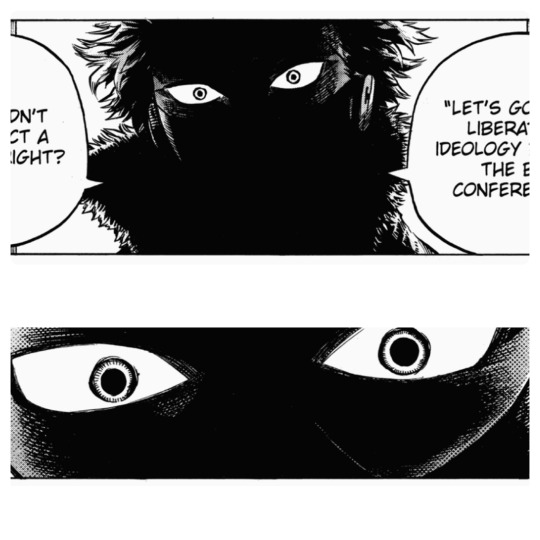
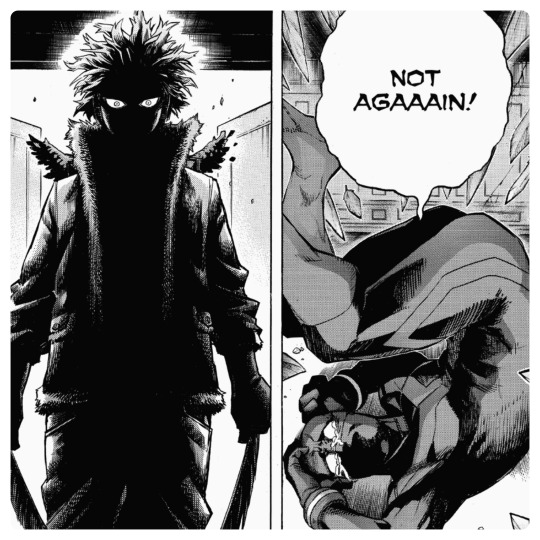
So look at Hawks here. Hawks is a hero, yes? A good guy, right?
Well...does he look like a good guy here? I’d say no. This use of shading was absolutely deliberate on Horikoshi’s part. I think we can all agree this was a really dark moment for Hawks (no pun intended). He stooped to a level nobody ever wanted him to, a level Hawks himself never wanted to. This scene being drawn this way tells us that we as readers are NOT supposed to approve of Hawks’s actions here. And NOW, because of the way this scene was drawn for us, all we are left to assume is that something bad is coming for Hawks. Basically, the consequences of his actions have not hit him yet. So even though we haven’t seen those consequences yet (it’s really frustrating waiting ngl), we know that we can expect there to be something dark in Hawks’s future. Many other meta bloggers predict his death, him dying heroically in order to make up for killing Twice. And man, that is very much possible, however I’m still waiting to see what more develops in Hawks’s arc before I make that prediction. Hori hasn’t given me any reason to believe that he’d actually kill off an important hero for the sake of the writing...yet.
Another example, and probably my favorite panel of Shigaraki so far because it’s gorgeously drawn (and sad as hell):
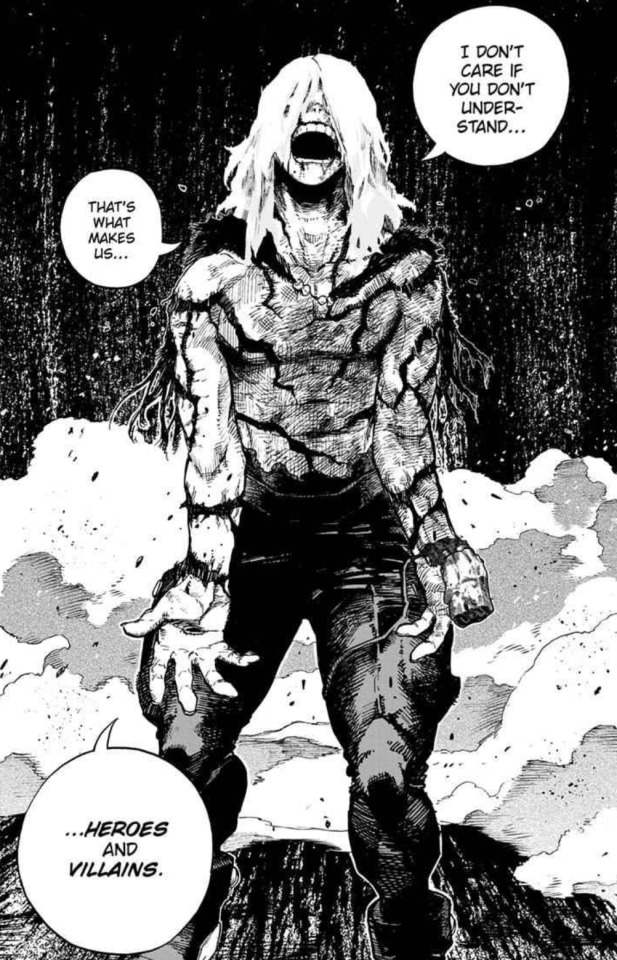
This panel is supposed to make you feel his despair. He’s surrounded by a black, static background, his figure is drawn with an insane amount of detail. You can tell just by looking at it that Horikoshi put a significant amount of effort into this one panel compared the ones that came right before it:
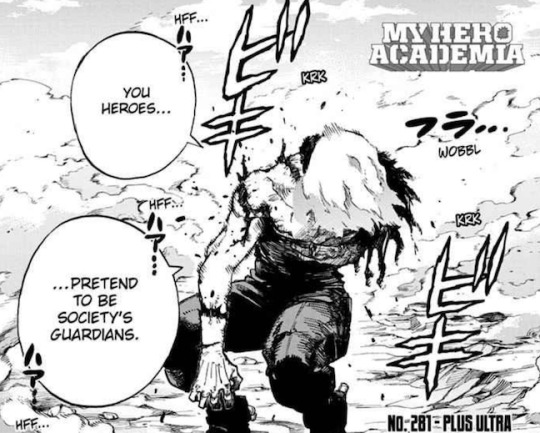
This is same scene, same chapter as the panel above, but the background and shading is totally different. I’m only showing this panel here to point out how important the panel above it is in comparison. One is a panel that is simply moving the chapter forward, the other is meant to stop you for a moment and make you react to it. Horikoshi made sympathetic villains, and that panel of Shigaraki practically begging people to understand was meant to evoke that sympathy from the readers to prepare them for his redemption.
There are probably a million examples from BNHA I could use to show you the importance of shading but I’m going to move over to one of my all time favorites: FMA
So this lovely fellow below, Roy Mustang, is a protagonist in Fullmetal Alchemist. Fullmetal Alchemist is a series with similar values to BNHA. It acknowledges the value of the human life. It acknowledges that once someone is dead, you can’t bring them back. It acknowledges that murder is wrong, no matter the reason.
Also, similar to how BNHA punishes the villains for their quest for revenge over and over again, FMA also portrays to readers the dangers of following the paths of revenge. There are two characters in FMA that show us that danger, one of which is Roy.
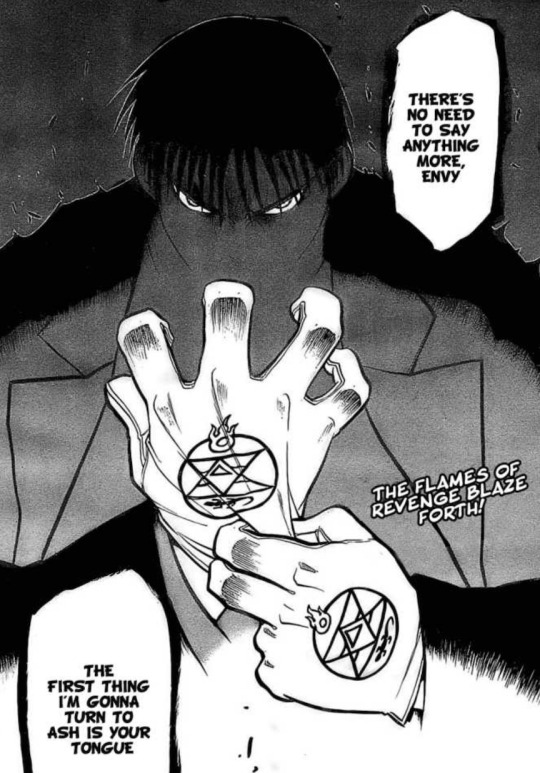
This is a big moment for Roy because he just discovered the person responsible for his best friend’s death. And now he’s out for blood. But this panel above tells you that this is a BAD IDEA. Shrouding him in darkness, not showing his entire face, hiding him in the shadows--it tells you that he’s on a dark path now.
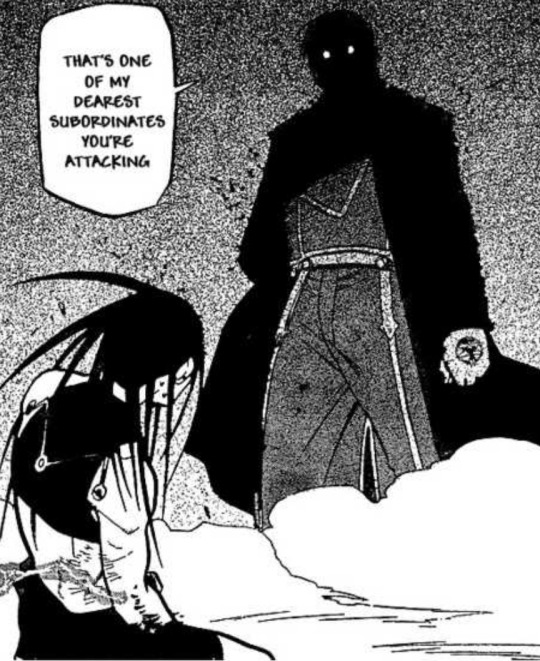
Look here, this is kind of similar to how Hawks was portrayed above. Roy is standing over someone who he clearly has power over, someone he is about to kill out of revenge. Envy is a major antagonist in FMA right until his death, but simply because of the way Roy is drawn here, devoid of human emotion because again, you can’t see his face, Envy is almost sympathetic when he finally does die. (BTW, he does not die at Roy’s hand). Roy is a protagonist in this series, but here he’s drawn looking incredibly evil and scary--for a reason. You’re not supposed to approve of his actions. Roy set out for revenge and his narrative consequences came not too long after this chapter. So basically, just like with any other story:
character does something we know is supposed to be bad-----> something bad happens to character as a result
I’ll give one more example from a story that is not similar to BNHA or FMA in the slightest, but still uses that dark shroud in the same manner.
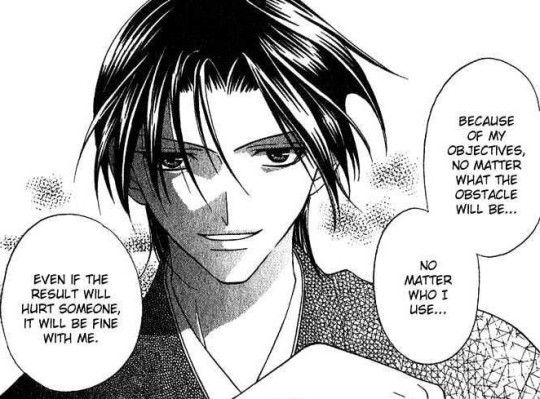
Say hi to Shigure from Fruits Basket. Shigure is kind of...an anti hero? He’s a real asshole. Now Fruits Basket is shojo and the stakes aren’t near as high or dramatic as BNHA so the tone is a bit different. But even with one panel here of this guy’s face, you get that dark, cynical vibe from him. And well, he is dark and cynical. If you read the story from the beginning up until here you can tell that he’s a shady dude (no pun intended again I’m so sorry), and low and behold he is one of the more questionable characters in this series. But this one darkly shaded panel is the introduction to that dark side of him as a character.
Basically in manga shading is tell all for how you’re supposed to interpret a situation. But aside from shading, the SIZE of the panels are also important. Those Hawks panels above took up entire pages. That Shigaraki panel took up an entire page. Those panels of Roy took up an entire page. Obviously the author wants you to pay attention to the story those panels are trying to tell. The words of the characters matter too, but sometimes you have characters whose words you can’t take at face value (*cough cough* Dabi *cough*) so you sometimes have to go off of the artwork alone.
Aside from the manga itself, mangakas also release colored prints along with their series. A lot of times these prints don’t have much to do with the events within the story, but sometimes they do. And I talked here about how Horikoshi really correlated all of his art of Shigaraki with the current place in his arc, and about how now that Shigaraki’s redemption is underway, he’s drawing Shigaraki in such a way that shows him growing closer to his hero counterpart who is currently on his way to save him, and also just portraying him in a less villainous manner than before. This isn’t always the case though. But Horikoshi did it and when that last color spread came out I got so excited I kind of just rambled with excitement lol.
SO I know it wasn’t much to go on but I really hope this helps you a bit more and what you were looking for! Shading is the most important since it’s all black and white, and then panel size is important too.
I hope you read more manga and join us in this hell! Lol
#manga analysis#art analysis#bnha#fma#fruits basket#boku no hero academia#Fullmetal Alchemist#fmab#fma manga#fullmetal alchemist brotherhood#furuba#fruits basket manga#shigure sohma#shigaraki tomura#bnha hox#art#anonymous
22 notes
·
View notes
Text
Auror 99 - Chapter 3
A/N: Feels weird knowing I didn’t post anything yesterday (literally, nothing), BUT I’ve been doing a lot of writing. I was finally able to get chapter 3 onto paper! For those of you who dropped me some prompts, I’m not ignoring them, but do know it’s going to be a bit before I get back to those as I really want to see this story unfold first. Thanks for your understanding!
*************************
Chapter 3: Bonding
“So...do you mind if we take a look at the cases that are already outstanding on Gerteso?” Hermione asked Amy after she watched Ron leave with Jake. She was only slightly worried about him pairing up with Jake. He didn’t seem like the most...reliable of detectives on first glance.
“Oh, yes, of course!” Amy said as she pulled out a pile full of case files. She began going through each one, and Hermione was noticing a pattern.
“Gerteso doesn’t seem to hang on to each of these identities for very long. And he only stole a minimal amount from their bank accounts. Almost nothing to make it significant. Don’t typical identity theft cases open up multiple accounts and try to liquidate a person’s funds for their own gain?” Hermione asked Amy.
Amy pulled some of the files back and reviewed them. “Huh. You’re right. I’m not sure how we missed that before.” Amy looked a little more closely. “He even got a hold of their social security numbers, but never attempted anything with it. What do you think it could mean?”
Hermione furrowed her brow even more. “Is there any correlation between the victims?” She and Amy were reviewing the various cases. “The bank. It’s the same across all the cases!”
Amy grabbed some the files and cross referenced. “Ugh, this is the last time I trust Jake with the paperwork. How did he not catch this?! He really is normally better than this. Well, we’ve got a lead now! Charles, look.” Boyle came over when Amy called his name with Harry trailing behind him.
“Whoa, Amy, Sterling National Bank? Do we know which one?” Boyles asked.
“It’s….the one two blocks from here!” Amy said looking at Boyle.
“Jason and I can go check it out. See if any of the tellers or the guards noticed anything off.”
“Great, Charlotte and I will comb through these to see if there’s any added correlation of when these took place,” Amy said, clearly throwing herself into work mode.
“Excellent! Jason, come with me,” Boyle said, grabbing his jacket. Harry looked at Hermione, making sure she was okay before following Boyle.
Amy and Hermione set to work, writing down the dates and ordering the case files by bank visit instead of the date they were filed with the precinct. “I can’t believe I didn’t think to do this to start with,” Amy said regretfully. “Captain Holt is going to be so upset with me. How could I let myself get so distracted lately?” She shook her head.
“Um, is everything alright?” Hermione asked.
“What? Oh, yeah, it’s nothing. Just getting over a breakup that’s all.” Amy sighed.
“I’m sorry. Was it a bad one?”
“No, no! It was actually needed. I just wasn’t into him at all..” Amy trailed off and glanced over at Jake’s empty desk. Hermione looked in the same direction to see what she was looking at.
Maybe this is the perfect segue to ask about Jake; make sure Ron’s with a decent partner, she thought. “So, tell me about Jake,” Hermione said, trying to change the subject away from her breakup.
“Jake? What do you want to know?” Amy asked a bit skittishly. She contemplated Charlotte for a moment before making the connection. “If you’re worried about Nolan, don’t be. Jake has an unconventional way of doing a lot of things, but he really is a brilliant detective! You can trust him. Are you and Nolan primary partners on the force?”
“You could say that,” Hermione said. “I just wasn’t sure how serious he was. I tend to worry a bit too much about things, I guess.”
“Me too, but I wouldn’t worry about that,” Amy smiled genuinely at her. “Shall we compare dates, see if we find anything?”
“Sure,” Hermione said, thinking how she really liked her new temporary partner.
*********************
Harry and Charles checked not only the closest Sterling National Bank to the precinct, but also the other two nearby, to no avail.
“I don’t get it!” Charles said with a disappointed look on his face. “Three banks, and nothing out of the ordinary was seen. Either Gerteso has several accomplices, or he’s incredibly good at disguises.”
That got Harry thinking: the likelihood of an invisibility cloak was slim, but disillusionment charms weren’t unheard of. It wouldn’t be the first time he and Ron had dealt with an elusive criminal because of them. But he couldn’t give that away yet to Boyle. “I doubt he’s got several accomplices. From what we’ve seen, he works alone. You might be onto the disguise thing, though,” Harry told him.
“Yeah, but it doesn’t bring us any closer to catching this guy. It’s like one step forward and two steps back the entire case!” Boyle sighed in frustration. He put the keys in the ignition and began heading back to the precinct. “Amy’s not going to be happy about another deadend. Hopefully Jake can get something., or Rosa on surveillance duty”
“Let’s hope,” Harry agreed.
“Tell me about Nolan,” Boyle changed the conversation abruptly.
“What about him?” Harry asked, watching Boyle’s body language carefully. He seemed protective and...slightly jealous?
“Well, we protect our own, not that you and Nolan and Charlotte aren’t welcome or anything. Jake’s my best friend. I would never let anything happen to him in the field, so I want to make sure Nolan will have his back like I would.” Boyle was definitely posturing, and that amused Harry, but also concerned him.
Was he a bad friend for not worrying about Ron in the same way? He shook the thought from his head. No, he just knew his friendship with Ron was stable. Plus, he was a brilliant auror that could hold his own in any situation, so he told Boyle as much.
“Nolan’s a solid guy. You won’t find a better, er, detective. He’s my best mate. Been by my side since we were eleven, so he’s loyal to a fault. No need to worry with him.”
“Good...good.” Boyle said nodding as they pulled up to the precinct.
Ironically, they pulled in at about the same time Jake and Ron had also returned.
“Jake!” Boyle said, “Any luck? We hit another dead end, but maybe Amy and Charlotte made another break in the case upstairs.”
“We’ve got something, that’s for sure,” Ron muttered as Jake had that giddy look about him.
“Uh, Jake? Buddy? Where’d you guys go, you’ve got that look about you when you...” Charles said and then gave Ron and Harry looks. “Who’d you guys see?”
“Charles, it’s fine! We went to see Doug Judy. Let’s go upstairs and we’ll discuss more,” Jake clarified.
Charles looked affronted. “Jake! I should have known! You’ve never been able to pull away from his charm.”
**************
“Good, you’re all back,” Captain Holt said. He came out of his office as the elevator dinged, and Jake, Charles, Harry and Ron walked out. “Everyone in the briefing room for an update.”
Once they’d all filed in, Captain Holt started by asking Amy and Hermione to start. “Santiago?”
“Charlotte and I went over the case files of the identity thefts again, and Charlotte found a pattern in the thefts.” Amy looked at Hermione to continue.
“Yes, it appears that even though all aspects of each victim’s identity were stolen, the only thing that was done as a result was stealing a minimal amount out of their bank accounts. No new credit cards, no major purchases, nothing of the sort,” Hermione went on.
“All of the stolen money has come from accounts at Sterling National Bank. We reordered the case files based on when the money was taken, and Boyle and Cooper went to investigate,” Amy finished.
“Yeah, but unfortunately we didn’t get any new information. None of the tellers or the guards noticed the same person coming in or out to line up with the thefts,” Boyle reported.
“We even checked the other two banks in the area with no luck,” Harry added.
Holt nodded. “Peralta, any news from your informant?”
“Yeah, he said Gertie’s got a few hideouts around Brooklyn, not that he knew where, but he’s definitely working alone. He said his main target is the Woolworth building in Manhattan, but didn’t know when or why.”
Holt nodded his head and pursed his lips. “Diaz? Anything from your angle?”
“Nothing on the surveillance videos today, but if his target’s in Manhattan, I’ll widen the search tomorrow to some of those hole in the wall shops.”
“Well, it’s more than we had this morning. You’re all dismissed for the night. See you in the morning,” Captain Holt said as he walked out.
“Does anyone else feel like we’re no closer than we were when we started?” Diaz asked, as everyone nodded.
As they filed out back to their desks to grab their things, Jake asked Nolan, “So about tonight. Still on for Die Hard?”
Charles heard and immediately chimed in before Ron could answer. “Did I hear Jake suggest a bonding night? I’d watch Die Hard!” he said eagerly.
Rosa sniggered, “Come on, Charles, really? You jealous of Nolan?”
“What? No, of course not, Rosa!” Charles said as Harry tried to stifle his own laugh. “I just thought this would be a fun way to get to know our new partners,” he forged on. “Order some New York pizza, pick up some beer and just hang out.”
Amy piped up, “Actually, Charles has a point. What do you say, Jake?”
“I mean, sure, as long as we get to still watch Die Hard. But my apartment isn’t big enough for all of us…”
“You could come to our place. The, er, NYPD put us up in a two bedroom flat a few blocks from here. We’ve got plenty of space,” Ron offered.
Harry and Hermione looked at him in surprise. Jake, Amy and Charles all nodded in agreement. They all looked at Rosa, who reluctantly agreed.
“How does seven sound?” Ron asked as he scribbled down the address for them.
“I’ll bring the beer,” said Jake.
“And I’ll get the pizza,” Boyle added.
“Charles, don’t order any of that weird shit you write about on your blog,” Rosa pointed out. “Better yet, I’ll order it, you pick me up at 6:30, and we’ll go together.”
“You don’t trust me?” Boyle asked as Rosa gave him a ‘are you really surprised’ look. “Okay, fair enough.
“I’ll bring some wine and snacks,” Amy said. “See you all tonight!”
Chapter 4 can be found here :)
18 notes
·
View notes
Text
Notes comp...
My brain had suddenly not thought the same way it did, oxygen isn’t getting to it the way it had, blood doesn’t run through it the way it had, it feels like, to a degree, an implosion, not unlike the shift that happens with tectonic plates at the earth’s surface. This means now I can hear my vertebrae at the base of my skull and beneath, the skull cracks at the fissures as if a point of gravity like a warp is reshaping it. My decision making now is questionable, not criminally questionable, but the decisions I make veer off into peculiar themes, for instance, the whimsy of advertisements. The reactions to them are strong, which may be heightened by a coinciding isolation, all of which could be explained away as neuroses, as so much can be, but the integrity of the diagnosis that that could be is greatly compromised by intangibles. I surmise that this has intended to be, for one, a narcissists’ program, in which the language is designed to close off the possibility of social and cognitive maturation. It, instead, endlessly punishes reflection, reason, positive thinking to include any emotional flourishes of joy, exuberance, self-acceptance, an inclination towards the trajectory of all healthy development…It has, I believe destroyed–an embarrassingly easy remedy for all of this notwithstanding–the reward system, an internal resonance for clear thought and careful consideration–qualitative thinking. I can’t wrestle with concepts in the same way I have before. There was a more careful consideration that’s not there anymore, which means the work that I do could suffer for it. The brain is an array of sorts or at least behaves that way, a receiver of input, often vastly ego-centric, easily, near-instantly at the mercy of impulse, which has never quite been that way in adulthood, the way it is now. The formulation of words, increasingly what I would like to articulate comes from an alien place, not that what’s alien has the facility to manage words and construct documents the way I do, but it isn’t concerned with the same things I’m concerned with. What this means is the concern I have for, for example, certain social or creative issues is nearly bankrupt, which means the history of careful, qualitative reasoning and feeling towards those subjects seems gone. This means that that has to be cultivated again, because it necessarily has to be, but it also means a new apprehensiveness towards the retention of new information. Again, a weakening of the faculties, a constructed impairment. This brain, now, acts not unlike a computer server, as if somehow, the neurons were network nodes (not nodes of Ranvier), and all of the sensory duties of the imagining brain were outsourced to a remote terminal. This means, for example, a thought is met with, incorrectly, insufficiently, a thought meant to be thought, perhaps–because functional-integrity is compromised–genuine, is distorted or otherwise presented as if controlled by a foreign catalyst, a facility with thought, with concepts, i.e. design, creative flourishes are intercepted physically, cranially, as much as that can resonate physically, and it’s changed into something that I believe corresponds to what the intruder believes is how a person thinks or means to think. This means that a premium, ironic, considering the possibility that this is of a technological source, is placed on control, not at all on the preservation of thought, or the possibility for general thinking, let alone advanced thought. Whenever an attempt is made to achieve a state of lucidity about the current circumstances, a punishment ensues in the form of blackmail, again social mutilation (anti-social behavior) or some other accusation of criminality or gross immorality. This may be the longest instance of sexual harassment I know in recorded history, as my penis is critiqued multiple times an hour, from flaccid to erect state. It abhors erection, like it’s alien or criminal. All of it is finessed to some degree by an ambiguity, in this case humor amongst other things, the use of interpersonal acrobatics, the continuous promise of a later reward. For instance, one of the things that happens, and this plays off of an already-intrusive guerilla marketing, data-mine marketing (likely a cover for pure harassment), is the establishment of a visual language that always to some degree points to something being advertised, a product you might potentially buy, which on its face is innocuous. But upon closer inspection, it does seem to gain accuracy with each attempt at subverting the feeling of even casual autonomy, any sense of self that comes from personal decision making. What this means is that over time a kind of probabilistic thinking ensues as a reaction to constant probability based harassment(e.g. Probabilistic Psycho-Linguistic Verisimilitude and Infinitesimal Approximations of Neuro-Physiological Reception in Experience Perception. Memory-Thought modulation analysis in the conversion of external stimuli into creative thought and output, partly through continuous tracking of parallel experiential or verisimilarly stimulated brains of a large population sample, and reward system increasingly tailored to positive correlative confirmation signs. Behavioral analysis through the continuous introduction of external and internal stimuli and continuous tracking of subsequent associated epistemological formulations especially in regards to the subsequent introduction of symbolically-associated stimuli, stimuli congruent with particular, personal, accurate or inaccurate epistemological assumptions.). This has the potential to render the target overtly spatially and socially strategic…which can cause irrevocable overt symbolic-interactionism brought on by among other things, helplessness: the methods of harassment are slight and mimic the symptoms of still socially-maligned mental illnesses such as schizophrenia. If you can imagine, an artist, especially one adept at symbols, abstract representation, is made to feel that he or she is responding to what vaguely seems like a phallic or feminine image, and he is, for example, then made to know that he or she is somehow influenced by that prompt to purchase which confirms his or her latent homosexuality, over time this admonishment, necessarily slight, acts as a kind of whip, to which an artist necessarily would respond to with a re-habitual sort of inclination towards the object he wishes to avoid, however ambivalent he might be. Over time the whip makes the artist, like Pavlov’s oft mentioned canines, salivate at the ‘sound of a bell,’ i.e. whip. This kind of harassment I think maybe tends to coincide with what would be a delicate time for an artist, or anybody, especially an inwardly focused artist or person, transgression bound, piqued by curious psychological phenomena, bouts of clairvoyance, synchronistic peculiarities, a lot to navigate through without the addition of systematic, injurious harassment. If for instance it can be said that a person who constructs by some act of fate, his own clairvoyance, a streak of running into exactly what’s foreshadowed as a relational need or otherwise a break from an ideal state, is monitored by someone from an objective point of view who has knowledge of human behavior and the journey of humans, artists, he could potentially be subject to this knowledge, general knowledge, the artists’ knowledge, what the monitor knows the artist knows, what he knows many don’t know about these phenomena, the limits of their efforts to remedy the issue, to include among other things what would be professionally or socially unhygienic to pursue, and particular knowledge of marketing or other forms of harassment to cause irrevocable psychological damage. It keeps a record like a fingerprint for every instant of short and long term audio memory, neuro-instantaneous-configuration, and also manipulation at the cochlear nerves, perhaps induced neuron degradation aided by an overly nitrogen-rich diet that allows sounds to be affected. Either neuron or nerve frequencies are altered to match incoming frequencies, pressure disturbances that create sound. That means that as fast as the speed of sound, an incoming signal is intercepted before a conscious sensation of hearing can be registered. Also communication from preparatory (internal) speech center can be altered to fit incoming signal, or to conform incoming signal to preparatory (internal) speech (i.e. Attempts to further resolve name to voice, signal to name, voice/signal to image...performs as if it may not have specific local knowledge of content, but effects of it, how a datum associates with another datum (e.g. what regional voice and statement placates, even if the value of a statement or effect is unknown--how that's measured, how it's configured, what it means against other data, for instance, if a communal-neuro-topographical map worked with all measurable phenomena associated with brain activity), a relational database, e.g. what might correlate neuro-physiologically to what’s known through data-mining (what an image might sound like, what an algorithm for what an image is like, what a person thinks an image correlates to, would attempt to resolve if it had to ascertain the locus of significance in service of connecting data-processing-of-ephemera to verisimilitude in external thought processing, increasingly how an algorithm could think for you, could be used to subvert reasoned conclusions, to make empirical inquiry or research, entertainment, compromise trusted academic sources for instance by playing to statistically known impulses instead of supplying objective findings, papers, objective search results.) Points to what I had written earlier though about conquest through earnest action and exploitation of assumed unknowns. Audio converted in real-time to legible probable English (what the word most certainly will be at the start of pronunciation) audio interpretation is augmented by visual symbol confirmation, i. e. when audio fails, or when audio may certainly fail to be adequately echoed. Appears to analyze cord vibration state, speech initiation, and compares that against a database and predicts usage in tandem with image analysis, which could be gathered from a databank of images (Bing "like" image search) and image/word-concept association. The process of instantaneous ranking, a number assigned to every possible word outcome given an initial vocal cord vibration state, or speech initiation state, say 200 words starting with 'Bal...' (Ball, balcony, ballerina, balances, etc.). The words are then ranked based on probability which can begathered from historical usage and altered by the microsecond, nanosecond, etc., as the vibration, speech initiation, word formulation further produces a word outcome, until the dwindles to one word, or the listener is trained to hear one word out of possible multiple words, the most probable word given priority amplification. This code can be improved ad infinitum, based on linguistic, probabilistic, psychological, and environmental factors. A listener, possibly an operator on duty somewhere might correct machine code (?) as he notices errors in operation). Sound retrieved from temporary or long term audio memory, as well as the preparatory audio center is manipulated (enhanced or otherwise, modulated, withheld or diminished to produce effect.). Semantics, kinesiology and ephemera analysis, computational linguistics, linguistics itself, sonar, lip reading, etc. coupled with near-real-time incoming quantitative and qualitative data stream can all be used to induce the feeling of a second presence, a second set of eyes with you, and this is--if we were to assume that the data stream is coming from a witting or unwitting transmitter; perhaps an surreptitious or agreed upon installation of a transceiver on the person of the subject--without including the possibility for manipulation of the central nervous system, the frequency that governs or instructs, for instance, heart palpations, the perception of touch. A person could be outright impaired in various ways directly, or indirectly by, for example, stress, what are known as pain-points, if a cue were abusive, as in Pavlov's experiments with dogs, if a known involuntary, or voluntary made near-involuntary by conditioning were triggered to induce, for instance, a fetal-position defensive reaction. Where perception-valleys are present, neuro-experiential displacement is allowed to flourish, that means that with the aid of 'in,' a provincial cue, regionalism in terms of perceptual-familiarity, a person could be lulled into one form of intelligence, say the idea that a person is highly efficient at guessing various truths about your condition based on incoming data, but when the observers' analytical peak reaches a crescendo, possibly employing the infinitesimal, in terms of what can be gleaned, and as this contrasts knowledge of, a comfort level with previous analysis-attempts, a person could incorrectly conclude the 'real' presence of another entity. Audio-psychology, or other physio-neuro sensations can be used to create stories, especially if the belief-quotient of the participant/study/victom is high. Most people are not self-critical down to their neuro makeup, the particular universe of their mind and brain. Perception valleys, but for now, in as much as what's known about what it could know shows change modulated by location and some activity, for instance, a steady increase in rate of accuracy, or due to the fallibility of the senses generally but a known unreliability made increasingly more unreliable by sense-degradation, perception itself of this rate of change has to be called into question, as well as a perception valley, not only instances of impressions of what's known, but also for rates of change. While it can certainly be gleaned that some things are known (that had been, for instance, known to be unknown, in some cases unknowable particularly) and gleaned that some things are being increasingly known, there's still what's already known which is (x, unknown in quantity, quality, thus 0 to infinite, bad to extensive), and what's is increasingly being known that can't be known, that's changing at a rate that's congruent with known rates of change or not. Simultaneously, with that system there's a presentation of it, altruistically perhaps seeks partly, which may itself be a function of an outcome (to disinform, socially engineer some degree of.(cont.)..some degree of ambivalence, a familiarity with a signal presence to undercut the severity of what's being performed, to provide the illusion of a bevy of expected mercies, plethora of cognitive biases such as religious assurance by way of affiliation, assurance based on regionalism, etc. Mentalist tricks, and tricks such as game participation, match-maker, religion-based such as relieving you of talents buried, muscles not adequately used, which can lead to further illogical trains of thought.) to steer thought away from accurately assessing the scenario in general, the general nature of the problem, the specific nature of aspects of the physical problem, to attain a specific and/or general end through whatever can be suggested, including, as stated before, involuntary or near-involuntary responses to audible stimuli, which can provide new data. Other intrusive-(faux) inner-directed sensory cues can function in the same capacity. What's problematic, obvious, but needs to be made plain is that if more is known than prepared for or conceived, than more can be known based on responses to what's assumed to be known, for instance if internal functions of a subject are known, but the subject doesn't know that this is known, he will perform defense maneuvers internally, assuming that he is protecting something unknown. The information gathered from what’s newly known, now that along with internal functions known, the subject has unknowably provided, internal defense maneuvers, can be used to subdue another similar party or subject, or disarm the subject unawares, as they say, so that the subject's assumptions make him incapable of conceiving of a collapse externally orchestrated, thus attempting to solve an internal problem assuming an internal origin, not to mention, the peculiar conundrum that would arise if the subject knew what was known. Every response provides data, so nothing can be done, tactically, that wouldn't make worse the circumstances. If, what's known and had been known, for instance, is thought itself, an ability that would naturally need to be kept under-wraps, and along with thoughts known, thought processes, tendencies, probability, etc., now even a common sense response (silence, repose, a stalemate) is data, itself a maneuver. The continuum to some degree as much as feasible is the most appr. response. In terms of 'maneuvering' around this problem, what seems to me the most pragmatic approach is to, at the least, facilitate open communication (in qualitative proportions) relative to, or as a function of a rate of degradation of value certainties such as primarily the lived life, as much as valued the vital organs, the sustainment of societal functions. I.e. What can't be openly stated that needs to be has to be increasingly openly stated in measures where the positive difference (what's preserved) between what's stated and what's prevented by openly stating is optimal. In what can possibly take place, voluntary or involuntary reaction to perception valley nadirs (closest to truth, gravity), actual knowns could make more real unknowns, exacerbate the perception of a truth, accuracy in reflected/echoed truth, i.e. a known thought known could make more real the perception of a thought known, causing a relinquishing of a hold, a defense due to that assumption, that something is definitely known, or a certain capability of knowing is certainly known. Or in not knowing a thought is known, a knowing center is known, a person could activate defenses that become newly known data, available to disarm. The knowing that's synthetic, that means to make real a data-mined synopsis of a history and now, as much as real-time reporting and application can be that, has approximated the sensation of knowing, as I've said before, so the physiological indication of what it means to have thought, or applying a thought, especially to some external prompt--itself made to seem internally orchestrated, yet an outside prompt, the idea that some other entity, at least the way I would dream of it, is supplying a question that requires an answer, an answer I'm willing to readily give: the neuro-physiological sensation that I am, in a semi-conscious state, the recipient of a question asked of me by someone not me, the idea that it has to be answered, and that the options available, the memory or knowledge bank known is what's actually there, and all that's there, the idea and correlating sensation that that answer is the right one, that I have thought that thought, the desire to interact, that the voice supplied is of the image it's associated with, and that the subject would communicate in this way as a matter of fact, the rendering of the image to, beyond the fact of it's value--how well it's rendered, which is desired to fall into a valley of non-consideration, a given too well constructed to be fully-appreciated in a way that allows for effect-reception to subside and reasonableness to return tide and sufficiently critique--supply an increasing nudge towards what would be still not be a too unreasonable delusion of grandeur--of the grandiosity in each behavior of mine, as it's perceived, or some major failing of sense, that the elements of unconsciousness and visualization that would have to exist to make that point clear are what's actually there, and that that point made is one most salient, like a vacuum, that renders null excess-not-instantaneously-anti-thesis to what it means to convey, to make self-evidently true, that this is more than enough for completion--the sense of it that can guide, though, as I've written many years ago, truth and completion are separate things; one seeks conclusion when truth is tedious, and conclusiveness seeks truth when it's methodology and intentions are dubious, are questionable, to dress expedience, the rhythm of being undeniably-seemingly right or smart-sounding. But writing this, too, in a lucid wakeful state is subject to question, as I've left a state verifiably not my subconscious, the striving moment to moment is compromised as well, the certainty of whether or not impetus is genuine, has been eroded, outside of what's objectively, perhaps statistically sound in the findings of a most-reliable scientifically verified and peer reviewed analysis, and there's evidence that impulse itself, moment to moment, is directed by inauthentic catalysts--intentionally and directly orchestrated by some external source. What it could mean to allude to is simulacrum, but that's a psychosis term publicly. It's connected to weaving varying stories together that have 'no rights whatsoever' to be linked! Speed is not truth, nor is public consensus, nor is the spectre of utter demoralization and humiliation. In these conditions it's certainly difficult to objectively and somehow artfully probe into the idea of creation that seeks creation, or always in preparation of some future ideal. This is me inundated in another consciousness. The reasoning is now foreign, too. It has been that way for some time, but there's less of an obvious differentiation between the way I would feel about certain topics, even in sleep state that's barely leaving unconsciousness. The only way to maintain a sense of objectivity now is largely because of the nature of the thoughts themselves. Partly the game that's played here is rewarding the subject, in this case, me, with a right to healthy sleep, external peace through a decent lack of debilitating continuous sexual harassment, emotional abuse, discreet sexual and psychological assault, if I don't fight against diminishing qualitative thinking, which is preserving my identity. The continuous narcissistic drone that induces unhealthily defensive immediately rectifying mindset (of course at the expense of longterm planning and almost all deep, carefully considered thought). For instance, it continues as if there's some known secret violent, or sexually deviant behavior performed that has to come to light, of course through this style of torture. What it actually seems to be more and more is a conditional crime pre-punishment, a future-looking consequence based on inductive reasoning--ideally the crime, that, when this discreet torment has been completed, will, by its nature, have proven all of the tortuous actions taken upon me, just. But I believe this is based on a hunch that's arisen from the belief in congruence of data from a particular surveillance, even more daunting if that surveillance was coupled with conditioning by persons who would seek this outcome, the justification for that kind of surveillance and discreet torment then. This information, however, doesn't prove the truth of any one act, only the perceived likelihood, perhaps in the court of public opinion, which isn't sufficient. The persuasion that's continuously transmitted is, in a semi-conscious state, even made to seem to be me at the gut of consciousness--i.e. what it would feel like, neuro-physiologically to think and know it's me thinking--slyly, disarmingly persuading someone else to follow a line of thought that's anti-thesis to what I'd most like to suggest, but it may actually fit in more with what would be congruent with the evidence that supports the truth of an instance of transgression, which is what's sought after. At this point, it's really only the fact that I don't think those things, that I don't consider that content and often thus(thereby) genuinely don't like it, that confirms for me, the foreignness of it. It does tend to resemble what's described by Foucalt in Madness and Civilization when he says that power itself takes this route regardless of the people who associate themselves with it, so that all persons in those positions that act as factors in this system behave as needed to support an outcome. In that book he describes three tactics the asylum-keepers use to sedate the subject, longterm*: silencing through ex-communication, through various means, ending regular social interaction; playing to, however belittling it is and beknownst it is to the subject, their idea of grandiosity, their belief of their superiority or deep importance, the delusion that they're a high-ranking official or royalty or a celebrity, whether or not they actually really feel that way, even if they only play along to someone else's suggestion; and the third escapes me, but it believe it has something to do with thwarting immediate goals. Fear is another tactic, or some kinds of trauma tantamount to what traumatic occurrence has caused an initial inhibition ( as flawed as that sounds), and the use of family-ties to persuade, to bring the subject to his right-mind, the definition of which is malleable as necessary like-wise, like what I had written earlier, to justify the tactics used, often what's sought is an ideal external to who the person actually is, an unchanged personality that's often only what it has to be to put loved-one's minds at ease...for instance a person could finish school and be considered insane because, for example, school is ‘unnatural’ for his ilk (by way of his new knowledge he's writes or speaks like he aims to escape himself, or belittle rather than enlighten--usually the case when there's class-transcendence, when the actual numbers for progress are lost on an insular community, the national goal of education, or how education actually relates to affluence or career success, or gives a country it's competitive edge--generally preferred-- regardless of provincial opinions about individual cases), so a community could be persuaded, by the nature of their conditioning, to right the wrong of his enlightenment, to prevent continual learning, to, as overtly illegal and unethical as it is, seal off any chance for further naturally-resulting intellectual development. The problem in 2020 is that the knowledge of these conditions and disorders are known and that increasingly that knowledge is used to mislead the unwitting or support defamation or serve as peripheral intangibles used to wrong someone, i.e. it's weaponized. So street level skullduggery graduates and with the science of thought, there is increasing certainty, less error, so that the chance for something like this, an objective document, is less and less reliable. This might not be a reliable document. There could be for instance a gradual move towards planned happenstance, that secures planned outcomes. I had mentioned the systematic prevention of enlightenment or discreet impairment of the brain as it might be used for, for instance, discrete maths, or quantum mechanics, so lineage, documented familial inclination towards higher-learning, may more and more be seen as insurance against this. Gradually I'm made to become more and more comfortable with a second presence in mind, who, before any guarantee of compensation or noticeable benefit implores me to 'get out' or 'go up' or do a myriad of things as if I can, at will, make those outcomes happen, or as if the fact of my being or maturation isn't in itself, right, or self-evidently wrong. What it feels like, as I've stated before is rape, a marathon of rape-marathons, that itself forcibly becomes a new norm, and I'm responsible for my own pain, guilty for being violated, guilty for being hurt or protesting the rape-marathon in any way at any given time, especially if that protest gives some semblance of respite. The idea is to simply have it stop: I would like it to stop, I have never known this to exist, It was never a reality to me, I don't want it, I have nothing to prove. I only have to become more intimate with what I'm most interested in, and this something I can do without any help. The goal is the extensive depletion of the brain, mind, and eventually everything else. The prize, I believe, is what would strike a person who might encounter me, what would constitute a strength, and so one might like to see me or someone, for example, lose their ability to think in the way they are accustomed to thinking, especially if it's unique or adequate, or proven. Reasons can be as malleable as they have to be, to be sure I don't pontificate or don't mull over problems in the same way. There's an urgency in disrupting creation or thought production that reminds me of poverty-stricken children battling for crumbs or pieces of food, a certain scarcity-mindedness, or zero-sum, end-game, stubbornness. The chief goal here would be sabotage for highly-personal ego-driven reasons, not reasonableness. I'm made to believe that I should make some arbitrary authority my authority where there is none, and one is certainly not wanted or needed. There are large amounts of external stimuli present around me under the guise of helping me think. What this means is a demeaning attempt to forcibly outsource responsibility, which I believe is to make me comfortable with encroachment, especially to reveal private information, even information it is illegal for me to knowingly reveal, illegal for someone to forcibly extract from me, or frame me for relinquishing. Even as thoughts or thinking can be approximated, specific thoughts are more and more echoed in media, but not as general foresight or the synchronicity-high that follows a break from the ideal, a relational dependency, what state of being and thinking would have to take place to make sufficient meaning, or the actual events as genuinely foreseen meaningful encounters, but something else, almost as if I can't think unless each thought is good enough( this bypasses the feat of controlling each thought to even close to that extent to begin with), which they can never be if they're subjectively assessed, and goodness itself has to be questioned here if thoughts are more and more produced (which they are) by some far less adequate (for what I do) external transmitter, as preposterous as this sounds, the fact that I would ever have to consider a second presence in mind as a police for any reason. *The third here was constant references to the past--the asylum keeper would find a way to have the subject ensnared in his own past, which they could always refer to, if they've been keeping good notes, and the subject would ideally keep searching for some answer not readily given--partly due to an unkempt or unreliable memory in tandem with continual subliminal and overt cues to stop actively thinking--but instigated by past psychologically unresolved occurrences that are constantly urgently alluded to, one by one, until a certainty is achieved that further sedates the subject. Non-empowering recollection. More and more, in the morning and at other times, like in Iowa, in the morning, a foreign personality takes over, in the same way a foreign laugh did then, a foreign consciousness, for instance what would be the way I would seem to go in a more generically paternalistic manner (and also paternalism or masculinity as brutishness, manliness as primitiveness), a voice less fluid, a word selection accounts for less nuance, which is even less refined than the initial incapacitation of the basal ganglia, other parts of the brain responsible for high level processing of concepts and a usual work-history-consistent manner of contemplation: what would work for flavors of contemplation, art-thinking for art-writing. More and more the spine is the outermost protruding part of skeleton behind me, the skull is continually pushed forward, the trapezoids are tightened and forced high along with my shoulders (to sit at the top of my torso not at the sides) and ass is coached to increasingly remain tucked under, the back is therefore elongated and bows outward like a bulldog where it approaches the neck(notes from earlier: There’s a constant incoming at a particular numerical rate, a transmission of the kind of stimuli that can’t be easily thwarted. One of the things this results in, or has occurred in this instance alongside it is an ever tightening of the muscles around the trapezius and upper latissimus dorsi, the sides and back of the neck. Quickly, it feels primitive, not in that a person who is muscular there is primitive, but that it feels like the option to deviate from that is increasingly gone. The top half of the skull increasingly sinks into the lower one, the eyes are forced close together than normal–it more and more resembles down syndrome. It feels like it, too. Due a lack of sleep, and again, continuous aggression the eyes are sort of recessed into darkened skin that sits inside the eye sockets. What I have now, what I use to make art is a kind of secondary vision, it’s a secondness of vision. That sense is merely accessing footage, which I translate by way of recollection of what an ideal visual encounter was like. Again, the skull takes primacy, the eyes are a happenstance of the skull. My teeth are slowly reaching the beginning stages of brittleness, which I’ve seen happen quickly almost unnaturally to people I know.), a layman's cognitive consonance is expected to result from daily nudging to escape yourself, to 'leave your head,' as if leaning forward, an animalistic lean is what would make a person more himself. The overall goal is to completely disrupt bodily coordination. What this means, partly, is a conscious operation of the body to replace what should be thought-work, contemplation for interests and work, and other activities. The faculties are increasingly disrupted. Increasingly, simultaneously aptitude is compromised and replaced, the rate of intellectual growth is slowed, the quality of it increasingly less valuable, originality is directly minimalized as a result, and wherewithal for self-propulsion is increasingly made voluntary. The base-work of easy recollection, long and short term reflection, sign-creation, visualization, is forcibly outsourced, and all of it to mock all thought-processing as a means, itself, the reality of that depletion, to distract from an initial crucial loss of deep-meaningful consideration gained over time, through encounters, close-study, long-term deep careful-contemplation of the best that can be thought, for itself, it's own sake and as a foundation for future application. The brain is continually attacked, continually made to be atrophied object, as stated before, increasingly cadaver-centric. The body carries a head, an near-dead extremity, not a center. I'm made to reach, to partly consider at least as a fleeting thought the idea of my brain, my body and mind being diminished to enhance another life, of course, a life that hasn't worked for that reward and who boastfully will not compensate me for that depletion. The game here, as stated before, is to make a person believe many people are hiding from an anonymous machine that doesn't know who I am, and only plays to a person's ego (therefore a shameful thing to admit to being bothered by), their idea that this machine is referring to them and not some collective. The ego is conflated with thinking itself, it means to make the case that thinking, especially high-level thinking, or the way an educated person normally would think about his world, is only meant to nurture the ego. There's a lull in the machine's operation for continued thought-work and contemplation, but this is only to create the illusion of an order within this terror, and one the subject should subscribe to, an authority, where it would be most troublesome to a power-monger to not have one, where there should be none, a whip for thought where no whip is needed, an eye and narcissistic cloud for each thought, even after a major collapse of the faculties, the urgent establishment of an authority where it would only worsen not improve work. For every thought, there's its counter-thought, but not the specifically tailored counter-thought I'd employ to help me gain and retain healthy objectivity. Another game that's repeated here is the idea of inevitable competition, and a naturally occurring inevitable authority over that for the quality of thought a person possesses, logic with every thought, which is not my goal, and not desirable to me. By it's sheer presence, the authority expects forfeiture of sovereignty, not its own death. All of this is not the same as the carefully-tailored thinking I or any person might develop over time, that I have developed over time, the specific way of dealing with people I've cultivated over time (both fallible but uniquely fallible), that's particular to me. This is an externally-orchestrated intrusion on internal space, that can easily be made to seem like an internally-originating mental breakdown. There's a narcissistic drone, that of course works against what it means to administrate over which is the worst of egotistic impulses, the most publicly despised by the most people, but this is accompanied by continuous manipulation of bodily sensations, neuro-physiology and even thought production. What this could easily appear to be to some unwitting person watching is a person struggling with undesirable impulses and characteristics, a person who needs professional help. For instance, if an external presence is forcibly coaching a person to think of murder, in tandem with manipulating the brain, mind and body to viscerally feel that impulse at gut level, that external presence, now internally situated, would taunt or shame a person for even thinking along those lines which would be especially difficult to manage for a person who clings to moral standards. This person witting could perform a myriad of exercises to regain equilibrium, perhaps include that in a daily routine, but a person unwitting could be tragically set back by this constant shaming, which could erode at their form, their freedom amid granted societal freedoms, inalienable rights, or slavery amid all of the resources available for assuring freedom. The shaming would exacerbate impulse, which could lead to impulse-fulfillment. It means to diminish all strengths and not as germaine to some lesson or attempt to target someone else, and it means to outsource all thinking, all facility with various functions, all of the faculties, that are healthy and in some cases above-average. Each day the ability to clearly speak is more and more compromised. My facility with language is increasingly minimalized. Word selection or word memory as needed to sufficiently convey exactly what pertinent is compromised. The ability to convey nuanced thought is diminished, as an echo of actual loss of nuanced thinking. I get the strange feeling that the voice I'm left with is that of someone who makes bold pronouncements, as if drunk in grandiosity, that I would be given over to, as I've said before, delusions of grandeur, however congruent they might be with my actual experiences--not as a celebrity or a politician. The main point is that whereas before I would simply focus on the concept to be conveyed and language-usage-facility was subordinated as needed, now, more and more, I have to be sure speech is accomplishable, and I have to prepare for unpredictable preparatory-thought-failures in regards to overall poignancy and particularly individual word usage to reduce uncertainty (to minimalize latent egregious misinterpretation), and so where it may seem to be the case that one would gain a noticeable benefit from relinquishing conceptual wherewithal in service of immediately detectable thus resonant linguistic dexterity, that soon gives way to another voice less refined (less directed) and perhaps therefore less resonant, or perhaps additionally to some other less easily detectable benefit, e.g. pure (quality) thought for pure (quality) experience, not that the two are always mutually exclusive (that one couldn't be the other). Part of this erosion, I think, has to do with the idea that reality, real-reality is only gained through eschewing internal order, a private order, especially one that allows for deep healthy careful contemplation, reflection and foresight--even if only with definite plans and timely responsibilities in mind. As if dreamscape was a reliable window to some truth, it's treated as if all of its admissible in some invisible court, but what's manipulatable is imagery, like I said before the way a newly wakeful state, a state just before pure consciousness can yield the crest of inhibition, what dreams address mostly abstractly, especially as deep as orchestrated externally based imagery can be planted or seeded by mentalist cues. More and more the deepest unconscious whimsy, what's uncontrolled, is made to bear externally orchestrated fruit, or what can persuade or suggest at the base level of thought, especially in as much as it subverts structural integrity. Even if by only a delay in the body's reaction to the brain's signals, physiological sensations that sometimes accompany dreams, not that that's in anyway whatsoever a punishable offense itself (for instance an erection at the sight of a necrophilia orgy, at bestiality or something worse), can be manipulated to train personal tastes, or supplant the bedrock on which one might stand to declare something from a rightful or righteous as well as a reasonable standpoint. This might not seem like much if it weren’t for the fact that it's accessible, and especially to an unwitting subject, it could seem to be omniscience through authority, which could turn noble but, perhaps albeit reluctantly, strict adherence to morality, a kind of torture. A person who wanted to fully assume authority over a person could use this to control behavior over time, especially in an environment where morality is a kind of currency, the feeling of it, the feeling of goodness, a person's sense of his own deep piousness, or the way it's perceived by others. This could be disrupted to sway other people or make some point to a subject about the limits of how he can feel about himself, or a point about what a subject ought to feel about himself, given what's 'apparent,' what’s 'obviously' known. Their aim is for me to be aware on their terms, to see my own particular trajectory, the awareness I've cultivated, the style of thinking I've developed, nearly the only way to be that would suffice for seeing me through to this point, as wrong in itself, without justification needed for that final judgement, that certain prosecution. I'm blacklisted. Again, freedom is taken from me at a crucial point in my life, and I can't get those years back. I'm attacked by a transmission that reads thoughts, and certainly does so. This is a weapon of war. It's masked as probability, but that's not what it is. It prevents me from starting a viable business, and it rids me of every worthwhile idea. I can't pray. I'm made to viscerally experience consenting to inferiority, or recognizing a superiority that's made to seem true-in-itself, that's above empirical inquiry. More and more each morning it's difficult to articulate what exactly is taking place as immediate recollection becomes weaker. The sensation of being a host for another presence, another consciousness becomes more and more visceral, as if, for instance, the way I could know, neuro-physiologically, what it means to be myself, to be me knowing, was overtaken each time I slept. This is something I only somewhat consciously detect when I wake up, and it's a realization that's increasingly forgettable, like a temporary bout of Alzheimer’s, as much as memory could be a mood, an aphasia for short term memory. I can't remember exactly what was said, but it involved me remembering a date and conveying that to someone, but now more than any other time, the date recounted, and all of the sensation of knowing was present, as much as a person could think to know something or arrive at a conclusion, work through a problem logically, the sensation of the way the mind functions when it rationalizes. A date was given by me to someone who asked for it, but the date given was different then what I could glean from another channel of communication which was also not generated by me, even with the way I know I present images in a dream, another channel, both foreign, presenting two problems. One problem is the problem of simulacrum, the idea that a problem exists to begin with, that the environment is mine, that there's a problem that's mine to remedy. The second problem is that there's one channel that isn't privy to the other, and is determining perhaps by probability what it must be like to receive a sort of para-communication and communicate back, but failing at the transmission of specific data points. So, there could possibly be another channel of communication that's there subconsciously, the one induced by some outside coach, the subconscious machine code, one I don't consciously know, that's made to respond to this other unbeknownst to it, incoming channel with as much verisimilitude as possible, the way a person who has to parity check or verify a secure channel could read into what it has known about the way my neurophysiological behavior would correlate to a transmission. As much as it might seem to be exceptional to communicate in this way, especially for a truth that has to be weaved into a kind of persuasion, even when that means nothing at all, the correlation between the way something is said, the means of saying it and the truthfulness of it, I only get moments of possible relevance, that it's not all gibberish. Mostly, though, it's still persistent verbal assault that's optimized over time combined with a more and more accurate appraisal of my surroundings and physiological states, neurophysiological states, even thoughts, as images that are produced by me, made to be seen as I see the world (so perhaps an interception as a catcher's mitt back there for the way I see, as much as that can be thought or correlate to thought, but more and more it seems that the way this is known is by what could be gathered through large number analysis, the sample that a image-focused search engine would have to have, to...at one instance, say 'this image is like this one, so therefore this image might likely be this one,' especially the way this could work for facial recognition, and, on the other hand, the way words can correlate to imagery, so the often searched images as they correlate to words could coach AI machine code to know an image means this word, which it could stylistically, using a regional voice, say. There's also what correlates to image neuro-physiologically, that near-instantaneous and recordable state that can serve as one datum entry in a library, a relational database for image-text-neurophysiological correlation. This can be married with content recognition by an actual human observer, who by less and less of an imperative needs to coach the machine on what to know, especially for an increasingly large number conforming population, perhaps the erasure of inner-directedness, but certainly the reduction of micro-decisions, or at least the weight that each one of those might hold, the complexity of that with recollection, reminiscing, self-perception, self-awareness, and likewise all of the different types of awareness and sensations, especially in as much as that could disrupt the accuracy of large number assessments in an age where big-data is oil, where data is currency, and as much as that adherence to large number data, perhaps a cousin of the natural human tendency to conform to technology, as much as that reduces the likelihood for genuinely differentiate-able creation, the ability to work in that capacity, idea creation, and safeguard it, becomes increasingly valuable. So what seems to be playful in mind, the wackiness of preventing all of the myriad of ways a person could perceive the world or contemplate it, a steady stream of base-communication, only wide-eyed, exaggerated reactions, for one--that diminish sound outlook, that counters little moment-to-moment realizations, and sparks of self-perception or self-adulation, and past savoring, etc.--is not valuable in the sense of working with concepts, the elements of sensation to create ideas. Yes, as deplorable and disheartening as that sounds, there does exist work to dismantle thinking itself-to-demoralize, which is tragic for most professionals who actually need to contemplate to get work done. There are people with the means to demoralize people in that way--know what a person is thinking, which could mean something if it were a way to say something about the score between the two: the continuous encroachment on thought by the technological world and them, and use that to say the people’s thinking, which might largely make up who they are, is grossly redundant, thus useless--and if demoralization isn’t the goal, inherent illegality of this method notwithstanding, they might not appreciate why and how working through problems unaided, unhampered, with pinging faculties, often yields the raw substance of individual wherewithal (the numbers might point to documented aptitude, verifiable performance as more certain predictors of meaningful thought-work, but there’s evidence of crucial high-level innovation resulting from the later-perfected peculiar-mindedness of once-crude thinkers) which is important because it is infact so often the road enlightenment and inquiry takes, which civilization tends to trail. Considering that much more than what's obvious to me could be known by what's causing this, for at least image recognition, as I've said before, the way a search engine algorithm could link image to words or image to image, an arrangement, the means of detecting image production as it's received by my brain, how it would have to resonate physically, the elemental matter associated with it, and how that would have to correlate to at least what's analogous to an analog-to-digital way of having a non-human instrument interpret with increasing accuracy the actual content there, if we assume what's being felt, followed by what's seen is genuine, and not externally-originating orchestration ( assuming no manipulation based on raw data configuration, a coordinate assignment of each datum, the way that can be recorded and retrieved and over time correlate to meaning, health states, later behavior, entelechy, etc.). It's possible coordinates could be known within axis, a spatial verisimilitude in the way an thought would be orchestrated by a person, basically how a person would conventionally think, at least. If, for instance, it could know the way sensation, the way the brain reacts correlates to a type of image, e.g. a face, within that category, it could reference a library of images that are categorized based on tendencies in appearance that would better ascertain content, so only as much as facial features lead to more certainty are they categorized, in this case, the certainty of what correlates to thought, the way thought could be known with increasing accuracy. So what takes place is prompt in the form of a playful improv on image production awaits confirmation in the form of 'yes' or 'no,' the behaviors that fall under those categories, to know what seemingly ambivalent behavior is ultimately revealing, the way Charles Pierce (W. James?) posits there is no lie. Once the confirmation is received it becomes a brick stacked in service of certainty, the later improvs are more accurate, executed with confidence, for instance an animated image after once thought as static when probability is above perhaps 95%. It could be that in some cases only temporal disposition is known as it's associated with image after an image is thought, a one-off image produced and then externally manipulated, the following thoughts as much as disposition points to this, are perceived to be likely to follow the same pattern, so another face could be perceived by the machine, but in not knowing who the face is immediately or having in that following instance the capability to 'recognize' the type of face, it prioritizes a moment of possible continued follow-on manipulation with an animation like before, one that correlates to an old man, as opposed to say a cheerleader. There are supposedly recorded occurrences of ESP, phenomena, or technology that transfer another person's mind into another person, that would allow for a kind of symbiosis that could carry out this flavor of mischief. In the quanta-age, the one that follows this one, the data-age, it might be said that nothing could be known to be truly debunkable without knowing that, the entirety of circumstances, even though we know in theory one realm, the subatomic doesn't significantly disturb the other, 'reality' as such. If this is all quanta-sized, all physical matter as quantity, then it's possible that all that could be known, quantified, would adhere to principles of probability in as much as an understanding of the movement of gas, vapors, could be optimized, I mean, the way that led to this, to what would seem to be todays understanding of the way subatomic particles work. This could know in exponentially large magnitudes, all of the varieties of living, all of the scenarios a person might encounter that would re-introduce agency, only eluded by infinity, which I've stated before is problematic because of what it suggests, that there is a world so much like our own, that it has to be us (if this were not the case, then according to what infinite entails, then an Earth or a 'me' exactly the way I am now that would have to stop just shy at whatever difference would have to exist to make it not me, would negate the idea that this is not in some way finite, there would have to be an infinite just like infinite minus the smallest possible liminal quantity it takes to make this possible, a physical quantity that both exists and doesn't exist, exists and doesn't exist only as a function of this system--that there has to exist an exact duplicate of infinite or more within all of the nearly-identical copies of it, which would still not define existence as finite, the way that infinite would seem to need to be the case from a linear causal standpoint (Ephesians in the Bible, for instance, says men are not wont to reconcile a beginning and an end of existence), a particle would have to be 'newness,' enough to differentiate one infinity from the other but not enough to mean the two aren't the same, exist as what's not to be copied but also does not exist, the universe in how it functions would have to be always in the process of becoming itself, like a rising yeast as it's cooked, as experienced by someone who could only experience that in increments, like an electron that travels along a copper wire, not an external view of all states imaginable, every possible outcome, perhaps the way it actually is, the way we view a copper wire as opposed to the way an electron does.). There's an assumption that an externally originating transmission wouldn't know to work with a person's sensitive understanding of the way he communicates intimately with other people and to himself to arrive at a desired conclusion, so one would first have to assume in this case an alien-to-self-entelechy that understands this, that would have this understanding to do this, to cause mischief, or that an entity would know this is the path of least resistance, with no value intuition, not even finely tuned, only using knowledge of perhaps neuronal configuration, each one like a fingerprint instantaneously and what that tends to correlate to. There are simple filters for processing thinking that could cause large perceptual shifts just based on that, neuro-physiology, like a delay in thought, which I've stated above, an externally-based orchestration of the fundamental way a person thinks. Even now there’s more thought as murkiness in terms of recollection of what it's like to carry on with a line of thinking with the knowledge that what's thought is what intended to be thought or that a branch of thinking, what would follow what in terms of how I'd most like to state a truth, the easiness of stringing together words that would make a sentence that personally rings coherent, and more of smartly timed cues to suggest the inevitability of all of it, as if it was normal to think wrongly, as I've never thought before, like. for instance, it's a foregone conclusion that my mind is imminent domain; a voice cuts in with something that sounds like a intercom. The knowing center, especially objectivity as a base is continually compromised (one way you could approximate the gist of what's taking place, is if you could imagine this was of the utmost urgency, that for example, a person needed to know for certain that what I've made or some core part of me was exceedingly discreditable for sure, the way a person who has assumed his own superior rightfulness would have to save face for projecting onto an artwork for instance his own foibles and vices, hang ups and inhibitions). It could be that I'm being told something, but on the face I get nothing of definite value informationally but what would seem to be the goal for someone who needs to save face and can't do it, or is faced with the specter of it, a gradual depletion, everything that could be done in this span of time to creatively rewrite my conspicuous trajectory of making art for decades, having had made art for that amount of time and attending high school and college specifically for that. This is mostly taking place in the theatre of semi-consciousness, and it’s still performed as an ongoing court, which is problematic when this internal narration of external and internal meaning is epistemologically attuned, more and more knowing what it would take for me to believe or how it feels for me to know what I'd most like to reasonably think. By way of this, saliency is reduced. The feeling of knowing and thinking what I'd most like to think, and communicating that way is compromised. This saliency is difficult for me to achieve without sanctuary, an actual private or peaceful space in mind, a few minutes, within several years, of actual quiet, the actual guarantee of no added presence or accompanying voice, as well as--if at all recoverable--the feeling of knowing I'm alone in thought to contemplate what I'd most like to, through to completion, especially as much as it fits in with my artistic goals, through to satisfaction. As a side note, there's a tuft of muscle at the base of skull situated behind the ears that's increasingly bulky, and, as much as it's served as a barrier for it in the past notwithstanding, it does now, more and more, prevent the jaw from settling into an involuntary state, the mouth as it happens to a lot of us is overly worked, especially in those times that can last when I have to mouth what I'm meaning to say before I say it, to prevent egregious misspeaking or overly erroneous logic (In Strunk and White’s bestselling ‘Elements of Style,’ a book still in heavy use today, this is introduced as a technique to improve writing, so I’d imagine many millions of people still do this.), but I think this also has something to do this wakeful state, the continuous disruption of healthy sleep and this other thing, the entities we wrestle with, the externally-originating incoming that’s sent, as well as ourselves. The reaction animations are randomized and then made to seem significant. The follow-on statements are often directly proportional in emotional gravitas to the instantaneous belief response, the nearly-involuntary or involuntary one. An image of a known subject is shown, projected, and a follow-on animation is meant to indicate something permanent, some record of fact, like a how a person might deal with what's going on now (If you can imagine how much that could bring a subject into a state of comfort, the way Foucalt said that might occur after being treated in an asylum.), what's happening to me, symbolically, a gesture that's means more than what it is, which further inculcates a person in overly reading behavior as sign, to further eschew healthy selective awareness and selective observation. It's a basically magic 8-ball toy that becomes increasingly more apt over time, so that more and more the indications of randomness, the differences between how a person knows what’s believable as symbolically pertinent and what's orchestrated are diminished over time. This is exacerbated by external and internal cues to believe more, to contemplate less. The capacity for extended careful contemplation is reduced significantly within the first contact, and is almost lost completely a short time after that. It would think it would be nearly-impossible for the undereducated, underaged, disabled to be aware of what's taking place as it's happening. This is how a I imagine it would work: a list of options is run against a list of identifiers associated with each documented sensation. When one sensation registers, it's linked with an identifier, this sensation could be one of reflecting on someone of importance, possibly an influencer, a sub-identifier or subset of identification code could link this to a internal sense cortex, such as a visualization. This sensation and this image is connected to a symbolic animation option such as a turned head for a portrait. What then exists is a record of this projected image and this follow on animation option. I think the other possibilities for follow on animation are subtracted save for what would be most antithetical to a person's values, how a person would most like to think, so that over time as the same sensation is produced with it's associated image, the chances for thinking any other way but a way that points to a follow-on animation is diminished, especially when all other ways lead directly to the most antithetical thought. With images there appears to be, like I said before, an initial identification of what can be gathered to be what's sensed visually, by what's actually seen, what's visible in the visualization cortex, and what can be determined via datamining, especially if it's real-time data-mining or surveillance in general. In this instance there's what's identified based on image association, such as the way a code could determine what values and colors and facial features are displayed and what that's normally associated with...In this case, there's an association that might reveal that not much can be gleaned by listening other than perhaps sonic vibrations or a description that guides others, or what a person would like to think about the way this is working out, for instance, that a way of communication must always be kept in mind or enough to neutralize focus, the way a person would normally engage or go about doing whatever it is that he'd most like to do, especially if it's what has always been done. It seems to access pre-auditory cortex production of what would be sound to me, that's as much as possible not connected to cord vibration production of sound, so is able to reproduce, in a linguistic sense, what would constitute a phrase. It employs oralism to become increasingly adept at lip reading, so that an image's production of the appearance of a person talking is met with real-time congruence, i.e. speech that's naturally camouflaged with moving lips, with increasingly accurate English regionalism, so this points to an image capturer that is capable of processing many states or all possible states of speech production as it's seen by a person watching a person speak. The fact it might be more difficult to translate what would take place without having that vantage point, a frontal viewpoint as opposed to any other way makes me believe it's still in development. But what this also points to is an image capturer that works strictly with that, with say how a cord vibration might resonate visually on an RF spectrum analyzer or some other signal detector, the disturbance of a wave, the presence of a signal amongst noise and how that's altered to match specific points of speech production, such as what would correlate to an 'Ah' sound or a 'Juh' sound. I mentioned before about how a program could reference a dictionary of words associated with the evolution of cord vibration states, as the word develops, and that's optimized, the way high frequency trading works, so that for basketball, the first part of that word 'ba' would-open what would be the widest possible field for this word, words that start with 'ba,' and as that word's produced, following with 'sket' to produce 'basket,' the reference field becomes increasingly smaller, if you can imagine sand in a once top-heavy hour glass, this is the way it would work. So, by the time 'ball' is reached, the speed for correlating signal-to-word is near-instantaneous, or perhaps balancing as much as possible, offsetting what would seem to be a delay however slight at first recognizing and accurately matching visual-cue-to-word, so that by the time the image-to-word operation has been completed, all measurable perceptions, as much as possible, point to seamlessness. Of course, this all points to ominous possibilities for this kind of technology, like all readable sensations, as much as they can be detected, correlating to some kind of data, that's later compiled into information, sometimes information or just raw data that can be used to perform some task, sometimes made to be instantaneous reflex. So, as much as phenomena is data, this could be narrated as it occurs, or as much as narration understands the conditions for perception of phenomena and each correlating subsequent reaction, shortterm and longterm, actions taken by a subject can be predicted with increasing accuracy. And as much as this understanding--how legible information can be, and how intimate an actor can become with that information--can be used to act on a subject, discreet or overt actions taken upon a subject can be adjusted to produce a desired outcome. What seems to be the case with image recollection or if and when this is the case, an immediate foreshadowing of a action very soon to be taken, what seems to transpire is image production as much as possible is outsourced to this externally-originating orchestration, that means increasingly an impulse to reflect or foreshadow, is not coupled with an authentic near-involuntary produced image but an amalgam of an intended image and an externally-originating orchestrated one, or the externally-originating orchestrated one altogether. This could mean that as much as possible, as much as it achieves the perception of seamlessness, the absence of any sense of change in this basic function, images are instantaneously produced (the way that speed is perceived, what would constitute instantaneousness in a subject, i.e. as fast as thought, or usually how fast an image produced would respond to that associated impulse.), images and animation orchestrated by an externally-originating source are possibly synced with what would be the elements of that construction, and in the same way that words are detected by registering the evolution of cord vibration states, the evolution of thought as an image produced could be tracked then intercepted with a melded image--the butt end of a curtailed one, or entirely different image altogether. As much as movement can be determined by some close-read kinesiologically based prediction (that seems to work with a library of lifestyle and cultural content that would most likely correlate with temporal body states and sensations, like the changing consistency of surfaces and materials as they’re sensed, even if just the memories of those touches, what they mean in particular contexts, what a change in touch, the memory of one means for a narrative, the way that’s forcibly illustrated, and other sources of incoming data, like audio, etc.), an intended action, the one meant to be foreshadowed is displayed with increasing succinctness for both motion and image-accuracy, even if in the vein of mockery--possibly, decreasingly, a cover for a lack of actual capability in response time, rendering, animating, and the certainty of a lasting impression of seamlessness, that the thought produced is my own, tricking me into believing that the thought-work it takes to visually conceptualize has been minimized (...an increasingly apt seduction into weakening that natural but also painstakingly-strengthened capability) . As far as the evolution of cord vibration states goes, it seems this capability works best when the subject is at a standstill, when positioning is ideal. This could mean this capability reverts back to conservative operation if it has been predicting the outcome of a future statement based on a prompt for a response, the probability of an action most likely to take place, based on data already collected, and positioning is no longer ideal, especially when a body is in motion. This means adjustments for the evolution of cord vibration states are conditional, i.e. what would likely, first, be word production detection, followed by the identification of which word would most likely follow. Over time, a library of phrases might be compiled and referenced based on circumstantial context along with neuro-physiological states, physiological states, and this would be insured with conditional word production, as each word further confirms the likelihood that a particular statement will be made i.e. sounding based on the evolution of cord vibration states and the data associated with it, the statistical likelihood that a word will be produced based on incoming data. When a subject is in motion and cord vibration states are difficult to detect and thus predict, this system seems to err on the side of a continual second presence, a continuum in the mind and ear of the subject, so that it attempts to match a predicted phrase, vice a repeated one, to the subjects internally-originating phrase, based on the data it has available: first, the most likely phrase to be produced based on circumstantial context--externally-originating stimuli, or an externally-originating prompt for a response, followed by the insurance of this, what would most likely further reduce ambiguity, the decreasing likelihood that this phrase won't be produced, based on the evolution of cord vibration states. But when detection fails, when it's most likely to occur--when a subject is in motion, when there's attenuation, a power outage, etc.--it is possible for an externally-originating near-real time veri-simulation of a subject's speech production to differ from an internally-originating phrase produced by that subject, especially as a subject varies word selection within adhering to the likelihood that a particular phrase will be produced, i.e. beginning a phrase with words that fit that likelihood. It's possible that what could be identified as pre-auditory speech, or what neuro-physiologically would constitute audible thought can be repeated back near-instantaneously, or with what the most statistically and linguistically sound response would be, that would work in the context of what the nature of a given phrase would most likely be. The likelihood a repeated phrase is fit might be increased over time through involuntary physiological confirmation, so as much as possible, especially with modulation and repeater delays, an increase in seamlessness, a diminishing perception that a second presence is artificial. This is the same process used with internally-originating image production to counter all internal dialogue, peculiarity of thought, especially carefully considered contemplation. This morning was the furthest yet I had been semi-consciously another self. That means for as much as consciousness could be that without being that, I was thinking and speaking in mind as someone else, a commentary that's fluid even though it's incongruent with what I'd most likely think and what I'd most like to think. So, before and after that state was the experience of, as much as I can pinpoint, me as I should be, but in between those times was an action as much as it can be that at rest, in a semi-conscious state that was not originated by me. There's still no way to tell if more can be done to curtail wherewithal within me, any remnant of any genuine agency. Even after that, was a snack of a meal, a bowl of cereal, eaten with the facial muscle-memory of another, like another person altogether minus a consciousness that follows a tendency to reason in a certain style, the way I'd usually like to ascertain things. And furthermore on the previous day, while even approximating these unusual occurrences, the mind went the way it would sometimes do in the past--but for past reasons, hinder even the basic work of reason, documenting observations, and sufficiently capturing the function of this encroachment. Thought those notes might seem to be the same as always, yesterday, they were a laborious chore, like building a wall. More and more the mind is bludgeoned with unwavering abuse, like I said before, everything that would diminish strength, or work against anything that has always worked in my favor. I haven't been alone in mind for some time now. I haven't prayed or reflected alone now for some time. I haven't read a book alone for a while, for at least a few years. I’ve been unemployed for over ten years. There's no way to convey to the people around me that this is unnatural. They seem to succumb to what might be a kind of universal spectre of shame for me, for some reason, that at every turn, at every point of rightful repulsion at this continual violation, even at the bud of impulse, I might be forced to reveal, to the chagrin of loved ones or the most highly-respected and treasured keepers of our collective becoming selves, with their looming non-budging judgement, a deviance that would mar my name with what my obituary would most likely have to avoid alluding to, or some other reason, a communal goading at the interpersonal level of interaction or perhaps an amalgam of little concessions of inferiority, that a man should be bludgeoned just cause, just because of what's obvious, some evidence that would be sure to emerge, even if only in the mind of everyone that that needs to be in mind of, what would have to make-sense to make that case, to avoid the socially unhygienic prospect of declaring someone is being wronged by a lot of people, that a lot of people are wrong, even a lot of people we like or love. This could be happening to them, too, the people around me I'd like to convey this to. Though I might not be able to accurately determine to what degree in the past or the immediate past when I was addressing a particular object in way that would betray infact what was before me, it seems that it's possible for this to be known to an outside observer, but to an observer who would have a difficult time making that final determination as to what, given a 1:2 chance of guessing correctly, I was referring to infact. It would seem that as much as this is compromised--the degree to which I could correctly make a determination involuntarily or other wise, nearly such, about the fact of what I was observing--an outside onlooker reading that language--the kinesiology of me, the neuro-physiology of me--might need a level of certainty above, say, 60% or more for a true or false supposition. What would seem to take place is that given the uncertainty of that sensation in regards to how it might correlate to the truth, this outside observer might err on the side of verbal confirmation, especially if that confirmation has historically meant the strongest likelihood of truth. So, what could happen is that when multiple modes of communication are collected and interpreted, priority is given to one mode of communication over the other ( e.g. instead of the two taken in tandem and given the same weight of pertinence) when the accuracy of either is subpar, when the two contradict each other, or they convey different types of information. And because, like I said before, the program seems to stick with a continuum, a continuous second presence, no matter what, a error can last, I believe, until new data prompts an information review that changes that. But even in this case when new data is available, the program might empty something that would seem logical, soundly tactical like two follow-on actions that cover the possibility for both outcomes a true and a false. What may be happening is the program is at times assuming a non-human subject when this happens, or a poorly coded definition of what would constitute a human subject, and so assumes nothing will seem amiss when a subject would naturally seek experiential consonance, but only if the outside actor is aiming for seamlessness and not necessarily-detectable-mischief. Whereas before what had only seemed to be conditional response to the evolution of cord vibration states is now a direct response to thought content as it's communicated in the pre-auditory cortex (preparatory speech or dialogue connected to conceptualization), the suppression of all sensation of saliency, the healthy operation of the brain and mind, or what thought-work is like when it's in an optimal state, the neuro-physiology of it. The goal here would seem to be the inner most point at which thought resonates. The problem this outside actor seems to have is a problem of ownership of the thinking process itself (not a particular one), a personal intellectual pursuit, the inner-most sensational highs of empirical delight, meaningful reflection, the maturation of creative thinking, and the extreme clarity and succinctness that I've known, at times, when I reason, as crazy as that sounds. It continues to communicate that it's wrong for me to think, or that thinking especially as it goes for my ethnicity (or social-economic status) in this country--which is interesting considering my ancestors and all of the work that has gone into silencing their intellectual voice, or breeding out intellectual wherewithal--is not a native past-time, and so this is hate crime. Now that it has snuffed out privacy to the furthest extent yet, it communicates that all empirical inquiry is useless for me, and for that matter it seems to want all of existence to be viewed as only a material conquest, where, of course, I only take instruction, grateful to be paid. Seems like: Something that behaves as a transceiver in me, that's solar powered, that receives code that runs elsif statements that increasingly respond to the entirety of physiology of the infinitesimal, and it varies the degree to which it reveals this to me. Some code is stored and run in a simpler state, a local code in me, when not in receipt of a transmission, which is revealed when I am out of the way of transmission, e.g. when underground, going through a tunnel, in an underground aquarium, on a high-speed rail or subway train, and sometimes on a plane. It sometimes goes away completely during a storm or heavy overcast, or it’s attenuated, disrupted, as if an incoming stream of data they receive that’s continually interpolated, continually made informational is now unreadable. This happens with power outages as well, black and brown outs, which makes me think about electromagnetic emissions. Whatever new behavior I perform that's not readily documented by a reverse transmission, e.g. behavior underground, is interpolated through probability and 'question and answer' confirmation sequences in the form of sensual cues and my para-responses, nearly involuntary or exactly that. Uses timing of bodily functions to predict moments of significance, how a mind might still make folk-sense out of physiological changes, to disrupt sense, experiential-traction for later or instantaneous use in reasoning, by, for instance, modulating the natural sound a digestive system might make, a stomach growling, to mimic actual bestial groaning, a sound that's congruent with what we'd might like reason those organs could make in the realm of possibility. Continually exacerbates anterior-stance defensive mindedness by increasingly more succinct suggestive and incisive verbal or image cues, that might advertise or blend well within sensed stimuli, or are cued based on newly data-rich information, whose goal is to sever all internal and external ideas of social cohesiveness that includes me, a cohesiveness that continues, that's a reality outside of the reality I actively know. This could possibly be happening while an actual external social program is in place to exile me, to ex-communicate me, to actually sever those relationships, or the inverse, to strengthen them, possibly by a means made to seem to be working against that goal, to me. (elusive gap in communication, i.e. a kind of blackmail, that can't be known to me, due to the gravity of a deed, the perceived reality of it, as much as the crux of believability could be known, more than what's normal for above-average thinkers, e.g. if it could be known that knowing stomach groan would be reasoned to be a gut-knowing, that because that's the locus, that's the truest in the same way the most expensive, creative, or heartfelt mode of communication could be assumed to be the most truthful or true at all.) Whatever physiological mechanics takes place that causes that reaction, the chemical way, for instance, that could happen, could be induced as much as that could be a dopamine high, a reward for that gesture...If the signals the brain receives through the nerves that tells it how the body is feeling could be intercepted and modulated, then a number of physiological tales that exploit the folk-sense knowing bodily functions could be told to create an alternate physiological reality, also as much as nerves control bodily functions, this could be used to actually harm the body. It seems to have been used that way for me and is still being used that way, so I'm a victim of assault, a crime that's still happening...The code would have to be deployed with a large data spatial sample of cranial space and how sound heard tends to resonate, and once implemented, a spatial-tuning through a 'question-and-answer' confirmation sequence and thus more accurate sonic verisimilitude--what a sound is like as it's heard by a subject. As I've stated before, if the cochlear nerve frequencies could be modulated before they reach conscious listening, if the pre-auditory cortex, the signal that that generates, could be used to modulate incoming sound, the cochlear nerve frequencies, and if the sound that's stored in long term memory could be modulated, all of that could be used to further manipulate perception or a folk-sense of bodily functions, especially neuro-physiology.. Worst case scenario: various auto-code a.i. machine code intelligences, each one coaching the less sophisticated one it subordinates, perhaps increasingly less coached at the apex by a human who never gets worse at understanding what he knows about machine code, but can glean what a subject knows in general by how a subject manages this conundrum, and he can work to know more of what that person knows and surpass that, of course. As this process degrades the intelligence of the subject, the machine code is more perceived to be close to the subject, to be an entity, and so thus the problem of perhaps returning to a state of intellectual equilibrium or to the convincing ambivalence that accompanies objective observation becomes more difficult as time goes by and the process takes its natural course, especially if the cue of reasoned natural (regional or professional ) speech that was once initially associated with quietude and emotional unavailability in this program is compromised or that what was once recognized as that reasonable state is only that relative to this adjusted sense of departure from reason, and the head coach is becoming more and more reasoned to the same degree that the subject is becoming subdued. Also, if an incoming signal created a mild disturbance in continuous magnetic resonance detection for that particular path, for instance, the eyes to the occipital lobe, at a very small magnitude of detection, it might be possible to translate the difference between a sample signal's path-traveled signature, and the current signal's path-traveled signature, (at a given frequency, each wave sent) and predict with increasing accuracy what the source transmission must be like for the current signal, based on what's known about the sample signal's correlation to past inferred source transmissions--If an instance of disturbance at an extremely small magnitude, what a wave does to continuous MRI, is known to correlate to a particular light or color value in instantaneous optic reception, based on large number samples. If this process could be streamlined and recorded and monitored in real-time or near real-time (as an animation, multiple facsimiles of the inferred source transmission, one after the other at a desired speed), a person who is knowledgeable in visual language could approximate with increasing accuracy--as the process becomes increasingly more streamlined, as the number of verified samples increases, and MRI becomes increasingly more accurate (or whatever medium of detection serves as a foundation upon which to compare samples)--what the content of the source transmission is, i.e. what the subject is probably sensing, e.g. looking at, or hearing, etc. That info, in as much as it could be handled could be used to, for instance, along with modeling inference, influence an unwitting subject, or help correct discreet issues with sense organs, or artificially enhance them. There was a stock, Shopify that increased many folds, %300 or more, over an initial $100+ asking price at nearly the same time I touched down in Hong Kong and experienced a sonic-psychological bludgeoning that continues now. That's not unprecedented but its abnormal. I bring that up because the market is supposed to operate with an invisible hand, if we exclude the possibility of front-end manipulation of website data, so those numbers at least correlate with the timing of that event, i.e. if all targets if more than me were inner-directed people, a prize amongst marketers, then that data, whatever finality that would mean, could be sold or used make more accurate market predictions. If it's just for me which it seems to be at times, then whatever data about me that has already been collected is used as a basis for new incoming data to form a complete picture. This is ongoing thought collection, not just naturally occurring communication that someone is listening in on. Where one repeater stops another repeater that works with probability picks up where the first one left off, especially after a wordy sequence that can't be reasonably believed to be replicated (made up words, etc.) that fast, so a signal that sends back what's transmitted stops and another repeater finishes. This is done to complete the illusion of a smartly listening ear surveilling, whether or not one is actually there. I think this is the script: demoralization that doesn't look like desperation or a kind of terrorism. To make infer intention, or pursue desire based only on discreet cues, nothing concrete, but no desire fulfillment or return to objectivity. To compromise structural integrity through a combination of denial and command. It's difficult to achieve this if the subject doesn't recognize an authority where there is none. This means if, for example, a game is being played, a person can forever elect not to play, but by playing or even recognizing gameplay as an option he renders himself subject. One game is to have a person believe he's avoiding becoming a sociopath, while goading him into placing the highest the importance on what a group of his friends and family thinks, so to give up considering social norms and consequences for the often arbitrary customs and consequences of another social group. One way to gain authority is to brute force voluntary assistance, so that if there is an ambiguity around the truth of some possible moral deviance, 'help' in the form of a convenient distraction is provided, especially when the goal is to simultaneously cover up some horrific wrongdoing and further condition a subject to think he's a bad person, unworthy of inalienable rights, the fact of the subject's perceived silence, through communication failure, on this issue is used to suggest the inherent validity of the oppressors' claims. The brains functions are more and more outsourced in the vein of help, helping to think, the loss of functionality converted into new content or other ventures, but this really only leads to full knowledge of the inner-workings of the subject's mind. To reverse-engineer wherewithal, confidence, agency to correct it, as if it goes without saying it's a criminal act. Here, it's at least a social crime. What they do is constantly interrupt momentum through humiliation and other forms of immediate demoralization, which is deadly for people who need motivation to perform or improve. Every free impulse down to the neuron is made to seem to be connected to some bad outcome, or all personal interest is made to seem to be at the expense of community well-being. Learning a new discipline or skill, reading a book, a good one, and staying fit, are all punishable offenses. Grooming and caring for your appearance or some other self-care, healthy pride behavior is a punishable offense, met with an equal and opposite force every time. Every thought is critiqued and vigorously redressed, made to, at least, seem to be orchestrated by someone else, especially thought connected to personalized internet search, as I've said before, by an outside catalyst, almost as if there was a direct financial benefit to it, or some other party directed benefitted from this much suppression. Thinking is vigorously redressed as if thinking is a privilege that only some local central figure can enjoy. So in regards to what has been before, has always been since birth, but significantly diminished to a degree at some point, perhaps 2004, (when the wings went) was a way of working, particularly with what’s needed fundamentally to make the kind of work that has to be constructed of sorts, this has been replaced by--and this is the way lies work that are crafted with love--a new 'software,' as conveyed to me by what's transmitted, an update, so much more in the way of a hubbub visually around every thought that endeavors to create or carefully contemplate, as if a highly developed software could as much as possible, as creepy as that sounds, mimic human thought, genuine creative inquiry, especially of the kind that resonates inside visually, if you can imagine someone, some technologist, the way they drift off, like a reluctant virus, into their own staunch conclusions about what the humanities are worth. What it needs to do, to save the ego of that kind of architect, is to be sure that this is what I truly want, and it vigorously does so, because what mustn't be is a certain antithesis to his own sense of superiority. This must close in on the infinitesimals, certainly the only few of them, that make up the creative liminal. Beyond the fact that this is problematic, that fact that it exists, is the lies it tells about what a personal trajectory is worth, really worth to anyone, what my specific one is, its progress, and what it's doing for me. It means to replace genuine contemplation, wholly-organic, with neuro-physiologically, or more scarily, neurologically cued thought-content, the way that personal search can be entertainment now, increasingly has to be that now, so deemed by shareholders and what have you. An approach to enlightenment through search, however that might arise, is constantly met with what would doubly steer you wrong empirically and supply your base carnal yearnings with increasingly what it needs in lieu of objectively sound progress. It does this over time and what it's like is an undesired host in the vein of pampering, ornate more than accurate, gaudy and sensational more insightful, as a shepherd for quality thinking, what the west calls the best that can be thought, the way that a runner can be juiced, against their will injected with steroids that improve time but erode at form and knowing, but upon losing that supply, he finds he's more weak than he was when he started receiving, unbeknownst to him, those dosages. I would never willfully agree to this. Thought is not supposed to be shepherded at the collegiate level. It's supposed to be developed. There are resources available to guide, projects to be completed, but I would think the utmost dishonor one can do to a thinker or an artist is to take away his mind, his sense, his approach to world. I suppose this becomes more of an unforgivable encroachment the further you are along in your intellectual or artistic journey. What tends to occur is a weaving of thoughts to fit an always morose story, often one that plays to emotional finality, a denouement, or denouements, one after the other. This is necessary for the layman who sees empiricism as a temporary state, like adolescence. A man, especially my kind of man, of being, for this invader, must be returning, true to nature, back to some entirely illogical bedrock. This is not implicit bias, this is baked in and solidified bias. 'It's foregone conclusion...' is how their thoughts always begin, '...that this subject is inferior, and so how his thinking must go, he must be searching for a return back to normality for him which is only subsistence. What can happen when a person is wont to or conditioned to concede serfdom where there aren't circumstances for it, to defer to an authority where there is none, is that a foreign presence seeks a story that best fits their base ideas about a subject, the opinion of a subject low enough to prevent the loss of their sense of superiority. So, especially if unbeknownst to a subject, all data-mined information, over time, a surveillance data, data and thus information from elsewhere is combined to form a complete story of the subject, one of the subject being continuously watched. And this information is used blackmail a subject, to pressure him in a number of ways that ultimately serve to eliminate agency. For instance, a person becomes 2D to address the need of a force of state to always understand each behavioral impulse, psychological impulse, internal disharmony, and neuronal anomaly. What often occurs is the foreign presence exacerbates ego, by constantly goading you to give in to carnal impulses at the foreigner’s cue, so a deeply narcissistic toxically hyper-masculine environment will want a man to bludgeon an adversary on cue, of course under their watchful 'objective' eye. As I've said before, rightful retribution can take decades if need be. It doesn't have to answer to linear goading, a constant driving to perform revenge as if the amount of persistent instigation ought to achieve a certain outcome at a certain time or else, of course, the consequence of socially-lethal mutilation. Though, in general, occasional (as in yearly) encouragement to defend one's self, itself, isn't bad. It's often good to fight back in self-defense, and righteous personal discourse on defense in between victimhood and rightful retribution or resolution can often serve as a balm until victimhood has ended. I had said something about the cognitive bias of associating complexity with gravitas in assessing the validity of communication. People, culturally, give more weight to temporarily unverifiable truths that are creatively communicated or expensively communicated, or communicated using antiquated but sacred means, or means traditionally understood to be truthful. Just like a person could be predisposed to bonding with people who are likewise suffering, under societal foot, a person can give consideration to a truth proportional to the obstacles to being in reception of that truth, so a person could more dismissive of a truth clearly or lazily communicated than one that is perhaps sent by post as a sentence, one letter at a time. This is complexity bias, which is easy to exploit. As much as understanding or reception is hard-won, even when no valuable or truthful fact has been communicated, a person might still tend to consider this line of communication because it's anomalous. And as much as pressure and circumstances necessitate resolution, this other unresolved line of communication could intermittently supplant a healthy objective focused reception over time, especially when neither provide the truth that's sought, and as much as the unresolved line of communication exponentially transmits more than the traditional one...so much so that the method of communicating even when it hasn't ever yielded any worthwhile transmission or actual truth--a transmission that justifies the inefficiency of that transmission method--can become the default of considering a statement to be true. Irony is also employed as a way to overstate the soundness of a realization, but it's also employed in this way as a failsafe for an underwhelming attempt to actually deter that line of thinking or a check for not understanding the context of a statement, until it can detect some level of physiological self-affirmation. And it uses something like a facial recognition software for digital cameras and applies it to neuro-physiological impulses. I'd imagine this works on an x,y plane and becomes acceleratedly more adept at synching this plane of visualization with neuro-physiological impulses, over time. But still, an actual limit to manipulation. What this seems to work with most are those images that are sensationally weighted, so specific people and specific types of people, and as much as traits and expressions can be approximated, as much as veri-simulation can be achieved, and as tedious they get, peculiar particular truths to be communicated, this allows for the seamless implementation of a kind of exacerbation execution on top of an authentic one that genuinely taxes the body, diminishes all creative thought or facility with active thinking. Image manipulation tends to migrate from a Darwinistic emergence of the most optimal images and movement in terms of resonance, to how they can be best used as instruction, to the use of those images as instruction. So crudely, what takes place is a replacement of those faculties--that add to the development of thought--with excitations, an externally-originating orchestration, what could be thought that would most likely lead to increased excitability in a subject mentally, and this is often coupled with external stimuli meant to further outsource the kinds of thinking that might add to carefully considered thought, like acumen, inner-directedness, and modes of conceptualization. I had said something about the cognitive bias of associating complexity with gravitas in assessing the validity of communication. People, culturally, give more weight to temporarily unverifiable truths that are creatively communicated or expensively communicated, or communicated using antiquated but sacred means, or means traditionally understood to be truthful. Just like a person could be predisposed to bonding with people who are likewise suffering, under societal foot, a person can give consideration to a truth proportional to the obstacles to being in reception of that truth, so a person could more dismissive of a truth clearly or lazily communicated than one that is perhaps sent by post as a sentence, one letter at a time. And as much as understanding or reception is hard-won, even when no valuable or truthful fact has been communicated, a person might still tend to consider this line of communication because it's anomalous. And as much as pressure and circumstances necessitate resolution, this other unresolved line of communication could intermittently supplant a healthy objective focused reception over time, especially when neither provide the truth that is sought and as much as the unresolved line of communication exponentially transmits more than the traditional one...so much so that the method of communicating even when it hasn't ever yielded any worthwhile transmission or actual truth--a transmission that justifies the inefficiency of that transmission method--can become the default of considering a statement to be true. Sarcasm can be employed as a way to overstate the soundness of a realization, but it's also employed in this way as a failsafe for an underwhelming attempt to actually deter that line of thinking or a check for not understanding the context of a statement, until it can detect some level of conviction, some physiological affirmation of truth. It seems to reference a library of sensations that correlate to ideas especially the most oft thought ideas and the phrases that normally follow, for instance, if a neuro-physiological, physiological or kinesiological sensation were indicating a relinquishing of a hold, a preparation for engagement, an oft repeated follow on statement might be, 'Oh, she's lovely!' What this system seems to accomplish is a speedy recognition of which phrases are more likely to correlate to these near-involuntary sensations or impulses to express something. But it takes moment-to-moment cues from those sensations, and mirrors those for as much as they can ascertain which phrase is most apt for a sensation or a pertinent reference, so an expedient copy of that process. So now it could be that there's an urgency, as far as the operation of this goes that places a premium on speed at the points that would most render an intercepted phrase-sensation correlation turned phrase spoken before a subject could speak it, a considered instant-recall of a shared cultural or personal content reference. And in cases when this is not the case and there is an actual working library of specific stored personal official--or cultural content that a person or a machine would know--something different might be taking place: There could be a group of subjects subject to the same forced second presence or transmission, let's say for instance if there was some way someone would benefit from a reduction in the quality of faculties, the ability to reason, moment to moment, a machine might know to monitor a group with the same working algorithm that conditionally specifies a library of content as it's associated with a specific identifier, e.g. metadata that's known to have been communicated in a particular way that's different from other metadata, and has been recorded, too. This second presence hypothetically would continue in this way until the subject would give in to a new aversion to the optimal function of his faculties, or otherwise would be dulled by that presence as much as that would negate the edge that comes from singular independent pursuit. But by this way, the use of conditional attention, a group of reasonable people could reasonably conclude an algorithm is personally addressing them, especially if it employs super-fast infinitesimally precise operations that react to neuro-physiological, physiological, and kinesiological sensations with unendingly increasing accuracy. Seems to match image to impulse in the same way it adjusts to the evolution of cord vibration states, so that a nerve signal is intercepted or induced in some way, and an image is produced that most likely correlates to that signal, where there's is no overriding context and instruction for movement, as instantaneous as possible, there seems to be a system for approximating intended motion as those intentions develop. Today is the furthest this transmission has gone in making what had, up until now, clearly been a second presence, less clearly that. So like each morning when my consciousness is increasingly less clearly mine, as that has to be called into question more and more, most of my internal voice, where preparatory-speech would be allowed to continue a teased out freedom of voiced-contemplation, to a degree, automatic voice, to the same extent like the way I had drawn--my voice as a check on the state of my thinking and an easy commentary is given no other options than, like I said before, the most undesirable thoughts and impulses--not in a understandable way, the way we all know how inhibitions can be a hobgoblin amidst freedoms and social norms, customs and virtuousness, the way, for instance the behavior of a criminal-sexual-minority has to be rationalized by somebody somewhere, and therefore that person or persons might be subject to considering what it must be like to be that and that they must know to stop at some point in that contemplation or consideration as much as it seems to grant them permission to behave that way, but a forced result, and not strictly that, a reverse of a pole, an electromagnetic switch for the wrong way to be, but a particular chain of thought that's never been quite that way, so I can't conclude it's just an underlying egotism awry in a functional way--explainable, but sadly control-lost in that respect, at the helm of subconscious-will to speech and imagery. And though it might seem like a strangely tedious thing to keep track of, the inner-workings of the mind at rest, too often in those under-reasoned areas of our union, truth is architecture not enquiry, so, for instance, for a once told fib--especially a damaging one, a social-snuff, that begs to be reconsidered by the subject it damages--it might be the interest of a person or consortium--where later perhaps the evolution of data-consideration-thus-qualitative-information-refinement leaves a past-case bare--to dress the elements of truth, not what would ever be admissible in a reasonable court, but what might make a court not consider reopening a case, or what would possibly make a judging person reason with a caveat in mind, for a hidden truth, objectivity only as that, an adherence that would render that quality, objectivity, stale, to finish a case in a way that might only readily be seen as rightful, the way we know a defending army mostly would need to be lethal. This seems to be a running theme these days, an external and internal conditioning, for instance, a person's ethical foundation, a sense of morality, forcibly deconstructed, the external factors that describe how a person is, fabricated; the elements of many multiple layers of particular truths manipulated to fuel belief of the validity of the most socially-maligned kinds of wrongdoings; and the internal facts of a person, bodily, psychologically, what can't be refuted by most people who think that way, that what seems to more tedious to bother sabotaging than it's worth, to them, is probably that way for everyone all of the time, and therefore the same requirements for belief should remain for the weightiest decisions and cases.
.
.
.
.
.
.
Copyright King Ball Media. 2021. All Rights Reserved.
9 notes
·
View notes
Text
why i ship the thing: jiramada 1/2
Alright, to begin, I understand that both characters might look like the oddest crackship in the world. Except, I don't define it that way. If anything, I solidly label them as a rarepair. Why's that, you ask? Simple: Jiraiya and Madara's conflict defined the whole of Shippuden. Are you looking at me sideways, completely confused as to why I'm saying this? Good!
Read on and see what I see what I mean.
The Prophecy: What made Jiraiya & Madara clash
As I state below, while their disciples are the ones who square off with each other, Jiraiya and Madara's dynamic is best exemplified by the prophecy that Gamabunta gave him before he ever even met Nagato.
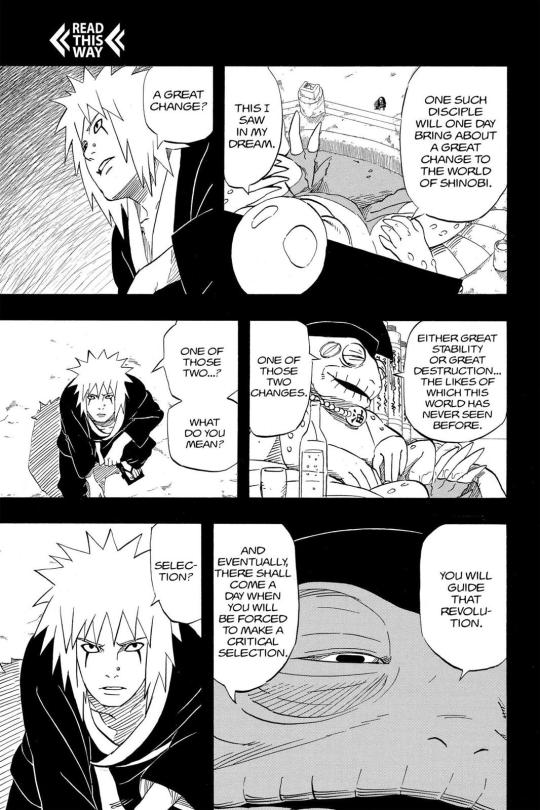


Ch. 376, when Gamabunta first imparted the Prophecy to Jiraiya that would go on to shape the rest of his life.

Ch. 372, Jiraiya first discovered that Nagato possesses the Rinnegan. He reflects on what he was told about the Child of Prophecy.
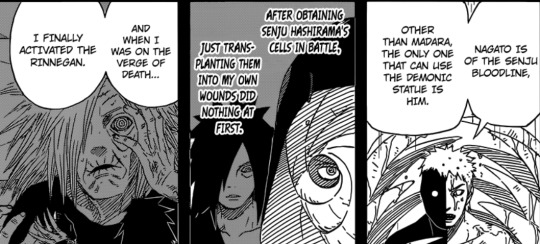
Ch. 606, where Madara's awakening of his Rinnegan is recalled, thereby beginning the Prophecy at all.
As we can see with these panels, the Prophecy is what begun Jiraiya and Madara's unknowing clash, that would lead them both to shape their own and each other's disciples, even if the way Madara acquired his could be more described as pawns, they still followed Madara's philosophies through him or Obito masquerading as him that would go on to shape the entire conflict of Shippuden. But, how did these disciples of theirs clash and intersect?
Chasing Parallels: The clash & intersection of their disciples
I genuinely think one of the most compelling cases for this ship is the fact that their disciples not only define the protagonists and antagonists of the story, but directly correlate with the prophecy was given by Gamabunta to Jiraiya that saw Madara himself as the antagonist. That is, the prophecy of the Child of Prophecy.
Let's take into account the students that Jiraiya had, first of all, who were labeled the child of prophecy:
Nagato
Minato Namikaze
Naruto Uzumaki
Conversely, we also have to factor Madara's own disciples, definitely including those Obito took on in Madara's name:
Nagato
Obito Uchiha
Sasuke Uchiha
Alright, but what are these three in relation to the Children of Prophecy? Where do the parallels and intersecting between Jiraiya and Madara's disciples begin?
Nagato:
What we know from the point above is the fact that discovering the Rinnegan in Nagato was what impelled Jiraiya to take on the Ame Orphans in the first place. Three years that would prove instrumental to the plot, that would shape Nagato's worldview as influenced by Jiraiya himself. But, how did Nagato get those Rinnegan in the first place?
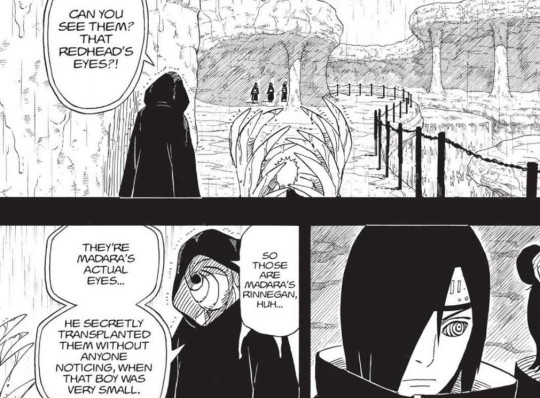
Ch. 606
Those eyes? They're Madara's, implanted at birth intentionally in order to keep them while Madara was waiting to be resurrected, and speculated by Minato.
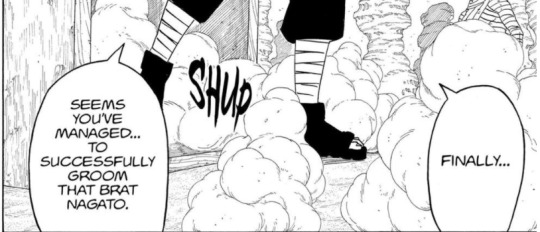
Ch. 559, when Madara makes his first appearance.
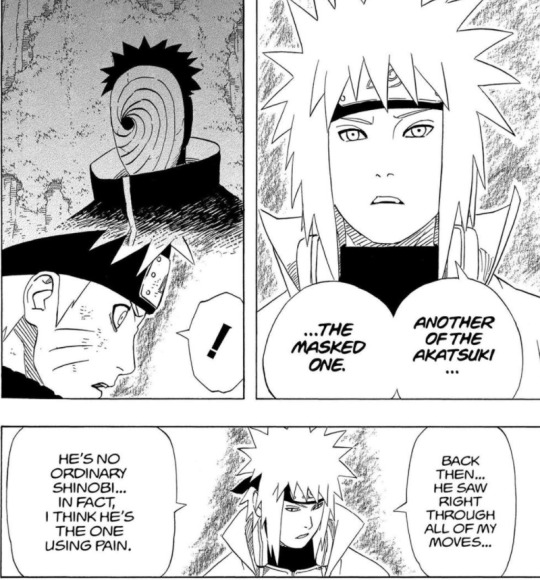
Ch. 440, when Naruto met his father during his fight with Pein.
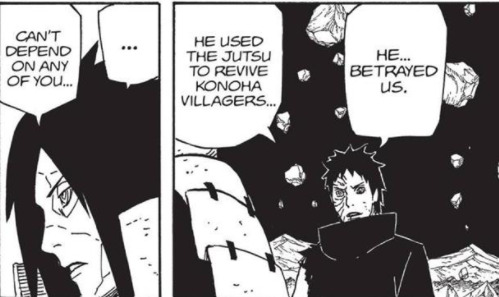
Ch. 601, where Madara and Obito discuss Nagato's betrayal.
What would go on to occur is the fact that, not only did Madara's Rinnegan cement the bond Jiraiya had with the Ame trio, but also shape them - especially Nagato - significantly. That conflict would go on to further the story in ways it wouldn't have if Jiraiya had never taken on the Prophecy and become one of Madara's most enduring yet unknown antagonists. Just as Madara would become the unseen antagonist of Jiraiya's life and his ambition connected to the Prophecy.
Minato:
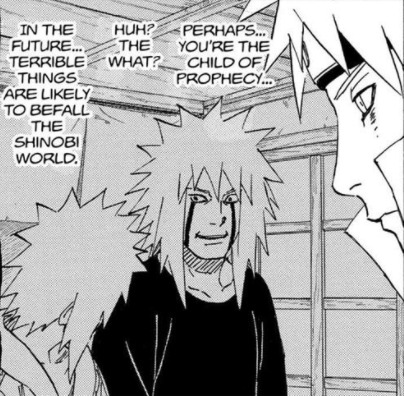
Ch. 503, when Jiraiya speculated that Minato himself might be a Child of Prophecy, too.
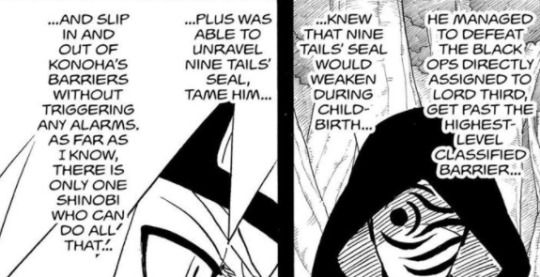
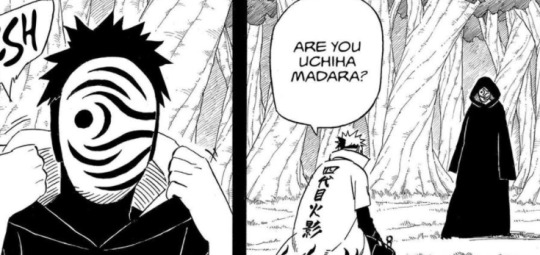
Ch. 502, when Obito - posing as Madara - clashes with his old sensei.
In yet another encounter, Minato - who was Jiraiya's student before the Ame trio - faces off with his former student he believes is Madara, which is fitting as Madara was one of the only known people in existence known for being able to tame bijuu with his Sharingan. Let alone being able to make a summoning contract with the infamous demon fox himself.
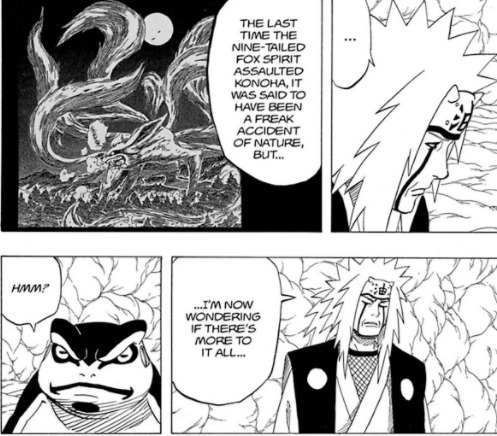
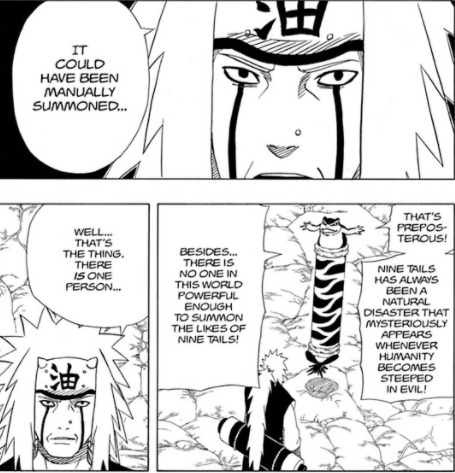

Ch. 371, which is also, coincidentally, the first image of Madara shown outside the statue at the Valley of the End ever seen in the manga.
Jiraiya, too, correctly guesses this hunch that Minato made but clearly couldn't convey to Jiraiya himself on account of being dead. But, like his master, Minato correctly presumes the person he's facing is Madara even if it's not Madara himself. But, well, we all know where that goes with Obito becoming "Madara", and all...
Naruto:
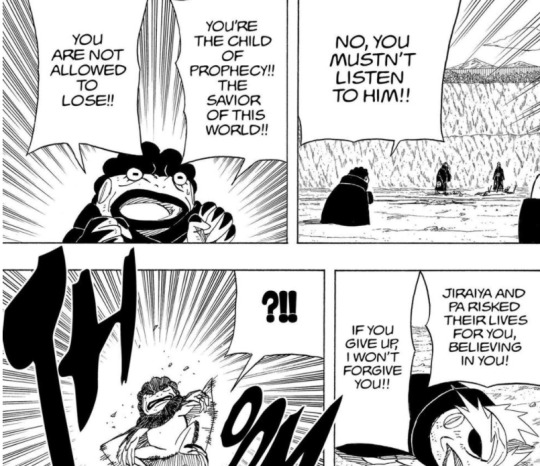
Ch. 437, when Ma calls Naruto the Child of Prophecy for the first time, something likely gleaned from Gamamaru or Jiraiya.
As the main protagonist, it's only natural that Naruto would have the most clashes out of the three, especially compared to Nagato or Minato. But still, they are notable and extremely defining. Remember to keep in mind, Nagato's path as Jiraiya's student, as someone who was shaped by him and later Madara through Obito, his encounter with Naruto is the most significant because of how much Nagato was shaped prior by the Second Shinobi World War that Madara typified in his nihilistic philosophy, then Jiraiya, then again by Madara's views through Obito. This clash - not the battle for Konoha itself - is the closest we truly come to them bridging the gap due to how untouchable Madara is by Naruto's will, which calls for this example.
But, as the main protagonist, Naruto contends with Madara's philosophy more than just once. He does it twice, in fact.
Naruto and Nagato:
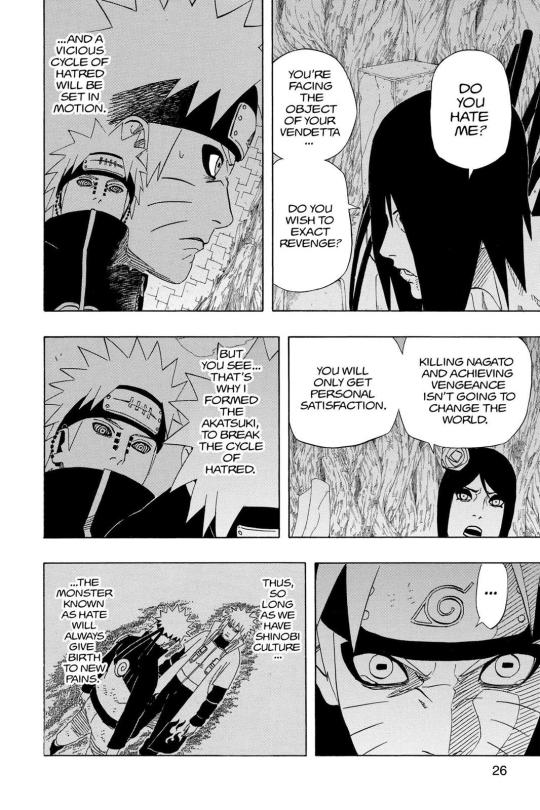

Ch. 444, at the beginning of Naruto's confrontation with Pein where the clash of Jiraiya and Madara's ideals truly shines.
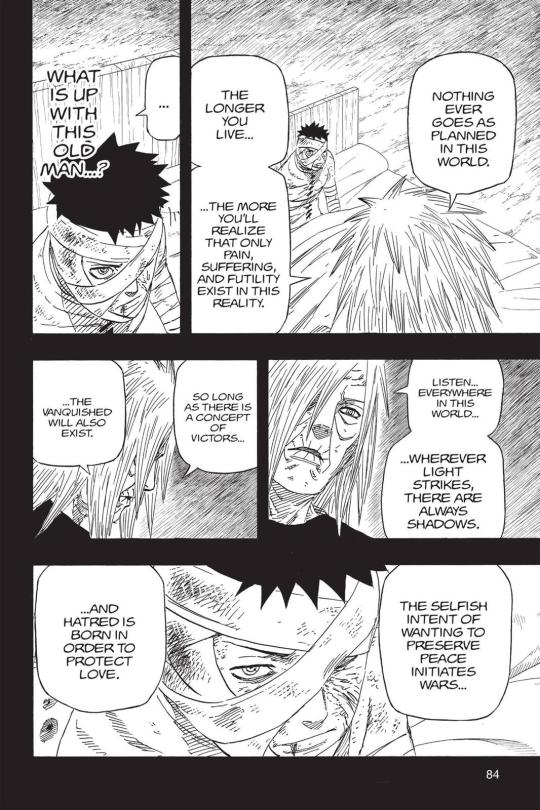
Ch. 602
Remember, the core of Nagato's philosophy is a closer reflection of Madara's than it is even of Yahiko's, even if Yahiko did form part of Nagato's negative worldview before Jiraiya, Madara's completed it the best.
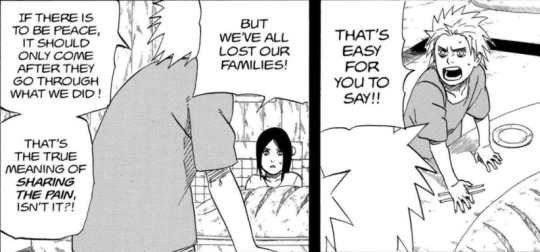
Ch. 372
The panel that defines Yahiko's philosophy, juxtaposed to Madara's, as shown above.
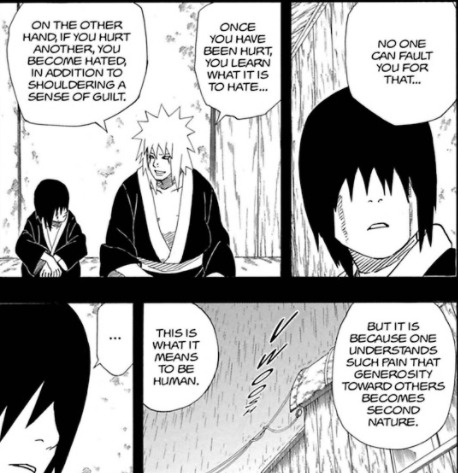
Ch. 372
Continuing on, as seen with what Naruto begins with, it's exactly the same thing that Jiraiya imparted on to Nagato after he felt guilty for killing an Iwa-nin to protect Konan and Nagato.
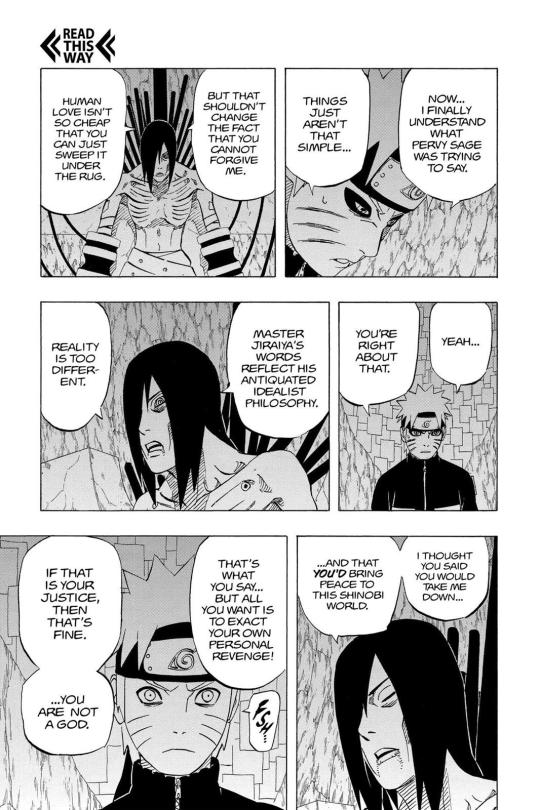
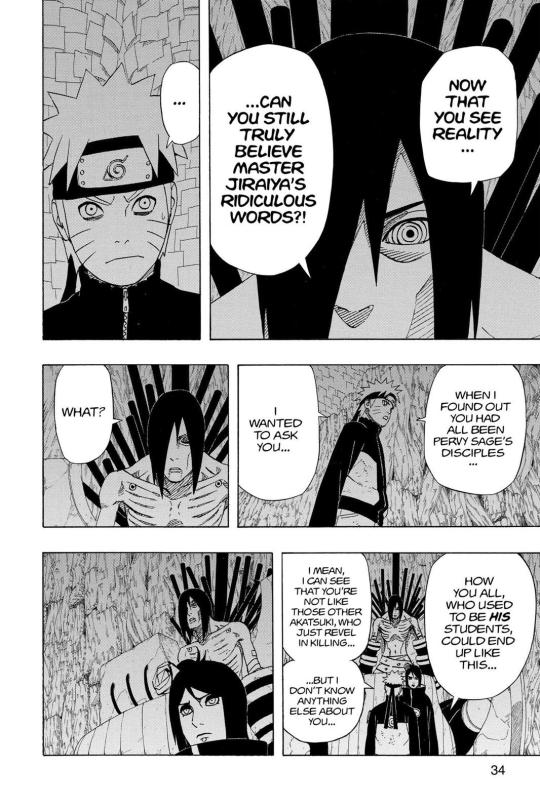
Ch. 444

Ch. 446
Yet, despite all this disparity between them, there were times when both teachers agreed, even if it was at both extremes of this prophetic spectrum.

Ch. 446
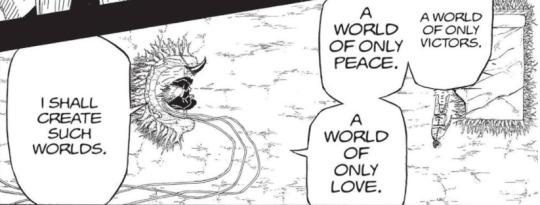
Ch. 602
It's a strange agreement, to be sure, but Jiraiya and Madara wanted the same endgame for the world despite how twisted Madara's methodology would come to be. One that ultimately made both clash, even if it was never directly.
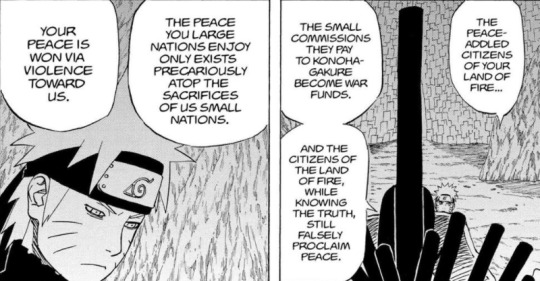
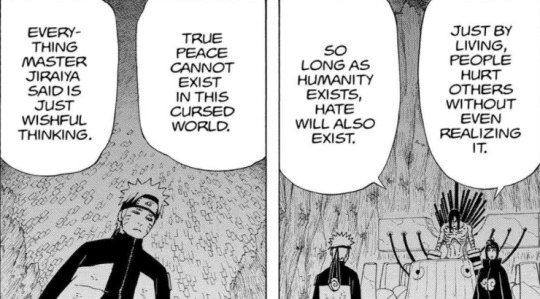

Ch. 447, where Nagato and Naruto come to a proverbial draw in their battle of wills, of their teacher's will versus what Madara would come to impart on Nagato indirectly.
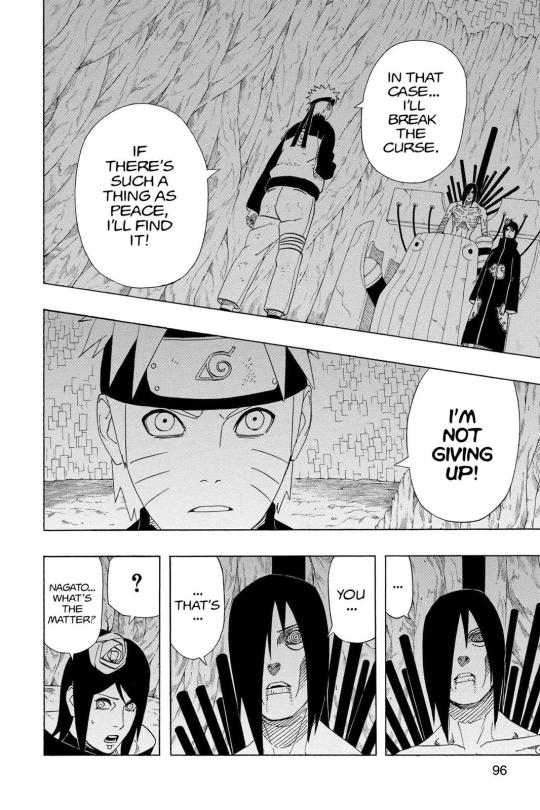
Ch. 448
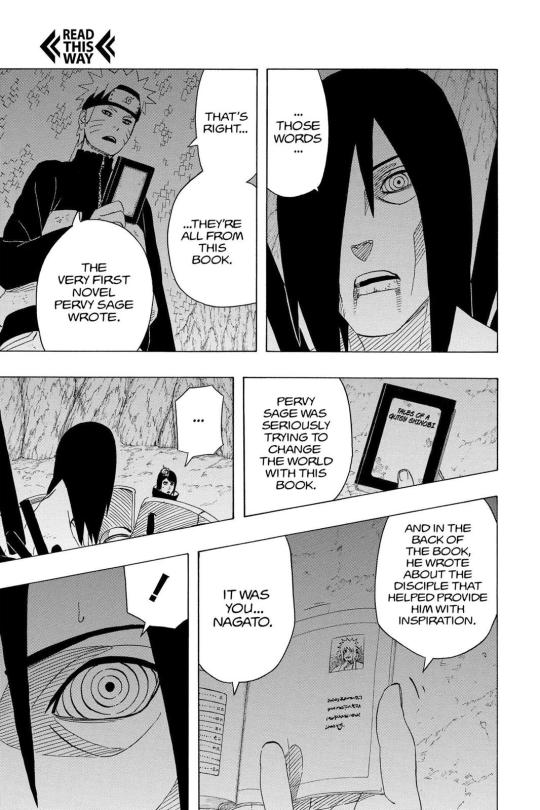
Ch. 448
Here, we come to the penultimate moment where Madara's hold over Nagato is shattered. The dissolution of his nihilism, the clash that would see Jiraiya win.

Ch. 448, the moment when Nagato provided the inspiration for Jiraiya's titular main character in The Tale of the Gutsy Shinobi, a book that was like the prediction of what was to come in much the same way Morgan Robertson's The Wreck of the Titan would predict the Titanic's demise over 14 years earlier (even if Gutsy Shinobi is a lot more hopeful!).
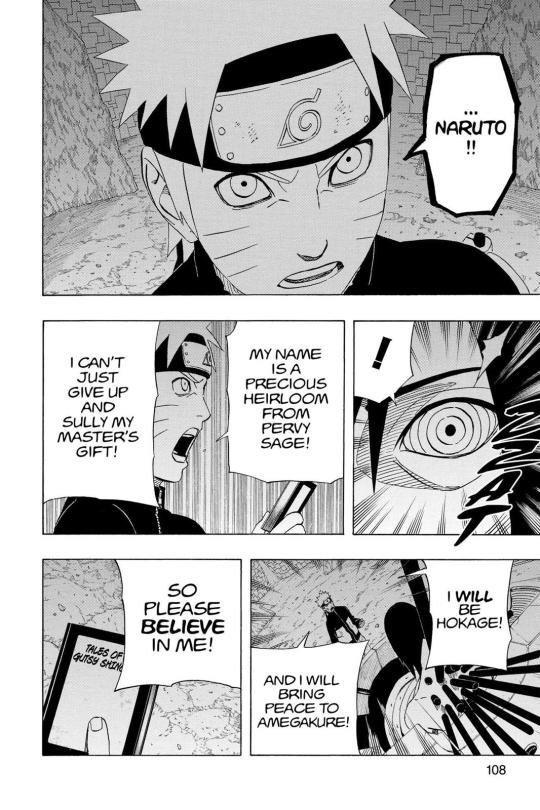
Ch. 448, where the prediction of Jiraiya's first book would come true through Naruto.
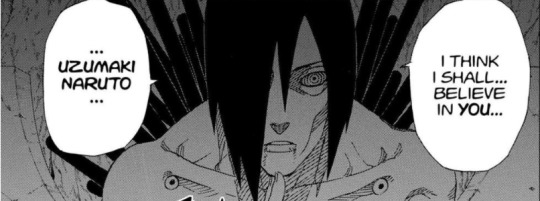
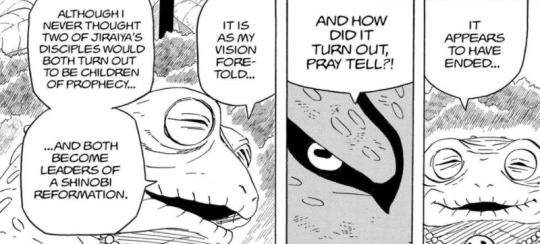
Ch. 448, in what seems to wrap up the prophecy... for now, at least.
Naruto and Obito:
It's during the Fourth Shinobi World War that Naruto and Obito - Minato's student, whom was Jiraiya's before that - finally clash with each other after Obito becomes the 10-Tails' jinchuuriki. Naruto and Obito were alike, once, before Madara broke Obito and conferred upon him his nihilism.

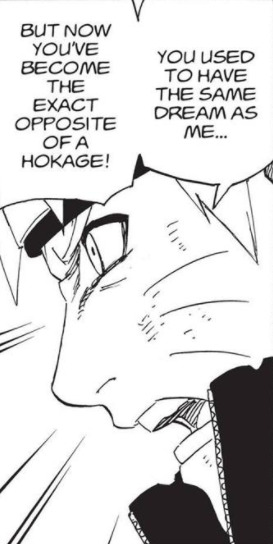
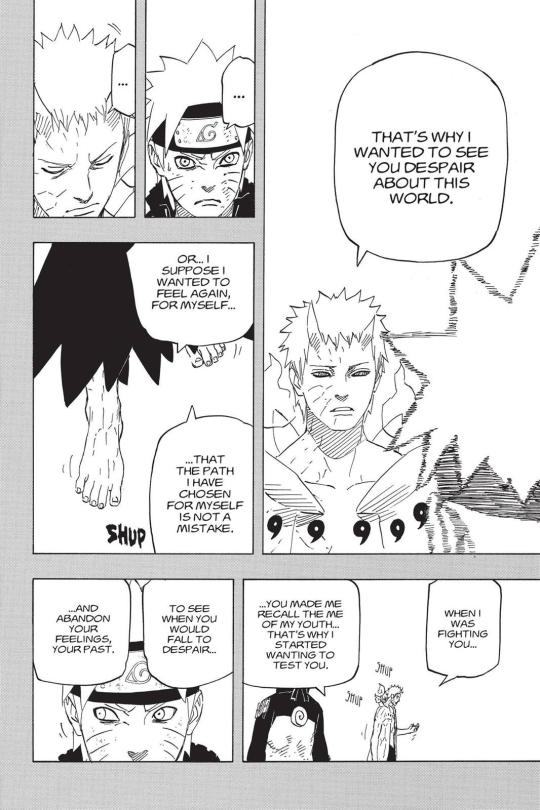
Ch. 653, where Obito outright admits to wanting to test Naruto, to pit Madara's (that he deludes himself into thinking is his own) nihilism against Jiraiya's teaching, that bolstered and matched Naruto's hope for peace in the world. A path that Jiraiya further inspired Naruto to take.


Ch. 653
Like Nagato before him, Naruto bears an uncanny number of similarities to Obito. And like Nagato, he was someone who believed and wanted peace in the world who was indirectly inspired by Minato to seek that peace through the same teachings that Jiraiya conferred.
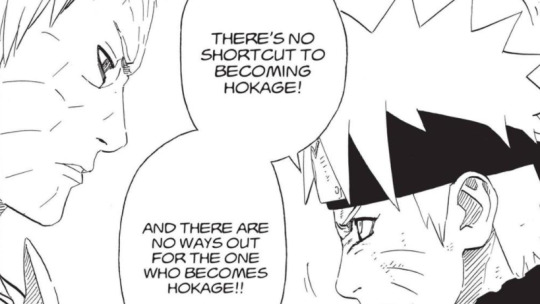
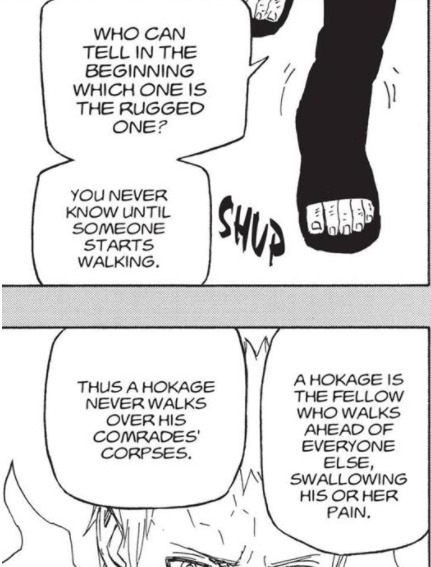
Ch. 653, where Naruto explains what it means to be Hokage the opposes Obito's, a definition that didn't come from out of the blue.
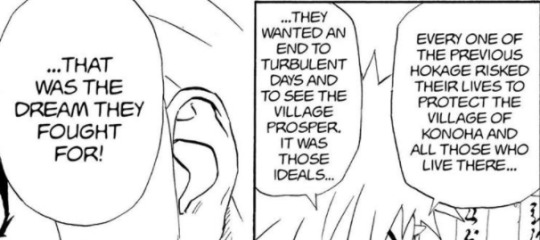
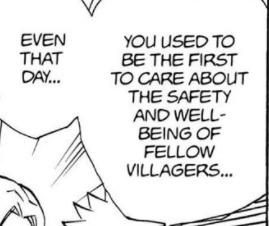
Ch. 159, where Jiraiya defines what it means to be Hokage that matches Naruto's, that transfigured Naruto's initial dream of wanting to become Hokage for the sake of acknowledgment to what it really is: a shinobi who walks before his comrades and protects them.
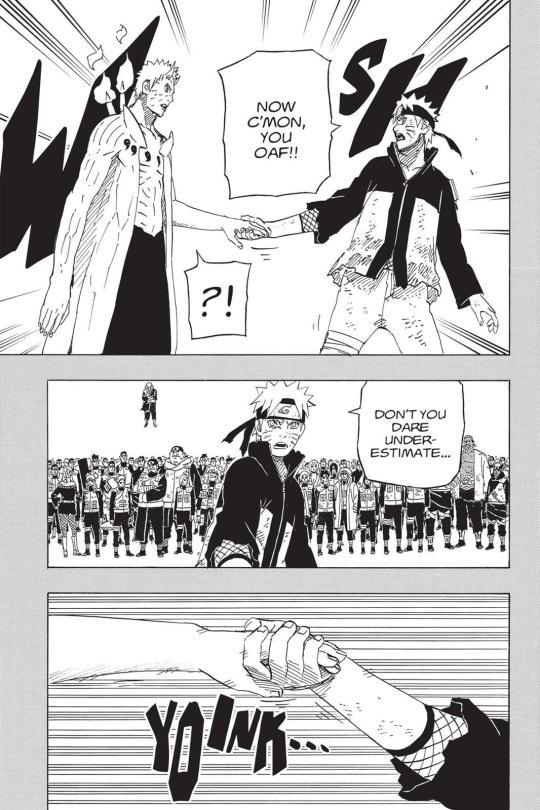
Ch. 653
And like Nagato before him, it was through Jiraiya's teachings that Naruto was able to pull Obito from Madara's darkness and fulfill yet another leg of the Prophecy. Another battle that Jiraiya spiritually won against Madara, even after his death.
Another Intersection: "Madara" & Sasuke

"As Sasuke was the reincarnation of Indra, his was a person with a destiny that was attached to the seal of Kaguya. From the SAge of Six Paths, he awakened the Rinnegan and the key to the seal…That was the evidence of Sasuke’s heartfelt [effort] and desire in wanting to rescue the world.
While jointly struggling for a long time, outstanding cooperation was shown for the children of prophecy. As expected, it was Naruto and Sasuke, similar to being half [of each other’s] bodies."
- Fourth Databook, Sasuke entry (Scan & Translation)
As written in the 4th databook, Sasuke, too, is considered a child of prophecy and makes this intersection equally relevant. While this isn't quite an example of Jiraiya and Madara's ideals pitted against each other, I think it belongs here.

Ch. 396, when "Madara" first takes Sasuke under his wing after his battle to the death with Itachi.

Ch. 397
And here, Tobi introduces himself as Madara, yet another complicated entanglement that would lead to Sasuke, a child of prophecy, also being indirectly manipulated by Madara.

Ch. 398
Even the cover chapter art for chapter 398 emphasizes the change that "Madara" makes in Sasuke, in influencing like he had Obito before him.
Now, it's rather pointless to summarize what's said, as it essentially boils down to "Madara" telling Sasuke about the truth of his brother, the Uchiha Clan Massacre, and his own backstory. Through chapters 396 to roughly 402, in telling Sasuke the truth - much in the way it had been revealed to Obito himself before him - was he changed. Not forever, but what was made apparent was that Sasuke became aligned with "Madara", his philosophy and aims, even if it wasn't to the same extreme as Obito.
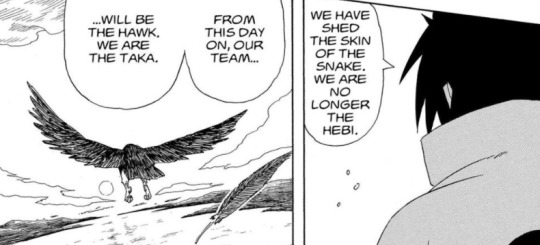

Ch. 402, when Team Hebi becomes Team Taka.

Ch. 626, during the flashback of Hashirama telling of his past with Madara.
And like Madara before him, Sasuke seems to come full circle and inherit the same role Madara had as antagonist, adopting Madara's will.
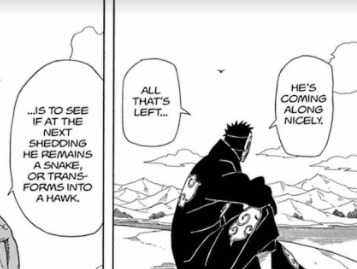
Ch. 371
All according to "Madara's" original plan.
SNS Parallels: Sasuke as Madara, Naruto as Jiraiya
Another major crux of this analysis, aside from the Prophecy and the intersection of their ideals and disciples, is that Sasuke is likened to Madara and Jiraiya to Naruto. In breaking tradition, Sasuke isn't like Orochimaru despite being groomed as a new vessel and Naruto to Hashirama, despite Orochimaru being Jiraiya's narrative parallel and Hashirama Asura's former transmigrant before Naruto.
Sasuke was never meant to be like Orochimaru
Something made abundantly clear was the fact that Sasuke was never meant to be the next Orochimaru. Sasuke himself drives this point brutally home.
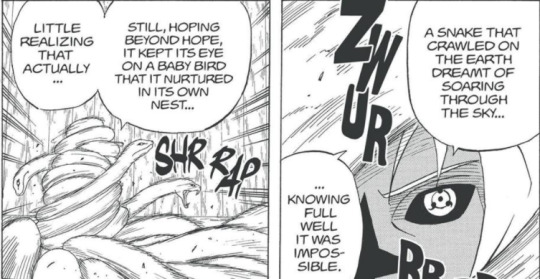

Ch. 344, when Sasuke breaks free of Orochimaru's control.
As we see here, Sasuke himself completely rejects the notion of being the next Orochimaru, both literally and figuratively, comparing himself to a fully-fledged hawk that the snake - Orochimaru - couldn't control. Before this, he tears apart Orochimaru's character, degrading them (though, I doubt that needs to be put here).
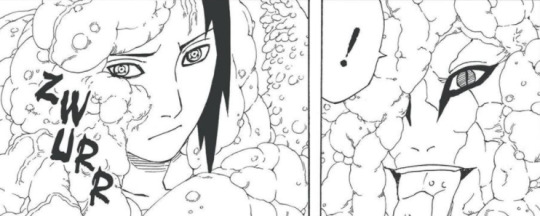
Ch. 345
And as the chapter proves, the only way Sasuke could ever be like Orochimaru is through becoming their next host, which doesn't happen.
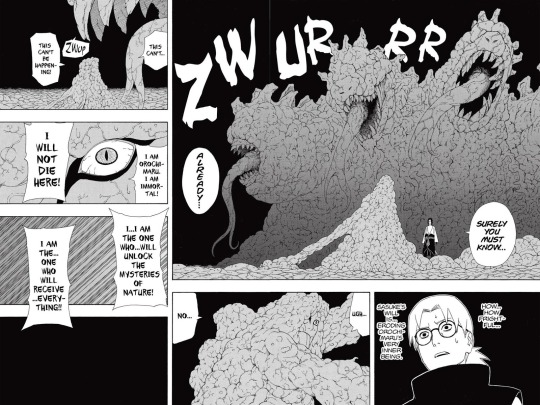
Ch. 346, where Sasuke is the one who is the victor and absorbs Orochimaru, overpowering them.
Simply put, where the generational parallels go, the very narrative refutes the notion that Sasuke is like Orochimaru, at all. Aside from being the level-headed geniuses of their generation, they're nothing alike and cease to ever be such a consideration. (Not that I think it's a bad thing. The fact that Orochimaru exists outside of the generational parallelism Kishimoto locked many of the characters in enhances the poignancy of their character, not diminished it, especially as such a fascinating antagonist acting of their own accord - not destiny or fate - in Part 1.)
In fact, this goes beyond just Sasuke absorbing and destroying Orochimaru. There's another noteworthy comparison to be made. Now, as I'll state below, Team 7 was meant to be the Neo-Sannin the next generation. However, the text again blows a hole in that assertion.
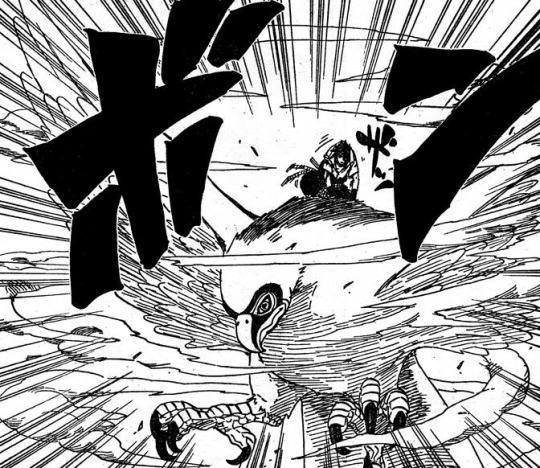
Ch. 477, when Garuda first makes his debut as Sasuke's secondary summon.
As we all know, Sasuke is the only known character in the whole of Naruto with not only one, but two summons. Now, in a previous meta I've written, something that is vital to understand that is that the Sannin's summons are extremely important motifs for their characters. Not only does it tie them in to their folkloric counterparts inspired by the Tale of the Gallant Jiraiya, but it also defines many of their techniques and aesthetics (such as Jiraiya being a Toad Sage or Orochimaru's serpentine affinities and ninjutsu). However, as inheritors of their motif, Team 7 also inherited their summoning contracts with their respective sage regions, especially with specific summons (Aoda the snake for Sasuke, and Gamakichi the toad for Naruto). Again, though, a wrench is completely tossed in this motif with the introduction of Sasuke's second summon, the hawk known as Garuda.
What's important about Garuda's inclusion and the fact that it makes Sasuke the only known person with two unique summoning contracts in the Naruto universe is the fact that Garuda's appearance correlates with this period in Sasuke's development where he moves away from being in Orochimaru's shadow to spreading his wing and becoming a hawk, closer and closer to being the next Madara, the true person he was meant to excel past.
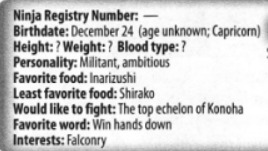
Madara's entry, Third Databook.
Another noteworthy fact, too, is that Madara is connected to hawks through his hobby of falcontry. While it might not seem like much, with his own brother's connection to crows, it establishes a link between Sasuke and Madara that fleshes out a connection to hawks. The same hawk motif Sasuke would become better associated with, as much as Madara is, too, in many fanworks.
Sasuke as the next Madara
However, there is one character that Sasuke is compared and considered the next iteration of, and that's Madara himself.

Ch. 309, Kurama and Sasuke meet for the first time.
As it likely doesn't need to be said, as Kurama had once been Madara's unwilling thrall, even before the plot with Asura and Indra transmigrants, Sasuke was likened to Madara. But, it's not the only time this comparison is made.
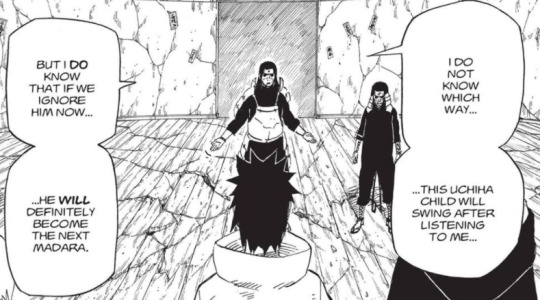
Ch. 620, where Hashirama - Madara's childhood best friend - outright calls Sasuke out as possibly being the next Madara.
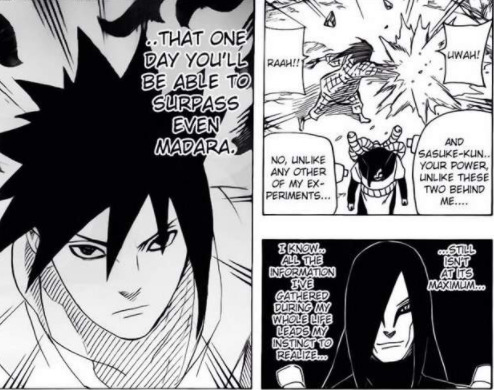
While I don't quite know the chapter, Orochimaru - the one who didn't turn out to be Sasuke's parallel - outright compares Sasuke to Madara.
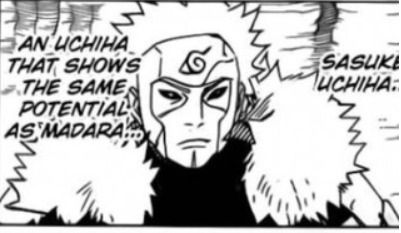
Another unknown, but here, Tobirama - another lifelong enemy of Madara - further emphasizes Sasuke as being like Madara.
With Sasuke not being like Orochimaru, and admitted to being like Madara by the Sannin themselves, the verdict is clear: Sasuke is identically similar to Madara - as confirmed by his contemporaries and enemies alike. Hell, even Hashirama likens him to his younger brother, Izuna.
The verdict? Sasuke is like Madara, hands down.


Ch. 657, when Madara notes Sasuke's straight tomoe pattern in his EMS.
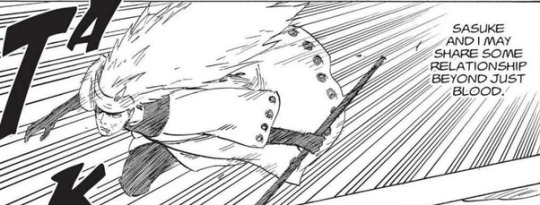
Unknown chapter, but Madara again notes the bond between him and Sasuke goes beyond blood.
Naruto being like Jiraiya

Ch. 245, during Naruto and Sakura's reunion, which means Tsunade and Jiraiya's as well after 2.5-3 years.
As I've affirmed above pretty exhaustively, Naruto's philosophy and ideals mirror Jiraiya's almost exactly. To the point that Tsunade, Jiraiya's long-time friend and fellow cellmate, sees Naruto as being almost exactly like him.
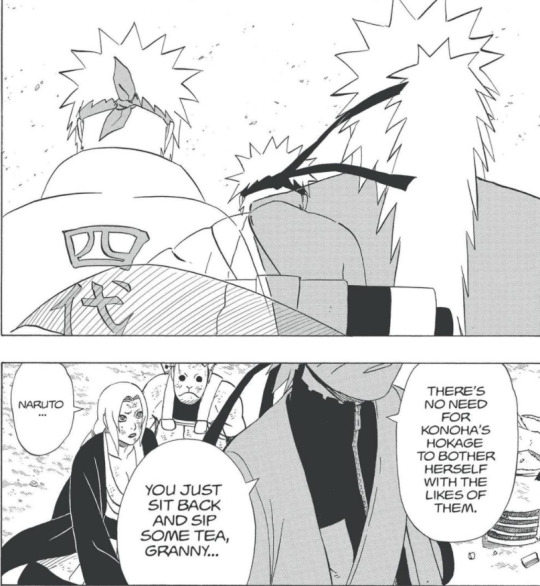
Ch. 430, during Naruto's return to face off against Pein
As we can see with Naruto's arrival to the battlefield of Pein's invasion, one of the first things on Tsunade's mind is how Naruto seems to manifest the very will and dreams of his predecessors by protecting Konoha - seeing the backs of Minato, Jiraiya's student, and Jiraiya's, too.

Again, an unknown chapter.
Now, don't get me wrong, I'm willing to concede that, yes, Naruto has been likened to Hashirama before. While official material like this exemplifies it, I think it's important to keep in mind that Naruto being likened to the Sannin as Neo-Sannin has been around longer than the transmigrant plotbunny ever has. Let alone comparisons between Naruto to Hashirama outside of the predestined reincarnation cycle.
Essentially, given the extensive parallels between Naruto, Jiraiya, and his students, it's clear that Naruto has more parallels and ideological similarities with Jiraiya than he does with Hashirama, despite being on the same reincarnation cycle as the Senju.
More than just that, event the significant goals he failed with best parallel between Jiraiya and Naruto than Hashirama and Naruto.
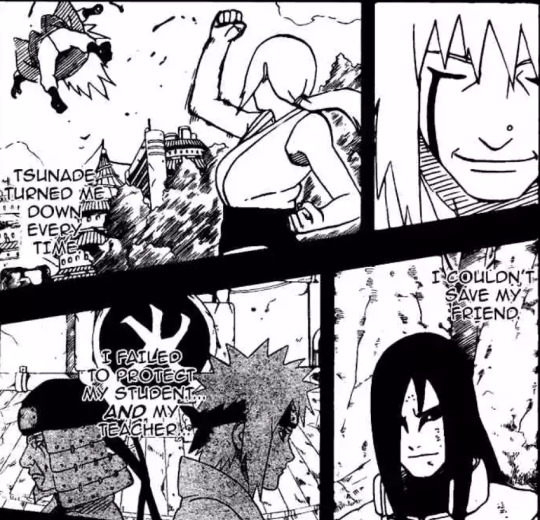
Ch. 382, when Jiraiya reflects on all the major failures in his life.
Now, with this list of failures in mind, how do they parallel Naruto so precisely?
"Tsunade turned me down every time." = Sakura, similarly, turned Naruto down despite there being a false positive. Seeing as she's Tsunade's parallel, this is damning.
"I couldn't save my friend." = Naruto, too, wasn't enough to keep Sasuke from defecting for Orochimaru.
I failed to protect my student... and my teacher." = While Naruto didn't have any students by this time, he did lose Kakashi, initially, during Pein's assault.
With this in mind, it's impossible to think that Hashirama parallels Naruto more than Jiraiya, his counterpart as a Neo-Sannin and someone whose life circumstances were uncannily similar.
But, come what may...
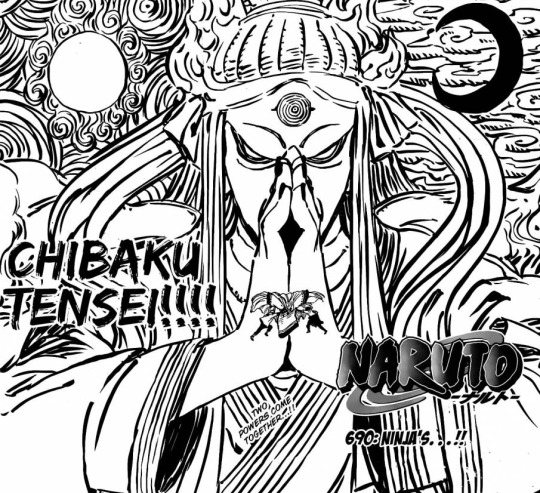
Ch. 690
...Naruto and Sasuke are the ones who fulfill the Prophecy, together, following in the footsteps of those who came before them. Two men who either realized, or came to terms with their failure in trying to bring world peace.
Headcanon: Rinnegan evolving from the Sharingan
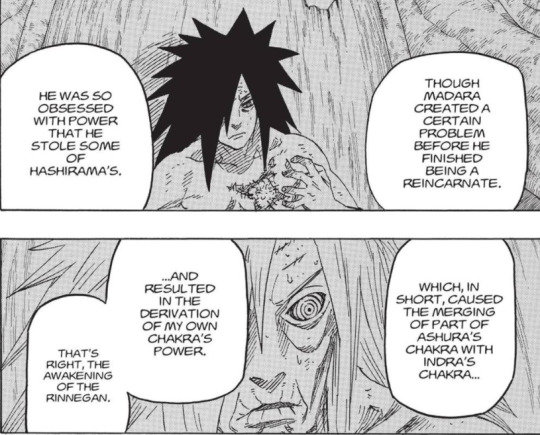
Ch. 671, when the Rinnegan are awakened
So, if one considers that the Rinnegan are an evolved form of Sharingan, that could mean that they could retain some characteristics. While I can't prove anything, this is a headcanon I've had of Madara's Rinnegan for quite some time.

Unknown chapter that divulges how Sasuke could see Itachi's memories after he was transplanted with his brother's eyes.
Now, with all this in mind, in regards to Jiramada since Nagato had Madara's eyes for ~29-30 years (from the time he awoke them (likely 6-9 y/o) to his death), what if the Rinnegan could retain memories like the Sharingan can? And since Nagato's Rinnegan were invoked for well over 3 decades, couldn't it mean that they could record memories like the Sharingan? And if Madara could access those memories of Nagato's once he got his own eyes back and both Jiraiya and Madara managed to survive the war? (Who doesn't love a good Everyone Lives AU?) Well... I imagine it might be angsty, to say the least.
Ways I ship the Thing
To put it expressly, while I've petered my way through the canon connection and intricacies of Madara and Jiraiya's dynamic, in what ways would I ship them?
Everyone Lives AU: Seeing a lot of characters died that people didn't want to die in Naruto, Jiraiya and Madara meeting this way could be compelling.
Madara caused Jiraiya a lot of grief: If there's a compelling angle to any hero/villain ship, it's the fact that Madara was responsible for a lot of Jiraiya's pain and loss through the years. Not only would meeting the other be monumental, but Jiraiya discovering how deep Madara's villainy in his life went - especially with his loved ones and disciples - could be a perfect frame for a post-war meeting & AU.
"Madara" is really Madara: An AU where Madara was really Tobi the entire time could also yield some poignant villain/hero dynamics and struggles.
Purelands: Seeing as Madara and Jiraiya both die in canon, them working through their enmity and differences in an afterlife could also be the subject of fanfic.
Gen Swap: AU's where Jiraiya was alive in WSE/Founders' Era or Madara born in the Sannin's era is also a possibility. With four canon brothers, the Madara of such an AU in the latter scenario could've easily been someone like Izuna.
Redemption: Again, Madara was opposed to Jiraiya throughout the Prophecy. Post-war Madara having to be put under a survived!Jiraiya's jurisdiction could be sweet and complex as hell.
Honestly, regardless as to how this is approached, this entire meta is my ship manifesto; the reason why I ship such an unknown but deeply compelling couple. Not only is it a facet of the tried and true hero/villain shipping trope (or, enemies-to-lovers, enemies-friends-lovers), but the depth these two have in each other is any reason to ship them beyond just acknowledging their canon parallelism as masterminds and influencers on the manga's overarching plot, in Part II especially.
(That, and the hair... Hairpair, anyone? Oh, and the fact that Jiraiya is considered Naruto's grandfather while Madara is - typically - jokingly referred to as Sasuke's (or another family figure) and is a common fandom gag, if not taken seriously.)
Basically, this ship is deep as hell and defined a lot of Shippuden's canon despite how little it's acknowledged.
#jiramada#jiraiya#madara uchiha#sasuke uchiha#naruto uzumaki#orochimaru#my meta#republishing this because i made it BETTER
3 notes
·
View notes
Text
Zenin Maki: Family or Strength
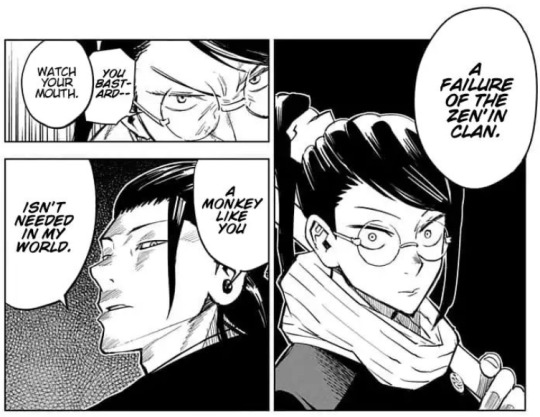
Zenin Maki is one of the most complex characters in the story of Jujutsu Kaisen, she’s also one whose motivations we know a great deal about already due to her being featured in the prequel, and her continued development in the main series. In her character she represents one of the main themes of the series, the conflict between defining yourself individually (by who you are and what standards you set) or by defining yourself by the people around you (conforming or going with the expectations of other people). Maki’s struggles to be an indivudual in a world that has already written her off as a failure is pretty central to the themes of the story. MORE UNDER THE CUT.
Maki is caught in a pretty classic Want/Need conflict. All stories are rooted in a character’s conflict. Maki’s conflict is with herself as much as it is with the Zenin clan.
A want is at its simplest, the Thing Your Characters Wants is the plot goal. [...] Whereas the Want is a direct equivalent of the plot goal, the Thing the Character Needs is a direct correlative of the thematic value. Whatever Truth your story is positing about reality, that is the ultimate Thing the Character Needs. [x].
A want is oftentimes something the character defines for themself. It’s what motivates them to move forward. Whereas, the need is what the story itself says they need in order to grow.
You don’t make a character change by giving them exactly what they want, which is why the want and need are often in conflict with one another. In most cases a character grows over the course of the story to realize their need in the end. The want motivates them, the need is their resolution.
What Maki wants is to be recognized as an individual. She wants to prove her family wrong. Her family has already defined her as a failure. Just like how Getou sees her, because she has no natural talent for jujutsu sorcery her own family has denied that she’s even a person. She’s constantly dehumanized by them. If she’s not useful for Jujutsu Sorcery, then she’s nothing at all. For Maki, being her own person, and living for herself, her own amibtions, is an act of rebellion against her family who want to deny her everything.
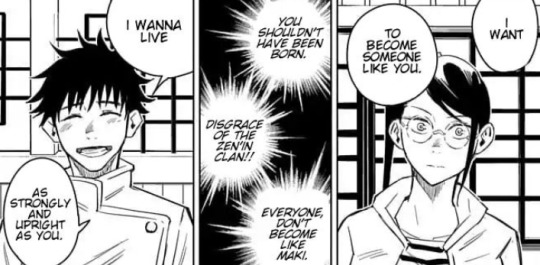
Maki’s want is an almost childish sense of revenge. An “I Told You So”. She wants to prove the people that dismissed her wrong, by proving she’s better than them. She wants to make the Zenin clan bow their heads to her.
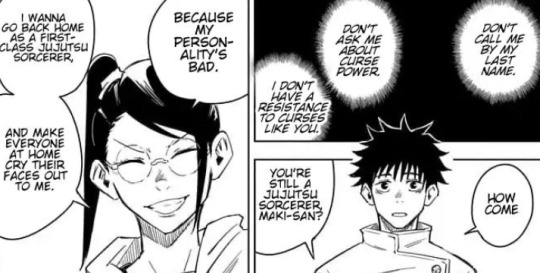
Wants are not bad things. They are what motivates the character to move forward. Maki’s spiteful amibtion, the fact that what she wants is basically no better than revenge, is neither a good nor bad thing in the context of the story. It’s her driving force. Maki is allwoed to be spiteful and angry at the way herfamily treated her. Yuta, who is basically one of the most soft-hearted and understanding characters in the prequel completely approves of her ambitions.

The fact that she’s selfishly motivated. The fact that she wants to do all these things for herself. Her strong sense of individuality are not bad things. They are just the things that make Maki, Maki. In fact rebelling is basically the only way Maki can be an individual. Her urge to destroy her family is not presented to us as a bad thing, but rather something necessary for Maki to truly grow and be herself.
However, once again a want is not the entire answer. You don’t make characters change by giving them what they want.
Moron, this only works if I’m doing it by myself.

Maki wanting to be stronger than anyone in her family. Her focus on individual strength above all else. None of these are bad, however it’s not entirely what she needs either. Look at what she says don’t go feeling like you got accepted.
It’s almost like some part of Maki is afraid of those feelings of acceptance. She feels like family is something she has to throw away in order to be strong.
I do not mean in a sense that Maki will not work with people on her team. She clearly has the ability to form connections with people as friends, get along with others, and even cooperate owith them as a team and care for her comrades. However, she never lets her feelings go any deeper than that. She’s gone so long without unconditional love and acceptance that she feels like she has to destroy her own need for such a thing.
1. Maki vs Mai
Maki has two significant foils in the series who share this same conflict, choosing between your individual development and strength, and also your need to be accepted by the people around you.

Mai is presented to us first as someone who looks down on Maki like the rest of her family. This makes sense because at the time the story was telling it from Maki’s perspective mainly. Maki tends to see her whole family, even her own twin sister, as the other.

However, we’re presented with two different narratives. That of Maki who left the family and began to develop as her own person. That of Mai who stayed behind with the family, and had to continue living inside of an abusive household. The narrative becomes one of not Maki or Mai being the better sibling, but rather two siblings reacting to an abusive household in different ways.

Mai has never once thought her sister was weak. She’s just parroting what the rest of the clan says about Maki in order to get Maki’s attention after Maki left her. Mai has always thought Maki was the stronger one between the two of them, but the thing is Mai doesn’t care about strength at all.

What Mai wanted was a personal connection with her sister. That’s why she mentions not telling her who her first crush is. In order to become her own person Maki has distanced herself from everyone, but that also means as a consequence Maki has shut Mai out.



It’s clear Mai reads Maki’s declaration and decision to leave the family, to leave her behind in an absuive household to also mean that she’s rejecting her sister, the one family member who loves her for her.
Once again neither sister is wrong. Maki wanting to run away from an abusive household when she’s a teenager and can’t really take care of her sister, or maybe even did not have the ability to bring her sister with her is not something that should bee expected fo a cihld. Mai turning against Maki for bieng left behind in an abusive environment, and not knowing a healthy way to reach out to her sister is also what’s to be expected fo a child. It’s not Mai and Maki who started this conflict, it’s the adults that pitted them against each other.
Mai is not trying to put Maki down because she sees herself as superior or anything like that, she literally has always thought Maki was much better than her. It’s a pretty basic cry for attention.

Both sisters want and chose different things. Maki wanted to be herself, Mai wanted a family. Neiter of their desires are wrong or better than the other. Mai is not wrong for wanting a normal life, Maki is not wrong for wanting to be a Jujutsu Sorcerer.

However, because Maki has to draw such a clear line between herself and other people. She can’t accept or understand Mai’s feelings. The conflict between the two of them goes completely unresolved. Because, Maki doesn’t have to leave those connections of unconditional love and acceptance behind to be an individual, she just thinks she does. That is the point where her want clashes with her need.
2. Maki vs Toji
Maki and Fushigoro Toji were both born into the Zenin clan, and both suffer from the same inability to see cursed spirits. While at first the comparison may look like a positive one for Maki, Maki is choosing to stay inside the system and work to prove herself better than what her family told her she was then going completely rogue and living as a mercenary for money like Toji did.
However, eseentially both of them made the same choice. They chose power, and their own personal ambitions over their family. The first thing we learn about Toji in story is that he left his son behind, and practically forgot about him.


While Maki is not responsible for her twin sister the same way that Toji is responsible for his son, they still both believe they have to throw away those kind of family connections in order to survive as an individual. They don’t allow themselves to feel that connection.
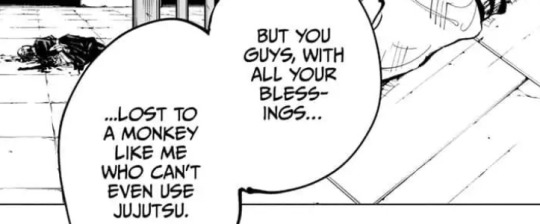
Toji seems to live entirely for himself, and to prove others wrong about him. He has the same want as as Maki, to be stronger that the Jujutsu Sorcerers who dismissed him. They just chose different paths, Maki works from inside, whereas Megumi this late in his life has gone completely outside of the system.
Toji s a lot more spiteful than Maki towards talented people. Maki’s more self directed and doesn’t blame everybody around her for her circumstances, so much. She’s a lot more focused on herself and her own sense of self improvement. However, both of them have an extreme amount of self awareness and use that to push themselves to develop their bodies to their absolute limit.

Toji is someone who is incredibly aware of his own limits, and rather than that making him unmotivated it causes him to be an extremely strategic thinker, and also push his body beyond even what most Jujutsu sorcerers are capable of. He makes excuses for his own violent behavior because he’s nothing but a reject and a monkey, but he doesn’t let other people’s talents be an excuse for him to be weak. When he sees Gojou fighting him at full power, he doesn’t hesitate or run away, he literally approaches the situation with an extreme amount of determination that believing he can overcome it.
As a person he’s practically a disaster, always eating fast food, gambling, leaving his son behind, and acting immature and irresponsible with his business partner. Whereas Maki is much more cold and composed. However, this behavior stems from the fact that Toji, like Maki, has focused his entire life around fighting and therefore everywhere else he’s underdeveloped as a person. He’s the extreme result of Maki’s belief that if she’s stronger than her family, that will somehow fix what is missing inside of her.

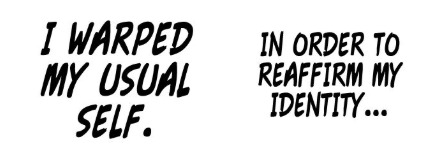
Toji even says he believed the only way to go against his family and continue being himself, was to twist his personality like this. That he had no choice but to become this way in order to deny what his family said about him.
However, what Toji regrets as he’s dying is not that he wasn’t strong enough. He doesn’t even regret becoming a crimminal, or rebelling against the Jujutsu world. What he regrets is that he threw away his family in the process.


What he wanted was to be strong. What he needed was a family. Maki and Toji are not exactly the same, but Toji is a cautionary tale that shows us that Maki’s choice to reject understanding and acceptance is unhealthy behavior. It’s what she wants and not what she needs. And these things are not mutually exclusive, Maki can both pursue her own individual strength and at the same time accept others around her. The manga has always advocated finding a balance, and a reconciliation between the two, rather than one as being more important than the other. Just like her conflict with her sister, beating her sister in a fight proves nothing. What Maki needs is reconciliation, the ability to understand her sister’s feelings and also have her sister be able to understand her own.
She needs those connections to be an individual. We are defined by ourselves, we are defined by the people around us. It’s not either or, it’s both at the same time. Maki’s choice isn’t even a choice she necessarily needs to make, she’s allowed to choose both.
#jjk meta#zenin maki#maki zenin#toji fushigoro#fushigoro toji#zenin mai#jujutsu kaisen#jujutsu kaisen theory#jujutsu kaisen meta#meta
209 notes
·
View notes
Text
“This is ridiculous,” Mike sighs in exasperation, “my friends and I had nothing to do with any of this.”
The detective at the other end of the table doesn’t seem to accept this. She’s a recent transplant from another state. Most of the Derry police department leaves Mike be, summing up his interest in police matters as a side effect of his fascination with Derry history. She doesn’t seem to be interested in giving that same assumption.
“You keep saying that,” she pushes, “but I think it’s strange that you show up to all the crime scenes and that two of your friends harassed one of the victims. Not to mention that Henry Bowers was found dead under your place of residency.”
Mike is growing more and more frustrated. It was surreal when the police showed up at dinner last night. The Losers Club plus the small group of cops nearly overwhelmed the small Italian place they’d been enjoying.
Bev, Ben, and Eddie are sitting in the lobby while Richie and Bill are in cuffs. Mike is somewhere between the two options or so he figures. He’s not sure he likes those odds.
Detective Lopez fixes him with a look that lacks any hint of retreat or gentility. She’s a no nonsense kind of woman. Her curly, dark hair is cropped in a pixie cut and her face is bare and set in a deadpan expression. Her blouse is a gray button up and the lanyard of her badge is tucked under her collar.
“It’s a small town,” Mike responds, “coincidences are everywhere.”
“Nothing is ever just a coincidence. Did you know Mr. Bowers?”
Mike calmly explains how Henry Bowers was the resident bully when they were children. How often that bullying went past simple pranks and low grade violence. To stop at calling Henry a bully was like trying to call Ted Bundy just an unfortunate date.
“You can ask Ben about his scar, that should give you a clue.”
“I understand that Mr Bowers had a history of violence and mental illness-“
“Being an angry white boy is not a mental illness,” Mike points out.
“Agreed,” Detective Lopez says flatly, “but that isn’t my point. My point is that several children and a man named Adrian Melon are dead and the escape of Mr. Bowers does not correlate with those deaths.”
“It doesn’t correlate with the arrival of my friends either. They weren’t here.”
“But you were.”
Mike is taken aback by the remark. All this time he’s been keeping watch, dreading the day that Derry needed saving but looking to save it nonetheless. Not that this town ever gifted him much beyond tolerance. He has no adult friends here, no significant others, only a series of routine faces that note his presence. Derry, Maine isn’t friendly or good. It’s not even scenic but he wanted to save it anyway. His jaw tightens.
“Of course I was here. I live in Derry. I’ve lived here most of my life, where else would I be?”
“You didn’t know these kids. You didn’t know Adrian Melon. Why did you visit the crime scenes? What business did you have being there?”
Detective Lopez is standing over him now with her hands planted on the table. She does this all calmly with very direct body movements. She never lets her frustration get to her. She harnesses it into orderly conduct and in a way it’s terrifying.
But she’s an outsider without all the facts. You can tell she comes from a big city by her demeanor and her thought process. Often a crime is committed by someone close to the victim or someone that makes themselves close. Contrary to the movies, the person most likely to kill you is the one in plain sight and right next to you. Monsters that hide in the dark and stalk you like prey aren’t the norm.
Mike is glad that he and his friends got rid of that norm for Derry.
“Detective Lopez? Have you ever seen someone die-“
“Of course I have. I’m a homicide detective.”
“I wasn’t finished,” Mike insists, “I was asking if you’ve ever seen someone die when you were a child?”
This gives her pause. Her elbows soften the smallest amount and her hesitancy is plain to Mike. She doesn’t sit. There’s no way she’s backing down that quickly but it’s clear she’s listening.
“I can’t say I have, why?”
“If you take the time to look into me a bit more you’ll know that my parents died in a fire and I was in the other room. I was too little to help them. I couldn’t save them.”
Now Detective Lopez sits down. Her posture is unnaturally straight and her gaze is still unwavering. This is either the best she can do to convey being receptive or it’s the most she’s willing to give.
“Can you imagine the sort of impact that has? I couldn’t even put down a sheep on the farm I grew up on. The idea of causing harm to anyone or anything, indirect or necessary or otherwise, still makes me sick. So please, Detective Lopez, don’t insult me with what you’re trying to infer.”
“Be blunt then. What were you doing?”
“Trying to see if there was a way to stop it. If you look at our history, you’ll see there’s a pattern. Every 27 years since the town was formed, a stretch of terrible things happen. That’s longer than I’ve been alive. Longer than my family’s been in Derry.
I thought maybe if I could pay attention for the next phase I could find the connection. I could save them.”
Mike can see that she’s regarding him as an absolute looney but Mike hopes it’s the harmless kind. She can picture him tinfoil hat and all if it means she doesn’t see him as a murderer.
“And what did you find?”
Mike decides that this is as good a time as any to tell one last lie. It’s not like she’d understand the truth of the matter. She’s the type to only accept hard facts and indisputable evidence. There isn’t anything he can show her to back the truth. Nothing but a lot of rubble on Neibolt street.
“I found nothing. Whatever makes this town the way it is, it’s not for me to understand.”
It’s not entirely a lie. Pennywise was just a part of what made Derry the way it is. Its death isn’t going to cure Derry of its bigotry overnight. There will still be small minded people, violent people. Mike will never understand that.
“So you’re giving up? Just like that?”
“I almost died because a literal living relic of my past broke out of an insane asylum and tried to kill me. I think that’s a sufficient wake up call that I’ve wasted too much time on this town and my own baggage.”
Mike can’t tell if she’s buying it or not. Detective Lopez gives away nothing. She’s an absolute professional to the core. Mike respects that. Derry could use someone on the force who can’t be swayed.
“I may need you to call you back in to corroborate a few stories so don’t skip town,” she gives him a curt nod, “You’re free to go.”
Detective Lopez opens the door to Mike’s freedom. Mike has a feeling that the others have been given similar instructions or that they will be given them. He wonders briefly if they should have thought ahead to confirm a set story with each other but he thinks better of it. None of the Losers are crazy enough to tell the truth.
“Hanlon, wait,” the detective stops him as soon as he’s out of the door frame, “tell your comedian friend that making jokes isn’t going to work with me. It’s not endearing and he’s digging a much bigger hole for himself.”
“Ma’am, with all due respect, trying to get him to stop is a joke in and of itself.”
—-
“Her first name is Jennifer!” Richie shouts as if wounded, “Last name Lopez! What did you want me to do?”
Richie can tell that his lawyer is not amused. His voice sounds really far away and it is. He’s driving to Derry as fast as he can.
“Richie, this isn’t your usual legal trouble. This isn’t stolen material or a damaged room-“
“That was one time and I was still a baby! How was I supposed to know what ecstasy looks like? You’re about to see the podunk town I grew up in, man.”
“They’re talking homicide!”
“I still cry over Bambi, for fuck’s sake. Do you seriously think I’d kill anyone for fun?”
“Of course not.”
Roger Clemming has been Richie’s lawyer since the start of his career. He’s a cousin of his manager and normally Roger has no qualms about representing Richie. Most of his legal cases aren’t even his; the man doesn’t write his own stand up so he can’t exactly be held responsible if it’s stolen. Richie Tozier is an easy client.
“I didn’t even mean to kill him. He had Mike and it was clear that old Bowers was totally batshit. I reacted. I don’t know.”
“So we have a witness. That’s good. The more witnesses the better. I just wish you hadn’t pissed off the Detective.”
“Yeah yeah I’m an asshole but I didn’t say anything about the case. And I stayed away from ass jokes!”
“I’m sure that’s what will save you.”
The Derry police station is not a big place. The holding cell is visible to the front lobby and there’s only two private rooms; the sheriff’s office and an interrogation room. Richie can see Eddie, his arms crossed and his face looking like he bit into a lemon.
Stressed out, Eddie spaghetti? You’re not on this end of the station.
“Be honest with me, Roger, am I going to jail or not?” Richie clings to a rare moment of seriousness.
“You defended someone from an escaped convict. If you sit back and don’t make an ass out of yourself we may not even go to court.”
Richie sighs and he wishes he could telepathically share this news with Eddie. He stares down Eddie in the hopes that somehow they do share a psychic link. Eddie remains pissed at some very specific wall instead.
“And, uh, my friend? Bill?”
“I’m not sure a trial can be avoided on that, but as long as there’s no physical evidence then the best they’ve got is circumstantial with no real motive. They’ll be grasping at straws if they charge him. Dead kids do make for angry parents though and sometimes they’ll pull a guy to trial because they’ve got no one else to blame.”
“So 50/50 chance?”
“40/60 of an arrest being made and I can’t begin to estimate the odds on him being found guilty. That all comes down to the kind of town your Derry, Maine.”
“Fuuuuuuuuuuuck!” Richie groans and buries his face into his free hand.
“Watch it, Tozier,” the nearby cop warns him.
Richie apologizes and feigns composure.
“Sorry kid,” Roger’s using his turn signal given the soft ticking in the background, “I’ll do my best but I make no promises.”
Richie mutters a sentiment of gratitude before hanging up. It would still be the better part of a day and a half before his representation gets here. Technically he’s not even sure if Bill wants Roger to represent him but Richie figures it couldn’t hurt to arrange it. After all, do either of them really want to trust whatever a Derry lawyer looks like?
---
Bill settles in for the night. To be honest, he’s slept in far more uncomfortable places than a holding cell. He wasn’t always a big famous writer. He remembers when he had to sleep in his shitty, used Toyota back in the early days. Now he’s got two houses, a celebrity wife, and a second movie deal. None of which he’s particularly sure he wants anymore.
It’s startling how unconcerned Bill is about the charge against him. He’s been taken in on suspicion of murder but Bill knows damn well he didn’t kill that kid and Detective Lopez doesn’t have much of anything on him except that he was seen yelling at the child earlier at the day and had been spotted at the carnival.
Bill didn’t want to seem entirely unhelpful though despite knowing they were never going to catch what killed that boy. He offered an account of what he thought was an animal attack but it was difficult to make out. Richie’s lawyer probably won’t like that he talked without him present but Bill doesn’t really care.
Bill blamed the yelling on a mental breakdown. His hometown memories were complicated and a failing marriage and work pressure wasn’t helping. When he saw a kid about Georgie’s age living in his old house, he lost it. It was easy to sell this because it wasn’t really a lie. Detective Lopez did make a comment to Bill about how childhood trauma seems very convenient in this town but Bill didn’t know how to respond outside of confusion.
“All right, everyone,” a tired cop announces into the lobby, “Y’all should get yourselves to bed. Visiting hours are over.”
The other members of the Loser’s Club are essentially draped across each other in the lobby and half asleep already. Ben is in the middle like some sort of handsome centerpiece. He has an arm over Beverly and Mike is leaning on his free shoulder. Meanwhile, Eddie is sitting on the floor at Ben’s feet looking tense and irritated.
They gather themselves up except for Eddie who continues to sit on the floor.
“Eddie, honey,” Beverly says softy, “it’s time to go.”
“Richie and Bill didn’t do anything wrong. I will leave when they do.”
Bill chuckles a bit at this and looks over to Richie on the other side of the holding cell. The look on his face gives him pause because it’s not what he was expecting. Eddie looks genuinely frightened in here. He’s also watching Eddie as if looking at the last boat on a sinking ship; one that’s just too far out of reach. Bill isn’t sure what to make of that.
“They’ll be okay,” Mike assures the sulking man on the floor, “I know these cops. They’re decent.”
Eddie doesn’t respond.
“Sweetie,” Bev is getting a hint of irritation to her voice, “we can come back in the morning.”
“I refuse to get up. This is a protest.”
Bev sighs and looks to Ben.
“We’re going to have to force him.”
“Force him?” Ben asks back incredulously, “Force him how?”
“Ben, he weighs 90 pounds soaking wet, what do you think?”
“Oh Lord,” Mike immediately understands the implication.
Ben thinks about it for a second and it dawns on him the same exact time it dawns on Eddie. Ben is briefly horrified by the idea.
“You wouldn’t” Eddie challenges him.
Ben looks helplessly at Bev who shrugs as if to say that there’s no other way. Eddie recoils as Ben clearly accepts his orders and approaches Eddie with strong arms ready to lift him. His stance is that of someone attempting to capture a wild animal.
“Don’t touch me! Don’t you fucking touch me!” Eddie screams while rapidly kicking his legs to slide away.
Bill again turns to get Richie’s reaction to all this. He’s pleased to see Richie desperately stifling a chuckle. The cop stationed here for the evening seems to be frozen in disbelief as one grown man is trying to catch another and that other fully grown adult man is essentially crab scuttling his way to safety.
On reflex, Eddie sends a hard kick and gets Ben right in the shin. Ben stops his pursuit to cradle it.
“Eddie! What the hell!?” Bev scolds him.
“Now that’s enough!” the cop finally sees fit to reanimate, “I’ve seen some bull shit in my day but I won’t have a brawl in the station! Sort yourself out or I’ll put you in holding! Got it?”
Eddie gets up from the floor.
“Oh no,” Richie says quietly.
Bill’s confused but looks back to the scene playing out before him. Eddie looks apologetic and humbly confronts Ben.
“Sorry, Ben” he says meekly.
“It’s just my shin,” Ben responds, “It’ll bruise but it’s fine.”
“No, I’m sorry about this.”
Eddie uses his whole body to send a punch right into the side of Ben’s scruffy and very shocked face. Eddie’s fist retreats just as quickly as it had departed and he’s shaking out the pain of contact. Ben cups his cheek, obviously not very wounded. The man’s essentially built like a brick house for fuck’s sake. This does get the cop moving though.
Eddie is escorted into the holding cell with Bill and Richie. Richie looks in awe of Eddie either because he was so reckless or stupid Bill can’t figure which. He does have sneaking suspicion however that Eddie’s little stunt has more to do with Richie than with Bill himself.
Eddie is still pouting and sits square on the floor all over again.
“The little guy will be free to go after he cools down, unless you want to press charges,” the cop asks Ben.
“What? No. No… it’s fine.”
Mike quietly exits as quickly as possible. He’s clearly done with the nonsense that just played out. Bev and Ben stay behind a minute as Bev checks his cheek over again. Bill can make out the soft conversation they’re having but just barely. She’s apologizing for her plan, saying she didn’t think Eddie would fight that much.
“No no, it was a good idea,” Ben assures her.
Bill can see the way that comment washes over her. Ben was always full of a certain sincerity and purity that none of the other Losers ever really had. He’s soft and probably the only one of them that didn’t end up with a ridiculous amount of paranoia or cynicism. Bill doubts that Ben is unscathed but it looks like he at least had the good sense not to unleash his unknown trauma on anyone else.
Unlike Bill and his marriage to Audra.
It’s painfully clear to Bill right now just how much Audra looks like Beverly. They’ve got similar frames, similar facial structures and they’re both redheads. Granted, Audra’s red comes from a salon but it suits her as naturally as it does Bev. They could be sister’s.
‘Why can’t you be how I want you to be?’ Bill remembers saying to Audra not long before he took off to Derry. He’s disgusted with the comment now. He’s disgusted with the fact that he kissed Beverly and it meant more to him than his entire marriage. He’s disgusted with himself.
“See you in the morning, boys,” Bev waves to everyone in holding.
She doesn’t give Bill any special treatment. No lingering eye contact or wistful gaze. It’s as if she never had a crush on him at all, as if they’ve never shared anything. Before it always felt as if she was looking to Bill and now she’s looking at Ben.
Despite a sense of heartbreak, Bill takes comfort in that difference.
---
There’s only two beds in the holding cell. One of which is already taken up by Bill who is sound asleep. Eddie is still sitting on the floor and up against the wall. He watches for the cop to doze off. Sure enough, he’s starting to snore in his chair.
Eddie quietly and carefully scootches over to Richie. Richie’s been lying on other cot, entertaining himself with some sort of impromptu, silent puppet show. He breaks from it as he notices Eddie encroaching on his personal bubble.
“Hey,” Eddie whispers.
“Hi…” Richie answers.
Eddie isn’t sure of how to move forward. Originally he had mapped out exactly what to say after the gang’s celebratory dinner. He was going to apologize for kissing Richie, explain again that he had panicked. He would ask that they move forward from this and go back to normal. He wanted to reassure him that he is very alive and not going to die anytime soon too. He wanted to know how much it meant to him that Richie cared so much. He never knew he was that important to anyone.
Eddie did not plan on embracing his inner chaos and landing himself in a cell for the night. He still isn’t entirely sure what came over him in that moment. The idea of leaving just hit so hard and quickly that he couldn’t do it.
“I went to jail for you,” he glares at Richie.
Well that’s not a good start, Eddie mentally notes.
“I see this. I’ll file it under your list of uncharacteristically brave fuckery.”
“I mean that I want to talk. We need to talk.”
“Oh.”
There’s a pause between them. That pause grows into a prolonged period. That period slinks into awkward silence. Eddie is aware since he brought up the conversation that he should actually start it but his head is empty. All he can think about is how the stab wound in his cheek hurts and how flustered Richie looks.
“Look, man,” Richie gives in, “We don’t have to talk. I get it. You panicked. Case closed. Mystery solved. We both deserve a Scooby snack for that epic conclusion.”
Eddie realizes for the first time that Richie is hiding behind his humor. He feels like an idiot for not noticing sooner but his eyes are a dead give away. Richie is making more eye contact now than usual. It’s like he’s forcing himself to present a put together facade. He’s watching Eddie to make sure he believes it.
Eddie wonders if it might be prudent to look at Richie in a different light. In childhood, he was always just that asshole friend. He liked to pick on him but never past annoyance. You’d think trying to steer clear of Henry Bowers would have made Eddie resistant to a friendship built on teasing. In retrospect, Eddie’s not sure what did open him up to it. By all logical accounts, Richie shouldn’t mean much of anything to Eddie and vice versa.
“Why do you do that?” he decides to approach it directly.
“I’m a comedian, Eds. Cracking a bad joke is as natural to me as breaking wind.”
Eddie could easily feed into this but he doesn’t want to. He physically sits up straighter and takes a calm breath in. It’s tempting to write Richie off as immature and continue down the rabbit hole of humor at Eddie’s expense but he refuses. Richie is keeping a secret of some kind which seems painfully obvious to Eddie now. If he’s ever going to move forward from recent events he’ll need to know what it is.
“What are hiding?” he leans in close.
Richie’s face loses all color. He stammers for a moment and Eddie is secretly pleased with himself. He’s so used to Richie getting at him that it is deeply satisfying for the tables to turn. Eddie tries not to stay in that mentality though. He wants answers not revenge.
“Bill’s the one with the stutter,” Eddie points out, “fess up. You’re hiding something from me and you’re using your crap jokes to do it. I won’t go to sleep until you tell me what’s going on.”
It seems a little overkill but Eddie is feeling the dramatics today. They saved each other’s lives earlier. They should be able to talk. Eddie debates their closeness as he waits for an answer. Sometimes it felt like they were the closest two people in the room and other times they were the furthest. Eddie wants to know why.
“I- uh,” Richie is sweating at the forehead, “I want to say first that- shit no. Okay, growing up I- fuck no that’s going to take forever.”
Eddie continues to glare down his friend. It’s not that he wants to force the truth out of him but rather his concern is growing. Showing Richie his soft side doesn’t come naturally though. So here he is trying to be a good friend but acting like a displeased asshole.
“Okay, here goes,” Richie takes in a breath of confidence, “Dinner.”
“...dinner?”
“Yes.”
“What about… dinner?” Eddie says bewildered before getting accusatory, “I swear to God, Rich, if this is a set up to a mom joke I’ll-“
“Dinner!” Richie says again a bit too loud.
The guard stirs. The two men freeze. A few seconds later a loud snore emerges. Eddie sighs in relief. He’s done just enough to end up in here. He doesn’t want to get in enough trouble to stay.
“You and me. Dinner. Us. Dinner. Together. Y’know, dinner?”
Eddie rolls his eyes and relaxes his shoulders. So it’s not a joke about his mom but a joke nonetheless.
“Oh. I get it. Ha ha, very funny. Like a date,” Eddie comments sarcastically.
“Yes.”
Richie isn’t grinning. He not casually avoiding eye contact either as he does with a usual set up. Instead he’s looking directly at Eddie with everything he’s got. It’s the ‘please believe me’ look from before but in an entirely different context. It’s sincere.
Jesus Christ, I think he fucking means it, Eddie panics.
“Okay,” he finds himself saying even as confused internal screaming fills his insides.
“Shit. Really?” Richie is as shocked as Eddie is.
“Yeah.”
“You’re going on a date.”
“Yes.”
“With me.”
“I guess.”
This is all on the premise that Richie is released in time for a date. He may end up in real jail. Then what would they do? A prison dinner date doesn’t have the most enticing ring to it.
Eddie feels like a part of him has detached from his own brain. Whatever his body is doing is past his control now. The surrealism of this unexpected direction broke him.
“Move over,” Eddie demands quietly.
Richie backs up as far as can, looking absolutely befuddled. Eddie climbs into the small space left on the cot. He’s tired. There’s only two cots and one is taken. It makes direct sense to share at least when you’re not entirely in your own body anyway.
Eddie remembers briefly about how the two of them would often share the hammock as kids. Eddie unceremoniously plopped himself in and fought for space so often that it became customary. He never did it to anyone but Richie though. He was the only one.
Richie braves putting an arm around Eddie and at first Eddie’s spine goes rigid. He’s not ready to think about this, not even sure if acting on it is right yet. He still feels far away from all this even as he Richie’s body heat cradles him.
Something about the way Richie’s hand cups the small of his stomach feels...good. Eddie’s body relaxes and he realizes how fucking exhausted he is. It’s been an exceptionally long 48 hours. A little shut eye and a cuddle isn’t so ludicrous. Even if it is with Richie Trashmouth Tozier.
“Just keep it in your pants,” Eddie yawns before falling asleep.
#it chapter 3 ff#ich3-2#i really wanted to mimick the scene where richie sets eddie's arm in chapter 1#like I love that chaotic energy#billverly#light#reddie#benverley
133 notes
·
View notes
Note
Loved that the last question was about Measure for Measure. Its one of my favourite Shakespeare plays even though it's less popular. Just brought my ticket for Measure for Measure at the RSC Theatre too so it's strange it's seems to be popping up everywhere atm. Did it have a hidden political meaning for the time of it's release at all? I heard most Shakespeare plays did?
Hi @cacticharlotte! I guess you haven’t yet been to see the RSC Measure for Measure (it’s this June, isn’t it?). I hope you have a great time!
It’s been quite a popular play in the last few decades because it does contain a few really complicated roles that make for great star vehicles, and because there’s a lot of creative potential in staging and ending possibilities. But I think the proliferation of Measure for Measure productions lately also has also to do with the fact that it’s been gathering attention as ‘Shakespeare’s #metoo play’. Looking through recent reviews (both newspaper and academic) of recent productions it’s difficult to find one where the reviewer doesn’t mention the #metoo movement (Emma Smith’s newest book does it too). It looks like people feel quite strongly about it as a play that speaks to our times.
As for a hidden political meaning… Well, Shakespeare is never so straightforward that there’s an explicit political meaning to his plays, but there certainly is some correlation between the play and topical issues. Even then his use of topicality is far more subtle than that of many writers of his time (including people like Ben Jonson and Thomas Nashe who got into serious trouble for their overt satires).
The most often noted topicality in Measure for Measure is the resemblance between Duke Vincentio and King James I. The line critics often cite for this is ‘I love the people / But do not like to stage me to their eyes’ (1.1.67-68). This bears some correlation both to Queen Elizabeth’s speech in 1586, when she stated that ‘We princes, I tell you, are set on stages, in the sight and view of the world’, a line James I quoted. It’s a well-known fact that James was not keen on crowds.
Surveillance was also a pretty topical issue. Queen Elizabeth famously had eyes and ears everywhere, a fact that is presented as a symbol of her power in the so-called ‘Rainbow Portrait’ where she’s painted with eyes and ears all over her dress:

So you can see just how effective theyr knew such strategies to be, as well as making it known that spaying is going on. But if possible James I was even more obsessed with surveillance. He not only used surveillance, but actively took part in it like ‘the old fantastical duke of dark corners’ (4.3.147-48) in Measure for Measure. And the parallels will be pretty obvious when I say that he was known to spy on his own law courts in disguise. In fact, there are several stories of the kind, such as his going into London incognito with his wife a few days before the coronation and Royal Procession only to be recognised by the crowd that then thronged around him. On his secret visit to the Royal Exchange in 1604 (maybe after the play was written) he hoped to watch how things went on without being observed and once again, his visit was leaked to the crowds. These incidents might also have suggested the Duke’s dislike of crowds, as well as Angelo’s metaphor about how kings’ subjects ‘Quit their own part and in obsequious fondness / Crowd to his presence, where their untaught love / Must needs appear offence’ (2.4.27-30). It’s not explicitly clear what Shakespeare is saying about surveillance (that’s up to interpretation), but the fact that he makes it pretty central to his narrative in Measure for Measure couldn’t be more obvious. The 1994 TV adaptation makes much of this by using lots of CCTV footage and film cameras to draw attention to the way people watch and are being watched. So there’s another bit of modern significance to add to the first point about why the play is so popular now, because what was nascent then our society has taken to extremes.
Another similarity is in James’ savvy politics of theatricality. There’s been some critical attention on the way James ‘staged’ the pardon of Cobham, Markham and Grey, letting no one, not the victims and not his personal advisors, know about their reprieve until they were literally about the be executed. In fact, he went further and confused them by pretending their execution had been postponed after they’d made their final prayers and even arranging things so that they wouldn’t know the others had been let off the execution until the big unveiling at the end. You can see how the Duke’s way of making matters look as dire as possible before his forgiveness fest at the end contains echoes of James’ approach.
The final similarity is the one that many critics have thought might have occasioned the rather unusual set up of this play: the demolition of brothels in the London suburbs as a precaution against the plague in 1603, which may have been an excuse for getting rid of the unsightly lower orders of society prior to James’ coronation. Again, it’s not immediately clear what Shakespeare is doing with this idea, and the rather extreme measures taken by Angelo’s government to suddenly tighten up a law that hadn’t really been upheld before. But Pompey’s insightful idea that pimping would be legal ‘if the law would allow it’ (2.1.194) and his question to Escalus: ‘does your worship mean to geld and splay all the youth of the city?’ (2.1.197-98) does suggest some sense of a mismatch between the law and propriety and the way it treats natural and necessary human urges.
I do think it is possible to overstress these parallels though, and while there are undeniable cases to be made of the relevance of contemporary political events, it’s always worth bearing in mind that none of the plays are reducible to historical events, as if the references were their hidden or ‘true’ meaning. It’s equally possible that such events serve as an inspiration rather than political commentary for Shakespeare, so that they aren't direct social critiques, but explorations of questions suggested by topical issues of the time.

#The last ask was about Measure for Measure five months ago when cacticharlotte asked this question#*sweats*#so sorry#cacticharlotte#asks#Measure for Measure#Shakespeare#metoo#long post#surveillance#Duke Vincentio#Angelo#Pompey Bum#Escalus#James I#Elizabeth I#Rainbow Portrait
66 notes
·
View notes
Text
I wanted to take some time out of our irregularly scheduled content to talk about something near and dear to my heart: Komaeda’s voice. Specifically, two of his character songs which I have been more eager to dissect than you know.
A couple of points before we begin:
These songs were not written by the same people who designed, scripted or even localised Komaeda, but rather his Japanese VA, Megumi Ogata. It has, however, been sanctioned as canon material, even released under the Danganronpa brand. Therefore, I will treat it with the same consideration that I do explicitly canon material.
The songs are, of course, in Japanese. I do not speak this language, so I’ll be going off the translations available on the DR wiki. If you do speak Japanese and you realise I’ve missed or misinterpreted something due to the language barrier, please let me know. Otherwise, as an English speaker, I’ll do my best with what I have.
My goal here is to reconcile his musical characterisation with his canon characterisation, as well as extrapolate whatever new things we can learn from these songs about our beloved boy. And if you’re reading this crazy long post and thinking, “wow, she’s reading way too into this,” ... yeah. That’s sort of the fun of it. My goal isn’t to challenge anybody, or shame anyone’s headcanons. This is just a weird niche hobby of mine.
Apologies for the lack of a cut. This much text, I felt, might be a little hard on some peoples’ eyes on my theme. It is tagged though.
Okay, onto the good stuff.
Zettai Kibou Birthday is, according to Megumi, a song about how Nagito feels on the “outside”. It contains a literal narrative and a metanarrative which is a word I like to use to sound smart, but in this case, just refers to an overarching interpretation that isn’t necessarily verbatim, but rather is represented, or is provided a structure, or is given meaning by the actual text.
In this case, the literal narrative is this: Nagito meets somebody on campus he was “born to meet”, and they have some sort of steamy rendezvous, and in amongst all the smooshing, there are several references to absolute hope. However, the song isn’t supposed to be a literal recount of events, but rather an expression of Nagito’s feelings; about hope, love, intimacy and connection. This is the metanarrative. The plot, if you will, is simply a presentation of that message.
While the song functions on a conceptual level and not a physical one, it interests me that sex is the medium through which he allegorises hope, intimacy and interpersonal connection. I think it’s also interesting that hope and intimacy are grouped together, as if to find one is to find the other. To quote Nagito himself, “Now that I’m on the verge of death, I’ve finally realised what I wanted all along: somebody’s love.”
Again, the song isn’t literal. It captures a feeling, likening that exhilaration and comfort of making a deep and impossible connection to the feeling of finding Ultimate Hope. And for someone who has been so lonely for so long, it makes sense he would find that hope in another person. Someone who isn’t afraid to be close to him in every possible sense of the word.
Now let me get it out there - I don’t expect a song like this to have explicit depictions of sex or anything. There is a fine line to walk when using the topic in media lest you be branded with a hard “lewd” rating, but there’s still no shortage of ways to use it without being explicit. Take, for instance, Carla Gugino & Oscar Isaac’s cover of Love Is The Drug. (Why the cover and not the original? Because I actually liked Sucker Punch, fight me.)
Late that night I park my car / Stake my place in the singles' bar / Face to face, toe to toe / Heart to heart as we hit the floor Lumber up, limbo down / The locked embrace, the stumble round / I say go, (and I say yes) / Dim the lights, you can guess the rest
The words describe literally what is going on, while still invoking the right mood and the emotions the characters in the song were feeling. It’s very well-balanced lyrically, especially with what Oscar and Carla’s performance brings to it. Contrast, if you will, with:
So lock up, mix up, cut up… key up, sex up, wrap up / I'll let you mess me up and indulge That's it, break up, use up, end up… hook up—because we're connected / The omen of hope after the worst disaster
If you look close, you can definitely see what’s happening in the actual narrative of the song. However, the details are more or less obfuscated under this layer of words that don’t really mean anything on their own. It’s more like a flurry of different sensations rather than one, tangible experience. These feelings he’s having during these experience are, in the next breath, directly correlated with connection, and then hope.
Nagito is a guy who works on the conceptual and the philosophical more than the literal. Even in canon, he’s heavily into symbolism. He likes to carry around Go stones because of what the colours represent to him. So this use of intimacy and word play to describe a significant bond between two people is remarkably fitting. What’s literally happening isn’t half as important as what is going on beneath the surface, and the way it makes him feel.
Like I said, it’s interesting that, of all the ways he could express hope and connection, this is the one he went with. I do believe that this also expresses an underlying attitude towards intimacy; that it’s something he only wishes to share with someone truly special. In many fan circles he is portrayed as a highly sexualised character, even though in the canon media, he is quite chaste, never taking any sexual interest in a situation that isn’t sexual; for instance, any of the many times Mikan falls over herself and winds up in a suggestive pose. (And nor should he, let me stress.)
And I can already foresee the counterargument that Nagito is gay, so of course he won’t enjoy seeing a girl’s underwear; and to that, I have two points. One is that, personally, I disagree. This doesn’t have to matter, but I headcanon him as bi or pan, possibly even demi. Either way, I don’t believe gender plays a major role in who he is attracted to. There’s no canon evidence to say who is “right” here (as right as anyone can be regarding fiction), but I don’t judge. If that’s your interpretation, you do you. The second is that, even towards the characters he is shown to be attracted to (namely, Hajime) his expressions of interest tend to be pure, for lack of a better word. Yes, there’s the joke about stripping naked on the beach, but I’m pretty sure that’s just a joke. He does tend to play a lot, after all.
And let me be clear -- there is nothing wrong with being a sexual person, or expressing one’s desire’s healthily. And certainly, Nagito has that side to him. He absolutely has sexual interest, urges and whatnot. It’s just not a highly key component to his characterisation. The point I want to make is: this song was a really good method to explore his feelings towards intimacy in a natural way, as well as provide more depth and context to attitudes he expressed in canon but couldn’t be explored to their fullest because, you know, it’s a story about murder, not Nagito’s feelings. The way he groups hope, love and sex as this euphoric thing, a singular whirlwind of emotions rather than separate happenings, is telling toward this desire he has for these things, the way he sees them as interconnected, and, with the way the song is so upbeat and uplifting, his hope that he can achieve it.
Nagito is someone who strongly believes in the idea that people are born a certain way, either hopeful or hopeless, talented or untalented. In short, destiny. And in this song, he speaks directly to the person he believes he’s destined for.
In the school campus at midnight, my heart throbs as I continue waiting "I was born for the sake of meeting you" I’II think at the moment
This song puts a tangible goal on this “Absolute Hope”, rather than the vague “overcoming Despair” thing he talks about all the time. Nagito really, truly wants to believe - and seems to believe - that his soulmate is out there, and it isn’t too late to make a deep and meaningful connection with somebody; someone who will be just as eager to reciprocate. Someone he can be unafraid with, captivated with, and with whom, he can experience that Ultimate Hope. It’s even in the title - the moment he meets such a person, is the moment true Hope itself is born. Something far stronger than what already exists in the world.
Zansakura, the companion piece to ZKB, is worlds apart in many ways.
It is, according to Megumi, how Nagito feels on the “inside”, the other side of the proverbial coin to ZKB being how he feels on the “outside”. Likely, this means that part deep within him he doesn’t let others see. This is present in the overall tone alone. While ZKB embodied in it that uplifting way which Nagito talks about Ultimate Hope, Zansakura is much more somber. ZKB echoes the Nagito we see through Hajime’s eyes; while Zansakura is more congruent with those fleeting moments we experience the game from his perspective, wherein he is even more down on himself. As we play through the Final Dead Room with him, we see that the excessive way which he berates himself out loud is nothing compared to the second-guessing and self-debasement that goes through his mind. It truly is a dark and melancholy place, which shows through in the slow, sad melody of Zansakura.
This one takes the imagery to a whole other level, relying primarily on the cultural and symbolic relevancy of cherry blossoms. I’ve written about all this before, so for the sake of those who have been around this blog a while, I’ll try to summarise as best as I can.
In Japan, Cherry Blossoms are symbolic of the ephemeral nature of life -- in other words, the fleetingness and impermanence of it all. In no small degree, the connection between the symbolism of Cherry Blossoms and life and death comes from the influence of Buddhist culture, and is embodied specifically in the concept of mono no aware. This can be translated a number of ways that all pretty much come back to the same idea of existing for only a short period of time. It’s used to describe the awareness of impermanence, the transience of things, and a sadness or wistfulness as their passing; and a deeper sadness about this being the reality of things. I know this seems boring and irrelevant, but please keep especially this last bit in mind, as it’s very important to the meaning behind this song.
The most popular variety of Cherry Blossom in Japan are the Somei Yoshino, which are almost pure white and tinged with pale pink near the stem. Although this song was written after the fact, I have to wonder if this was always intended to be part of the character’s aesthetic, because these colours are reflected in Nagito’s character design - specifically, his hair. Anyway, the Somei Yoshino typically bloom and fall within a week. Winter Sakura or Fuyuzakura begin blooming in autumn and continue sporadically throughout winter alone.
Though Cherry Blossoms are an important, and even iconic image for the country, most people are surprised to learn they don’t last for very long. For Nagito to compare himself to these flowers is to admit that he, too, is here to bloom for a short period of time. It’s also worth noting that Cherry Blossoms are considered their most beautiful, not as they bloom, but rather as they wither and fall. And all of a sudden, I’m reminded of all the times Nagito talks about attaining hope through despair, and how his life has only found meaning as he inches closer to death.
Yeah, I don’t like remembering this detail because it’s profoundly sad, but our marshmallow boy doesn’t exactly have long to live. He was given a year, at most, before starting at Hope’s Peak - and, at the end of the series, is presumably in his early-to-mid 20s. He’s beaten his own life expectancy, but not his illnesses.
The song starts in the most typical Nagito way I can think of:
“We can see again tomorrow", I laughed, short-lived cherry blossoms within my heart
As he always does, he laughs and is cheerful with others, even though deep down, he’s tremendously sad.
The song then takes us through this most beautiful and haunting imagery, of cherry blossoms in bloom after surviving a storm*, preparing to wither and fall; until at last they do, and as the flowers are carried away by the wind and water, a lonely, broken branch is left behind, wanting to bloom again.
(*The actual word used is ‘struggle’, however further down, the survival of a storm is mentioned, along with the flowers (aka hope) which will bloom after. The whole thing is a metaphor for his hope/luck cycle, is what I’m saying.)
He talks about this imagery as someone observing it (The storm of flowers, the sudden wind / I halt and open my eyes); again, with this idea of a metanarrative lurking beneath a literal one. He does, however, break the narrative to address (presumably) that same elusive “you” from Zettai Kibou Birthday:
To live an ordinary life, and die together with you / Oh, if that could come true
This seems so disconnected from the Nagito we know, who seems to have no interest in ‘ordinary’ things, and chases only hope. But as we’ve established, the place he most desires to seek hope is in another person. As he spends more time with Hajime during Island Mode, we know already that he admits to seeing hope in himself, and that he doesn’t necessarily take it as good news. But this line, right here, I feel embodies what this song is about, and what Nagito is all about.
Nagito is a very lonely person, desperate by his own admission for love and understanding. He knows he has little time left, and his prospects are...dim. Everyone he’s ever loved has either died or suffered at the hands of his luck, a force far beyond his control. And those who remain - namely, his classmates - either don’t like or don’t understand him. In ZKB - again, how Nagito feels on the “outside” - he expresses a hopefulness that there’s still someone he can love, who can love him, who he can experience that Absolute Hope with. But Zansakura has far more pessimistic expectations.
By breaking the metaphor to be straightforward and honest for a line, we get Nagito’s most core desire: to live a life with somebody; to love and be loved. Which, yeah, he’s already admitted to. For someone who’s been through so much, that probably seems like the most unattainable thing. Every time he gets comfortable, something invariably rips all that out from under him. And of that, he is painfully aware. Oh, if only that could come true - in other words, he knows it won’t.
Once again, do recall the concept of mono no aware. It’s not just an awareness of transience and impermanence, but also an intense, wistful sadness in the face of it. He knows he’s dying, and he knows he’s dying alone. But he’s not frustrated or angry, or even defiant. He’s not trying to fight it. As much as Nagito wants to hope for the best, deep down, he just can’t. He knows this is the reality, and he doesn’t have it in him to fight back. He’s just completely, deeply, helplessly sad.
In this song, Nagito’s life is represented as the petals that bloom for a short time, then fall; while he is the broken branch left behind; forgotten, wounded and unappealing; yearning for more time. Deep down, this is how he feels about himself. He is boring and unextraordinary, and yet (perhaps selfishly) he wishes that brief taste he has of being alive would last if only a little longer. He’s not quite ready to die yet, not until “the day this ordinary life is devoted”.
#meta;#( holy damn this went on#but i have been meaning to do this forever )#zansakura#zettai kibou birthday#long post/#( 2775 WORDS YO )
160 notes
·
View notes
Text
Covid-19 and the Dangers of the UK's Response.
This is a long post but it’s very important if you are in the UK because it lays out the horrific situation the country is about to be in if the government does not do a U-turn. It’s about Covid-19 and the government’s plan for it. The UK has one of the worst and most reckless response plans to deal with Covid-19 of anywhere. Up until Monday (16th March) the plan was basically “Tell people to wash their hands and carry on as normal.” On Monday they gave out significant warnings and added extra measures, however the measures are still extremely soft and laid-back compared to most other countries struggling with the virus. Given what we’ve learned from other countries, there is little real possibility that the infections will stop expanding exponentially even with these new measures. So why are the UK government being so lax when the rest of the world is getting serious?
The answer is they still don’t seem to have changed from their original “action plan”. That plan was to immediately surrender to Covid-19. Instead of trying to fight the virus, the aim was for it to infect the population so that they eventually gain herd immunity. But the government was not just investigating or preparing for a scenario where it could infect the population, the plan was to actively steer us into this situation using a series of carefully-timed control measures. Their claim was that for those who survive, the herd immunity they gain would help us to get rid of the virus before the flu season next winter.
This is both insane and wrong. Boris Johnson fancies himself as the next Bond villain. An idiot with too much power who has convinced himself that the greater good would somehow be served by a method which involves the deaths of masses of people. But also as with Bond villains, there’s an uneasy sense that he’s not really as naive as this, he most likely knows what he’s doing is very wrong. He seems hell-bent on this policy beyond any reason which can be offered by his publicly-professed motives.
Why is this plan wrong? Well the biggest reason (other than the unnecessary deaths of potentially over a million people) is that there is already overwhelming and unignorable evidence to show that this virus can be successfully defeated or at least suppressed by any country with the political will to do so. So the fate of the world is now not actually in the hands of the virus but in the hands of the politicians.
China has all but wiped it out, by using a combination of quarantine/curfews and contact tracing. It was raging out of control in South Korea in the beginning, but now using mass-scale testing, contact tracing and individual quarantines they seem to have it under control and the numbers are slowly coming down (currently around 85 new cases per day). That’s without having to do any large regional lockdowns. Italy started quarantines/curfews a couple of weeks ago and in the areas where they did this they say there are 0 new infections. The reason the entire country of Italy has gone into lockdown is not because their original efforts failed, it’s because they worked so well (in those specific areas) that they’re rolling it out across the whole country.
There are two main methods which have been shown to work in reducing the infection numbers: (1) the blunt instrument of region-wide quarantine and curfew, and (2) the precision attack of mass testing, contact tracing, and individual quarantines. What I can imagine working best is using method 1 if things have spun totally out of control, and a more sustainable method 2 for the longer term.
It has become clear that one of the most essential tools for dealing with it is large-scale testing. To quote the World Health Organisation, “You cannot fight a fire blindfolded … test, test, test”. The more information a country has on where it is, how many people have it, and who to isolate, the better they can fight the virus. And with enough information they can fight it with minimal economy-damaging lockdowns, like South Korea has. The UK government’s policy is to do only a very small number of tests. It’s mostly only people who are so ill that they have to go into intensive care who get tested. So there’s very little information on who or how many people have Covid-19 in the UK and we possibly will never know. The government has the ability to do as many tests as it wants. Creating test kits is a fairly simple process and can easily be scaled up. They choose not to. This shows that there is currently no credible attempt at containment of this virus.
Let’s look at what is going to happen under the government’s plan. Their plan is to use a system of multiple control measures timed at specific points to effectively shepherd the scale of infections along a pre-planned path so that they reach a crescendo in June or July. They call it “flattening the curve”. So that means going not too fast and not too slow. They want herd immunity to be in place by the coming winter, which means up to 80% of the population having had the illness and survived.
Theoretically if the UK had 20,000 people infected now and every 7 days each person infected 4 others, then by early May 45 million people would be infected. In real life the infection rate slows as the number increases so any peak would take longer than this. The government’s plan is to “flatten the curve”, by which they mean reducing the number of infected people at the peak time by up to 50%. They plan for their control measures to lead to a peak in July.
Two days ago there was also a leak of a secret government report written for the NHS heads by Public Health England. It claims that with the government’s plan at least 10% of the UK will be infected at the same time at peak time. This figure correlates well with what would be expected if it was to peak in July and give the population herd immunity. So lets assume about 6 million people would be expected to be simultaneously infected at peak..
15% will need to be hospitalised, so that is 900,000 people. 5% will need intensive care treatment. That’s 300,000 people.
There are 127,000 hospital beds in total in the UK, including those for mental issues. Of those, between 6,000 and 12,000 beds are usually available. Even in a scenario with 12,000 free beds, 98.67% of people who need ordinary hospital bed treatment would get turned away.
There are 4,000 intensive care beds in the UK and around 640 of them around the country are generally free. So that’s 640 beds to somehow simultaneously fit 300,000 people who are critically ill with pneumonia or similar. That means at its peak if you were dying you would have about 0.21% chance (1 in 468) of being able to get intensive care treatment! So virtually everyone who is struggling to breathe will be turned away. Pneumonia is where the lungs slowly fill with sticky mucus and there’s not enough room left to inhale air. It’s an extremely horrible and drawn out way to die. You can imagine not just all that suffering but the chaos and panic it would cause in the UK.
We know that two days ago the government started ordering more ventilators to be made so that more people can be treated. The prime minister was asked on camera if he felt bad about waiting until now to order them when we knew these would be needed for weeks. He dodged the question. I heard him saying on the news that this plan of “flattening the curve” would allow the NHS to cope with the virus.
It should also be mentioned that the projected average death rate of 1–2% from this virus is calculated from situations where everybody has a nice cosy hospital bed waiting for them. When there is no hospital treatment the death rate goes up by multiple times, as we saw in Wuhan. Let’s get the death rate into perspective. If 1% of 70% of the population were to die from this virus over this summer, that would be around the same as the number of British deaths over the entire length of World War II. However the death rate would be likely to be multiple times higher given the lack of hospital capacity. So, following this government’s plan for Covid-19 is likely to be very significantly worse on the country than World War II. That’s in humanitarian terms — economically it wouldn’t be too serious because the plan is to disrupt things as little as possible.
One thing the government keeps saying is “We don’t have enough people infected yet to…X.”, where X is a measure such as closing bars, stopping events, closing schools, national curfew, etc. (None of which have been implemented in the UK yet.) This makes no sense at all. The government knows for sure that the infections are increasing exponentially. If you have 20,000 people infected and you know in 2 weeks it will be around 200,000 why would there be a reason to infect another 180,000 people before taking that measure? You’re just putting yourself in a far worse position for no upside. The more people who are allowed to be infected before implementing measures, the more economic and human damage will be caused. Let’s create an example — let’s say there were 1,000 new infections per day, with an infection rate of x4 every 7 days and implementing the measures will change it to x0.5 every 7 days. If you implement the measures now, it will take just over 3 weeks to get the infections down from 1,000 to 100 per day. If you wait another 2 weeks until there are 16,000 infections per day it will take over 7 weeks to get it down to 100 per day (and kill thousands more people!). So if the measure being taken was for example a full country lockdown, you’re going to have a much longer lockdown period and more than double the economic damage by waiting 2 more weeks. There is no upside at all. Unless you count the reason that it helps the government to adhere to their herd-immunity plan.
This has to be one of the biggest scandals of recent generations. Why hasn’t Boris Johnson been crucified by the media and by parliament? This is exactly the reason why we have such things. And why are there not riots in the streets over this? I don’t know the answer to these things, but the media is beginning to talk about it at least, especially with Monday’s leaked report about the lack of hospital facilities. However it’s public knowledge what the hospital capacity is and what the government’s plan is, so it shouldn’t take leaks like this to get this issue into the news.
No one person should ever have the power to make the decision to infect an entire country with a dangerous disease, it doesn’t matter who they are. And especially not someone with the ethical track record of Boris Johnson. This is what happens when a leader fires everyone who isn’t a yes-man and concentrates all the power on himself.
I believe that the countries which are pioneering the virus fight and taking it seriously will be successful, at least in massively reducing the infections and then holding them to a low level. This will provide templates for other countries to replicate and tweak and so the world will slowly defeat Covid-19. All that needs to happen is for it to be pinned down to a low level until the vaccines are ready. In the face of this, Boris Johnson simply cannot keep to his current plan. The voices against it will get louder and louder as the evidence mounts higher. I honestly don’t know why he doesn’t just decide now to fight it properly. But the longer we allow this to keep happening the more people in Britain will die and the more our economy will suffer. The 71 deaths recorded as of today (18th March) is probably about 65 more than was actually necessary. It’s morbidly ironic to think that statistically probably quite a few of them voted for the prime minister.
This isn’t just a political problem in the UK — many other major governments are still not taking Covid-19 seriously and they are allowing their countries to be unnecessarily ravaged before they will inevitably start taking serious action. (Hello, Mr Trump.)
If you feel strongly about this post, please share it any way you want to!
1 note
·
View note
Text
Of Significant Figures
→ summary: It’s funny how no matter what you think of, it always comes down to Kim Namjoon. You’re literally head over heels WHIPPED for him. Just one tiny problem though. What do the numbers above his head mean???
→ pairing/rating: namjoon x reader | PG-15
→ genre: basically a whole load of fluff and crack before it all goes down to some angst | est. relationship!au
→ warnings: gun violence, death, brief mentions of suicide, suggestive dialogue
→ wordcount: 3.3k
→ a/n: idk the title gave me chem flashbacks and i CRINGED but it is what it is
♫: Learn to Love by Hwan Chi Yeol | Fine by Jung Seung Hwan

You’re not exactly a connoisseur of numbers. Yeah, you’re okay at mathematics — you didn’t have too much trouble in medical school either. But why the fuck does it have to be you?
Why do you have to see these… these numbers? Damn straight. You see numbers above people’s heads. Sure you’ve seen that shit happen in books, movies, iNtErNet nOveLs (cough guilty pleasure fanfictions) but the stories those main characters harbored… it wasn’t anything like what you’ve experienced.
For one, those characters actually know what the numbers above people’s heads mean. And it’s usually something like how many days someone has left to live, or how much money they have or make. Second of all, those characters care too much about those insignificant numbers — in fact, the whole plot of their existence revolves around the fact that they see figures that others cannot.
It’s totally different for you. You don’t know what the numbers mean. You have no idea why the numbers never go over two hundred or are never under zero. You don’t even understand why the numbers always increase.
But sometimes things are to be left a mystery. The numbers didn’t stop you from graduating med school. They didn’t stop you from getting a job. They didn’t stop you from getting a boyfriend that you know you’re going to marry soon. They didn’t stop you from living.
Honestly, you think you’d be content dying without knowing what the numbers mean. Besides, it’s not like you’re too concerned with it — you can’t even see your own number. Yet your boyfriend has different thoughts.
“Y/N, you should figure it out,” Namjoon says, taking a sip of his morning coffee as he adjusts his black-rimmed glasses.
“But I’ve tried,” you protest, huffing as you cross your arms over your chest. “I’ve tried for years, Joonie. And I can never seem to understand it.”
“Don’t you have a general idea about it, love?” he asks, resting his chin on his hand as he stares at you with twinkling eyes. “You’re a successful doctor, honey. You can figure anything out.”
You smile softly. “I wish, baby… But it’s much harder than you think. I thought they were lucky numbers at first, seeing how there’s literally no correlation between them and the person… But then the numbers always increase, so I had to rule that thought out.” You roll your eyes. “If the universe was going to give me such an ability like this, I wonder why they didn’t bother to tell me what it even meant.”
Namjoon laughs, his cheeks dipping in to reveal his lovable dimples. “We’ll figure it out, love. Besides, if the numbers increase, that only means it’s indicating the number of times someone has done something.”
You wiggle your eyebrows. “Done what?”
“Oh, I dunno.” He grins. “Maybe... Make love,” your boyfriend whispers, leaning across the cafe table to give you an ironic chaste kiss on your lips.
You roll your eyes, giggling lightly. "How greasy," you mutter, all the while tugging at the collar of your turtleneck because despite your feign of interest, woo! it was getting hot in there. “But it can’t possibly be that. I’ve seen children with numbers above their head. They do have figures but it’s just always significantly less than adults.”
Namjoon hums, brows furrowing as he thinks. “Didn’t you say my number’s relatively high?”
“Yeah, Joonie, yours is one of the highest I know. It’s 112 right now but it was 107 last week,” you say, scrunching your brows. “What have you been doing to raise those numbers, babe?”
Your boyfriend chuckles. “Maybe it’s the number of times I’ve wooed you. Plausible, huh?”
You pout slightly, puffing out your lips. “I think your number would’ve gone down if that was the case,” you say in your teasing voice.
Joonie laughs out loud, giving you a knowing look. “You know you love me.”
“More than the world,” you answer without a beat.
Namjoon smiles, taking another sip of his coffee. It’s silent for a while as both of you take in the morning sun’s rays at your favorite coffee shop. You’re absentmindedly admiring every little feature on your boyfriend’s face as he does the same to you.
“I didn’t want to break the silence but…” Namjoon sighs, “just to end things on a positive note, we’re going to figure it out. I know we are.”
You nod, smiling lovingly at your boyfriend.
But you highly doubt his statement.

The glowing white numbers above people’s heads are hardly annoying. They’re just something you know you have to live with. Besides, it’s fun to make theories about what they are. Especially with your slightly inappropriate best friend.
“What if they’re the number of times someone masturbates?” your best friend snorts, slapping his thighs as he laughs out loud.
“Oh, c’mon, Jimin, you’re disgusting,” you laugh. “I’ve seen seven-year-olds with 3’s and 4’s above their heads. And besides, I’ve told you over a hundred times; your number’s a solid 12. I don’t exactly believe that you’ve only masturbated 12 times in your whole life. You’re a horny bitch —”
“Point taken,” he snorts, raising up his hands in defense. “But it would also make sense why Namjoon’s number is so fucking big. I swear to god if someone masturbates more than me, it’s probably hi —”
“Oh shut up, I’m THIS close to unfriending you right now,” you giggle, rolling your eyes. “What are you? A teenager? Act your age, please.”
“As if you act like a doctor. I would rather die than get your treatment, Dr. Y/N.”
“I called you over so we can theorize, not banter back and forth like a couple of prepubescent teens,” you sigh. “Anything else?”
“Well, on a more serious approach, has my number changed in the last few months?” Jimin asks, face set in a stern look which meant he was finally starting to become serious.
“No. Your number’s been 12 for years now — one of the smallest numbers I’ve seen,” you say. “What are you not doing to maintain that?”
“To be honest, not much,” Jimin snorts. “I’m an unemployed useless piece of trash.”
“C’mon, don’t say that,” you say, frowning. “We all know you should’ve ended up better.”
“I dunno, Y/N,” he sighs. “I barely get out of the house, you know? Today’s the first day in a week I’ve even left the apartment.”
“Oh, Minnie,” you say, reaching over the dinner table to place your hand on top of his. “You can always ask for help, you know. I’d love to hire you anytime.”
Jimin shakes his head, a shit-eating grin replacing his worried frown. “You know I’m not professional enough to save lives. Appreciate the offer though, doctor.” Your best friend does a mock salute that makes you giggle. “Anyway, how’s Namjoon? Has his number been skyrocketing these days too?”
“He’s okay, I think. He doesn’t like to show that he’s stressed but he’s a fucking prosecutor, Jimin. He probably gets more stressed out than you and I do combined. I don’t know if it correlates with his increasing number,” you hum thoughtfully. “I really wonder what it is…”
Jimin pushes his hair back with his hand, giving you a worried look. “I’m not saying it is definitely this… but what if it’s the number of times he’s thought of committing suicide?”
You almost spit out your water in shock. “Namjoon and suicide don’t go together,” you snap, making Jimin flinch in his seat. He lowers his head, staring at his shoes as if he were the guiltiest person in the world. “Sorry… I —” you sigh, massaging your forehead. “You know we trust each other as if our lives depend on it. We tell each other everything. Meaning, he would tell me if he thought of… such things.”’
“Sorry, I shouldn’t have said that,” Jimin says, shaking his head. “It was never a possibility anyway.”
“It’s fine, it’s fine,” you murmur.
The once happy mood is replaced with graveness as you and Jimin both look down at your laps, unsure of what to say next.
“Hey… you’re going to marry him, right?” Jimin asks, fiddling with his metals rings wrapped around his fingers. He refuses to make eye contact with you.
You nod. “Yeah… He’s going to propose soon. Once our jobs settle down though. I think Joonie’s in the middle of a particularly hard case. I mean, we haven’t been able to see each other’s faces in a while.”
“Ah…” Jimin says absentmindedly. “Well, if that’s the case, want a ticket?”
“A what?”
“A ticket for a concert. The one you’ve always wanted to go to? TXT or something? I just had one rolling around in my crummy little apartment so I thought I’d just give it to someone who’d actually go…” He smiles at you, handing you a firm, rectangular ticket that, sure enough, had your favorite band’s name scrawled across it.
“God, Jimin!” you shriek, putting a hand over your mouth to muffle the scream you just about had coming. “Why did you only buy one? We could’ve totally gone together! HOLY SHIT!” you yell. “AND IT’S ONLY IN A MONTH. WHAT AM I GOING TO WEAR? OH FUCK — I BETTER TRY TO CLEAR OUT THE SCHEDULE FOR THAT DAY!”
Jimin chuckles at your teenager-like excitement, laying back in his seat as he watches you fangirl over a ticket. He knows you’re right. He totally could’ve presented two tickets to you — one for you, one for him. But he couldn’t bring himself to. The second ticket sits heavily in the pocket of his jeans.
You belong with Namjoon. You deserve each other. He will only ever be a best friend to you.
And while Jimin’s thinking such thoughts, you’re too distracted to even realize the 12 that had hovered over his head for years had morphed into a brightly glowing 13.

“Babe, is work okay?” you say in your worried voice, wrapping your arms around Namjoon from the back.
“I’ll have to ask the same thing to you,” your boyfriend chuckles, whirling around to press his lips to your forehead.
You huff. “You’ve lost weight, Joonie — I know how stressful this case is for you. Besides, you can’t just deflect my question with another question.”
“I’m fine, Y/N,” he coos, cupping your cheek to leave a fleeting kiss on your lips.
“Are you really?” you mutter, hugging his waist, bringing him closer to you. His warmth, his feeling, his smell — it’s all so welcoming that you want to stay like this forever.
“Completely,” Namjoon answers, kissing the top of your head before wrapping his lean arms around you as if he was protecting you from all the harm in the world. “I love you, Y/N. I’d never keep anything from you.”
You hum into his chest, a small smile spreading over your lips. “Me too. I love you too,” you whisper.

The first thing you notice when your boyfriend comes home from work is the white, glowing number above his head. It’s not it’s usual 112. Now it’s 119 to be exact. It’s only after your eyes leave the sparkling number is when you realize Namjoon’s grinning so widely it looks like half of his face is his smile — the rest drowning in his adorable dimples.
“Work went well?” you say, stretching from the couch. “I feel so unproductive now,” you joke.
“Aw, don’t say that love,” Namjoon soothes you, moving over to cuddle with you on the couch. “It was your day off, anyways. You should be resting.”
You smile, nuzzling your face into his chest. “Did the case end well? It did, I assume.”
Namjoon softly runs his fingers through your hair, holding you in his warm arms as he nods happily. “They’re convicted,” he sighs. “Guilty from the start — don’t know what their lawyer was trying to prove.” He grunts, giving you an apologetic smile. “Sorry, work stuff is tedious. I shouldn’t bore you with that.”
“Honestly, I can even listen to you talking about monkey-shit for ages,” you giggle, reaching out for his hand.
“Maybe I’ll research that just to test it out,” Namjoon jokes, encompassing your hand with his. “Anything new with the numbers?”
“Yours went up today. 112 to 119,” you murmur, shrugging the question off.
Namjoon frowns, shifting in his position to look at you with worried eyes.
“What’s wrong?” you inquire, worry lines stretching across your forehead. “Think it’s got something to do with the case?”
“If it went up today, then yes,” he answers, squeezing your hand. “Lemme try to think what I’ve done seven times today…”
Although you’d rather have him not obsess too much about something of the unknown, you leave him be.
“All I can think of is going to the restroom seven times,” Namjoon sulks, tugging you tight into his chest. “Bullcrap. Didn’t you say Jimin’s only got 12 as his number? No way in hell he’s pissed only a dozen times in thirty years.”
You giggle. “I think the real question is, why are you urinating so often? The day’s not even halfway over and you’ve peed seven times, Joonie. Maybe I should check up your bladder.”
Your boyfriend huffs cutely. “I just had a lot of coffee, Y/N. That’s not the focus, here. We really need to figure out what the damn numbers mean! What if they mean something important? What if knowing what they mean can unlock something advantageous for you?”
“Alright, I know, I know, Joon…”
But at this point in your life, you want to focus on everything but the numbers. Maybe you were given this ability without knowing its meaning, its potentials because it was intentional. Maybe you weren’t supposed to know.
You’d very much like to keep it that way.

“Are you sure you’re fine going alone?” Namjoon asks for the hundredth time as you slip on your comfy sneakers.
“Yes, yes,” you say, swinging your backpack over your shoulder. “It’s just a concert. Besides, I’ll be around a lot of people — probably screaming little teenage girls but… anything to see my favorite band, right?”
Namjoon smiles, walking over to hug you tight. “Too bad the ticket next to yours was bought or else I would’ve gone with you,” he mumbles against your neck.
“To what? See me fangirl over some sweaty males?” you giggle.
“I’d go just to watch you,” Namjoon responds without missing a beat.
“Aw, I love you, you know that?” you mutter, pulling away from the hug to leave a platonic kiss on his lips.
“I know, Y/N. I love you too.” He grins as you open the front door, waving as you start to walk out. “Have fun! Stay safe, love!’
You wave right back, smiling widely at the love of your life before the door blocks your view. The last thing you had seen had not been Namjoon’s face but the glowing 120 above his head.
It’d gone up again.

The concert takes your breath away. The songs, the dances, the chants crowd. Everything had fit your imagination and more.
Many of your friends and family members tell you that you have the vocation to be a doctor — but they don’t believe fangirling over younger boys is one of the reasons. In your defense, it’s not like you would want to date the members, you’re just a very… avid fan of their songs.
When no one’s around in your office, you like to blast their music, singing along with them as you complete your charts or do some internet research of a symptom your patient insisted they had.
Once you even forced Namjoon to learn a part of their hardest choreographies — more for a good laugh and not a good show.
You smile at the memory, clutching the strap of your backpack as you follow the crowd out of the booming stadium. It’s funny how no matter what you think of, it always comes down to Kim Namjoon.
The venue is bustling with squealing fans and last-minute merchandise stands. There is an overload of glowing numbers that usually would’ve hurt your head, but you’re too energized from the concert to care. You quickly fish out your phone to text Namjoon that the performance’s finished. He’d insisted he picked you up, feeling bad he hadn’t been able to take you to the stadium — even though it was almost a two-hour drive from the house.
[LOVE♥]: I’m here, baby. Just waiting for you. Text me where you are when it’s over so I can drive to you! Did you have fun? Were they as amazing in real life as well? Or am I still better??
[LOVE♥]:
───▄▄▄▄▄▄─────▄▄▄▄▄▄ ─▄█▓▓▓▓▓▓█▄─▄█▓▓▓▓▓▓█▄ ▐█▓▓▒▒▒▒▒▓▓█▓▓▒▒▒▒▒▓▓█▌ █▓▓▒▒░╔╗╔═╦═╦═╦═╗░▒▒▓▓█ █▓▓▒▒░║╠╣╬╠╗║╔╣╩╣░▒▒▓▓█ ▐█▓▓▒▒╚═╩═╝╚═╝╚═╝▒▒▓▓█▌ ─▀█▓▓▒▒░░░░░░░░░▒▒▓▓█▀ ───▀█▓▓▒▒░░░░░▒▒▓▓█▀ ─────▀█▓▓▒▒░▒▒▓▓█▀ ──────▀█▓▓▒▓▓█▀ ────────▀█▓█▀ ──────────▀
[LOVE♥]: What do you think of this? Spent an hour waiting for you to type it out. Do you like it?
You stifle a giggle, about to text back something cute when you hear a loud bang! Your head jerks up at the sound, ears still ringing. Then there’s another bang! And another. Then screams.
Someone nearly knocks your phone out of your hand as they push past you. You’re too shocked to comprehend what’s going on. It’s almost in slow motion as you look around to see fans letting out blood-curdling screams. It’s chaotic.
Pushing and running and falling and trampling. Numbers are increasing like crazy: 20’s becoming 30’s, 40’s becoming 50’s, 60’s to 70’s. You’ve never seen this kind of utter pandemonium in your life. Your head hurts from the white numbers blinding your vision; you can barely make out what’s happening.
Why are the numbers increasing? Who are they running from? What are the loud noises?
But you manage to see something out of ordinary, there, a good distance from you, someone in all black, holding a fucking gun that everyone seemed to be fleeing from. You can barely make out any of his features — all except the glowing number over his head. 88. Bang! Then 89. Bang! 90. Bang! Bang! Bang! 91, 92, 93.
The numbers are getting larger — literally, he’s coming towards you.
You’re shaking, feet cemented to the concrete, legs frozen beyond movement. You’d just had an epiphany. You didn’t think you’d finally learn what the numbers meant after all these years… like this.
Thirty years worth of memories flies right by your eyes. Everything clicks in place. Everything.
Your blood runs ice cold and the raucous sound of gunshots painfully pierce through your ear. Your heart beats in your head and you’re starting to hear a high-pitched ringing. You’re not scared of dying. You’re not scared of being shot (though at the moment, you might not even be thinking straight).
You’re scared of Kim Namjoon. Absolutely petrified.
120
His phantom number crowds your vision and you feel faint, betrayed, wronged.
120
You trusted him.
1
You loved him.
2
Now you’re terror-stricken.
0.
Deceived.
BANG!
It doesn’t even hurt when you fall hard on the ground, clutching your wounded side. It does get harder to breathe as you can barely make out a glowing 99 of your killer’s become a perfect 100.
Nice to know I’m his hundredth kill.
You’re filled with anger, bitterness, regret. But most of all, confusion. It doesn’t make sense. 120′s too much. Namjoon would never. Kim Namjoon wouldn’t hurt a fruit fly. Would he?
You were right. Even with your last breath, everything you think of comes down to him.

a/n: there are a lot of ways to interpret this ending – no idea is wrong! but to know what i meant/believe happened, click here!
masterlist
#kim namjoon#kim namjoon fanfiction#namjoon fanfiction#rm fanfic#namjoon fluff#namjoon angst#namjoon crack#seeing numbers au#namjoon#of significant figures#osf
79 notes
·
View notes
Note
What is your honest opinion on Butters, as a character?
to me the case w butters is just really sad. over the years butters has gone from being exceptionally sweet and shy and gullible to being quite the bully. i know there’s a lot of argument about this – and butters has many faults of his own – but it’s really strange to see people demonize butters and think it has nothing to do w cartman, when butters’ personality evolution has a pretty direct correlation to how often and how many cartman/butters duo episodes there are. the more involved he’s been w cartman’s machinations, the more prominent those little details have become. and obviously this is not all about cartman but i think it’s the most significant.
butters isn’t really shown to have any real friends outside of stan, kyle, kenny, and cartman. in the earlier seasons all four of them were pretty mean little brats who included butters solely to take advantage of him but they’ve done a lot of changing since then. he apparently respects kenny quite a bit but they don’t interact a ton one-on-one beyond going native, and he’s mostly neutral toward stan and kyle. they defend butters when they see the others ganging up on him (albeit passively), but they act of their own volition and never go out of their way to include him and definitely view butters as something of an outsider in their group; cartman is the only one who really seems to want to be around butters. he doesn’t show butters much kindness or real concern (while cartman has, the occasions where he shows this w/out it being marred by something greater are few and far between) but butters is extremely loyal to cartman and cares a great deal for and about him. butters thinks cartman likes him, so he sticks by cartman, and i think a lot of cartman has in turn rubbed off on butters b/c of this. and this isn’t something that necessarily upsets me, either. whereas, say, season 5 butters and cartman could be considered foils (the case could be made to an extent that they still are) to each other they’re very much so mirror characters now. i think butters actually -is- what a lot of people think of cartman – just an isolated and traumatized kid w no one really looking out for him whose only manner of expressing it is by acting out
while liane certainly isn’t, like, a model of great parenting, she does provide very well for cartman. he has a relatively stable home life and for all her enabling she does want to see a change in cartman and his behavior and she does love him dearly. he has a level of personal autonomy and freedom that butters really doesn’t have. arguably butters has the most dysfunctional household (save for maybe kenny, but kenny certainly deals w his circumstances much better than butters). his father is a tyrannical evangelical patriarch and his mother mostly defers to him in the archetypal wait-till-your-father-gets-home kind of manner. neither of them are all too concerned about him for the most part; there’s an entire episode where linda attempts to murder him and the two conspire together to cover it up for the sake of their marriage. butters obviously has a lot of latent resentment for stephen; in the magic bush, when he’s convinced he’s in a simulation and can act however he wants w impunity, the first thing he does is physically assault his dad. being punished so often and so severely for what is almost always the most minor and insignificant of offenses. while cartman often perceives himself as being persecuted by liane – or anyone, really – for no reason beyond his own delusions, butters actually is being unfairly punished. there’s also butters’ extremely abusive grandmother; there really is nowhere for butters to escape. he suffers a lot of overt and implied abuse – verbal, emotional, physical, sexual etc.
looking at the evolution of his alter ego of professor chaos is interesting too. his first couple of appearances have him as just some bumbling wannabe villain but all his little schemes are really juvenile and innocent and comically ill-conceived – just seems a harmless outlet for the frustration and anger butters internalizes. time goes on and you see butters using it as an actual opportunity to carry out schemes w substantial thought (though they always soon fall apart) w intent to do, y’know, actual bad things. and i think the most recent few seasons really lean into butters embracing his role as a ‘villain’ of sorts; burning down the school, the whole wieners out thing, etc. butters can be really mean-spirited now, selfish and inconsiderate of the feelings of others whereas that is totally unlike, say, season 5 butters, who is always willing to give someone the benefit of the doubt and treat them w kindess regardless of if they’re deserving of it or not. he’s capable of real violence and real vindictiveness when before they were only fantasy
butters is extremely naive and trusting and while that makes him a wonderful character to sympathize w it also makes him the perfect victim to cartman’s manipulation. and repeat manipulation like that ultimately becomes conditioning. this is most evident i think in the way butters treats kyle; he seems to dislike kyle significantly more than he does stan even though there’s no real reason for him to and i don’t think there’s really any way to argue against the fact that it’s b/c he constantly has cartman buzzing in his ear. cartman very often uses butters as his lackey in tormenting kyle, and on several occasions has butters entertain the use of antisemitism to get under his skin to the point where butters, after having played along w/out any genuine malice or real awareness of what he’s saying, no longer needs cartman to coach him in how to do it. butters has made several underhanded slights about kyle being jewish all on his own (pretty sure there was even one in the catholic church episode this season when kyle tells him no one wants to hear about jesus at a birthday party and butters says something to the effect of “well, of course you don’t.”) butters is also a character w a lot of unexpressed anger, so when the final button is pushed he tends to explode, and pretty badly at that.
the most interesting thing to me as of late is that butters is able to operate independent of cartman now in his own schemes and plots. butters used to be extremely timid and would avoid confrontation of any kind, while butters currently has no problem making himself and his opinions heard and doesn’t crumble when he finds himself in a capricious spotlight. cartman has emboldened a lot of confidence in butters.
so you have butters routinely ostracized and abused by his family, his peers, and the people who are supposed to be his friends. if they’re not the ones doing it, they’re looking the other way. his hyper-empathetic nature and unwavering trust in others has only betrayed him and the only person who shows him any sort of attention is often only looking to get something out of it, so he’s leaned into that now. basically my summation of butters’ character now as opposed to when he first began to get regular screen time is that, as the saying goes, a hit dog will holler
#sorry this became a bit long#i said some things about this on twitter a few weeks ago so i just elaborated on that
113 notes
·
View notes
Text
why i ship the thing: jiramada edition (meta)
Alright, to begin, I understand that both characters might look like the oddest crackship in the world. Except, I don't define it that way. If anything, I solidly label them as a rarepair. Why's that, you ask? Simple: Jiraiya and Madara's conflict defined the whole of Shippuden. Are you looking at me sideways, completely confused as to why I'm saying this? Good!
Read on and see what I see what I mean.
The Prophecy: What made Jiraiya & Madara clash
As I state below, while their disciples are the ones who square off with each other, Jiraiya and Madara's dynamic is best exemplified by the prophecy that Gamabunta gave him before he ever even met Nagato.
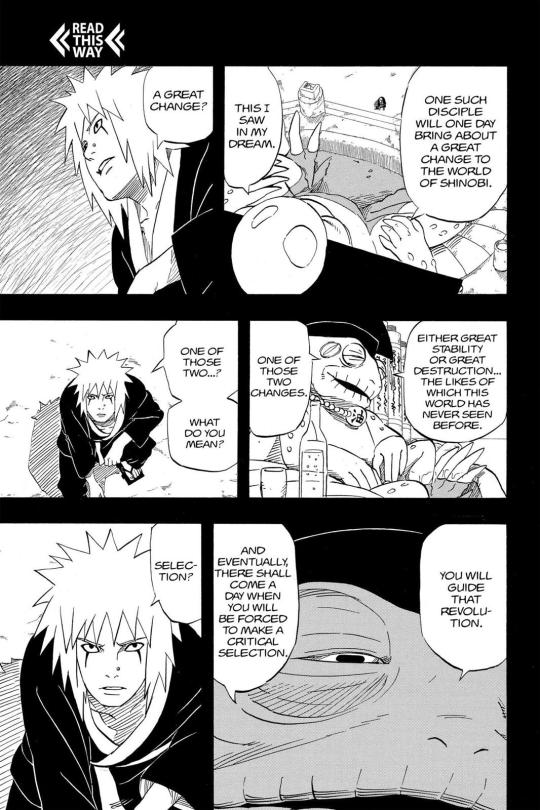


Ch. 376, when Gamabunta first imparted the Prophecy to Jiraiya that would go on to shape the rest of his life.

Ch. 372, Jiraiya first discovered that Nagato possesses the Rinnegan. He reflects on what he was told about the Child of Prophecy.

Ch. 606, where Madara's awakening of his Rinnegan is recalled, thereby beginning the Prophecy at all.
As we can see with these panels, the Prophecy is what begun Jiraiya and Madara's unknowing clash, that would lead them both to shape their own and each other's disciples, even if the way Madara acquired his could be more described as pawns, they still followed Madara's philosophies through him or Obito masquerading as him that would go on to shape the entire conflict of Shippuden. But, how did these disciples of theirs clash and intersect?
Chasing Parallels: The clash & intersection of their disciples
I genuinely think one of the most compelling cases for this ship is the fact that their disciples not only define the protagonists and antagonists of the story, but directly correlate with the prophecy was given by Gamabunta to Jiraiya that saw Madara himself as the antagonist. That is, the prophecy of the Child of Prophecy.
Let's take into account the students that Jiraiya had, first of all, who were labeled the child of prophecy:
Nagato
Minato Namikaze
Naruto Uzumaki
Conversely, we also have to factor Madara's own disciples, definitely including those Obito took on in Madara's name:
Nagato
Obito Uchiha
Sasuke Uchiha
Alright, but what are these three in relation to the Children of Prophecy? Where do the parallels and intersecting between Jiraiya and Madara's disciples begin?
Nagato:
What we know from the point above is the fact that discovering the Rinnegan in Nagato was what impelled Jiraiya to take on the Ame Orphans in the first place. Three years that would prove instrumental to the plot, that would shape Nagato's worldview as influenced by Jiraiya himself. But, how did Nagato get those Rinnegan in the first place?
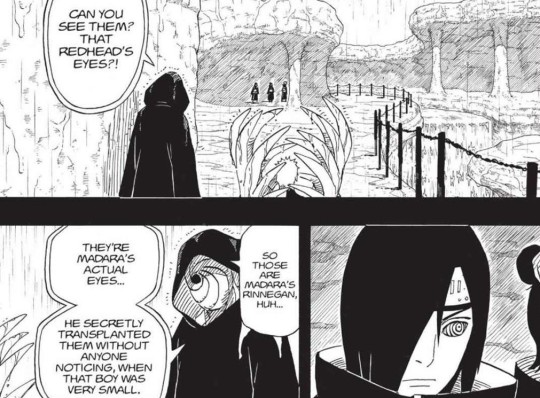
Ch. 606
Those eyes? They're Madara's, implanted at birth intentionally in order to keep them while Madara was waiting to be resurrected, and speculated by Minato.

Ch. 559, when Madara makes his first appearance.

Ch. 440, when Naruto met his father during his fight with Pein.

Ch. 601, where Madara and Obito discuss Nagato's betrayal.
What would go on to occur is the fact that, not only did Madara's Rinnegan cement the bond Jiraiya had with the Ame trio, but also shape them - especially Nagato - significantly. That conflict would go on to further the story in ways it wouldn't have if Jiraiya had never taken on the Prophecy and become one of Madara's most enduring yet unknown antagonists. Just as Madara would become the unseen antagonist of Jiraiya's life and his ambition connected to the Prophecy.
Minato:

Ch. 503, when Jiraiya speculated that Minato himself might be a Child of Prophecy, too.


Ch. 502, when Obito - posing as Madara - clashes with his old sensei.
In yet another encounter, Minato - who was Jiraiya's student before the Ame trio - faces off with his former student he believes is Madara, which is fitting as Madara was one of the only known people in existence known for being able to tame bijuu with his Sharingan. Let alone being able to make a summoning contract with the infamous demon fox himself.



Ch. 371, which is also, coincidentally, the first image of Madara shown outside the statue at the Valley of the End ever seen in the manga.
Jiraiya, too, correctly guesses this hunch that Minato made but clearly couldn't convey to Jiraiya himself on account of being dead. But, like his master, Minato correctly presumes the person he's facing is Madara even if it's not Madara himself. But, well, we all know where that goes with Obito becoming "Madara", and all...
Naruto:

Ch. 437, when Ma calls Naruto the Child of Prophecy for the first time, something likely gleaned from Gamamaru or Jiraiya.
As the main protagonist, it's only natural that Naruto would have the most clashes out of the three, especially compared to Nagato or Minato. But still, they are notable and extremely defining. Remember to keep in mind, Nagato's path as Jiraiya's student, as someone who was shaped by him and later Madara through Obito, his encounter with Naruto is the most significant because of how much Nagato was shaped prior by the Second Shinobi World War that Madara typified in his nihilistic philosophy, then Jiraiya, then again by Madara's views through Obito. This clash - not the battle for Konoha itself - is the closest we truly come to them bridging the gap due to how untouchable Madara is by Naruto's will, which calls for this example.
But, as the main protagonist, Naruto contends with Madara's philosophy more than just once. He does it twice, in fact.
Naruto and Nagato:
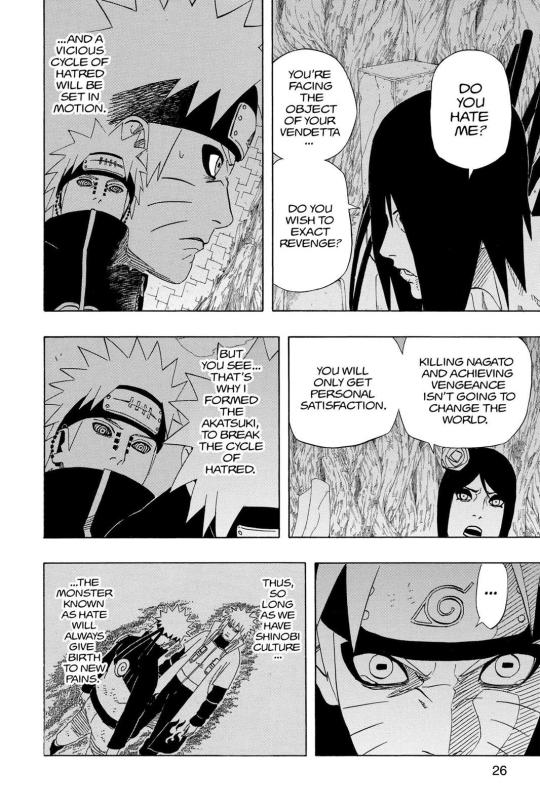

Ch. 444, at the beginning of Naruto's confrontation with Pein where the clash of Jiraiya and Madara's ideals truly shines.
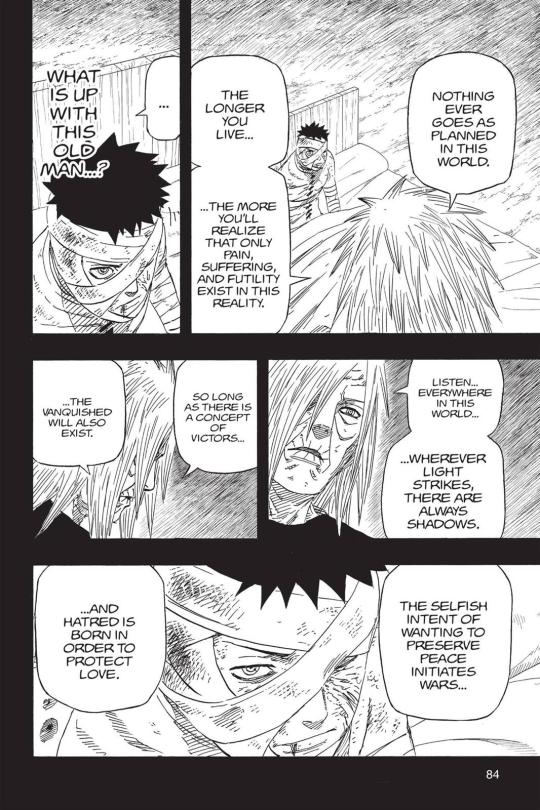
Ch. 602
Remember, the core of Nagato's philosophy is a closer reflection of Madara's than it is even of Yahiko's, even if Yahiko did form part of Nagato's negative worldview before Jiraiya, Madara's completed it the best.

Ch. 372
The panel that defines Yahiko's philosophy, juxtaposed to Madara's, as shown above.

Ch. 372
Continuing on, as seen with what Naruto begins with, it's exactly the same thing that Jiraiya imparted on to Nagato after he felt guilty for killing an Iwa-nin to protect Konan and Nagato.
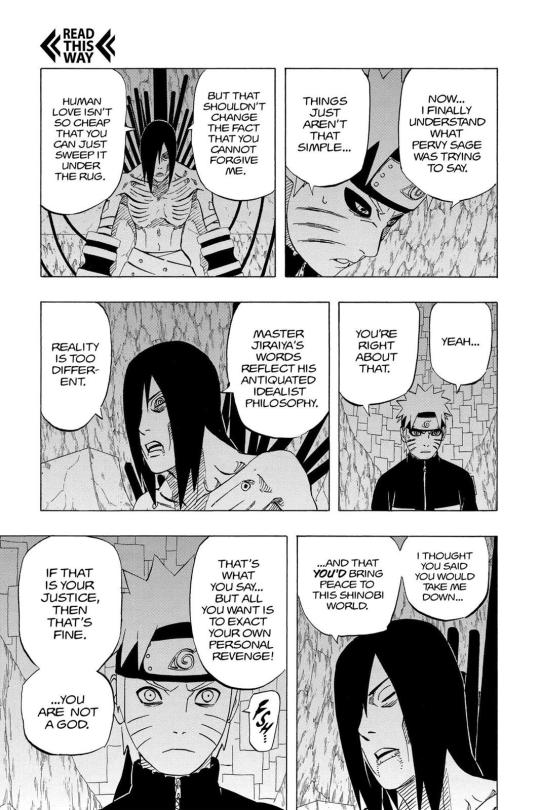
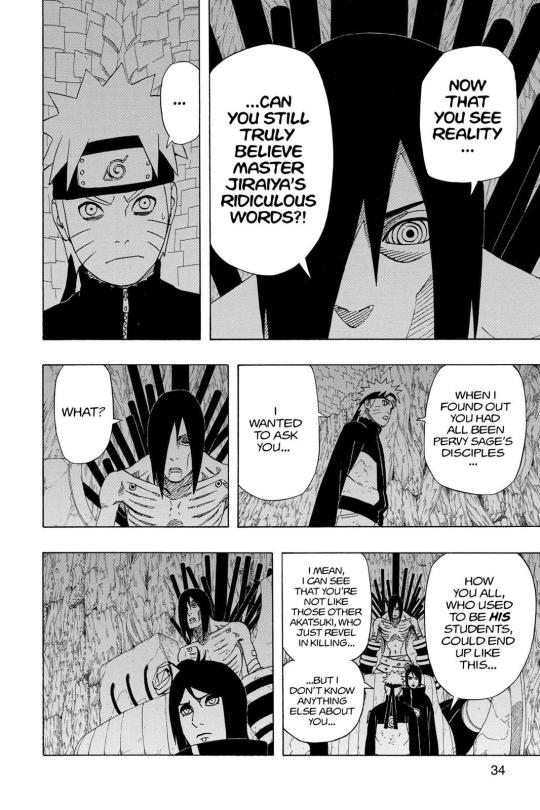
Ch. 444

Ch. 446
Yet, despite all this disparity between them, there were times when both teachers agreed, even if it was at both extremes of this prophetic spectrum.

Ch. 446

Ch. 602
It's a strange agreement, to be sure, but Jiraiya and Madara wanted the same endgame for the world despite how twisted Madara's methodology would come to be. One that ultimately made both clash, even if it was never directly.



Ch. 447, where Nagato and Naruto come to a proverbial draw in their battle of wills, of their teacher's will versus what Madara would come to impart on Nagato indirectly.
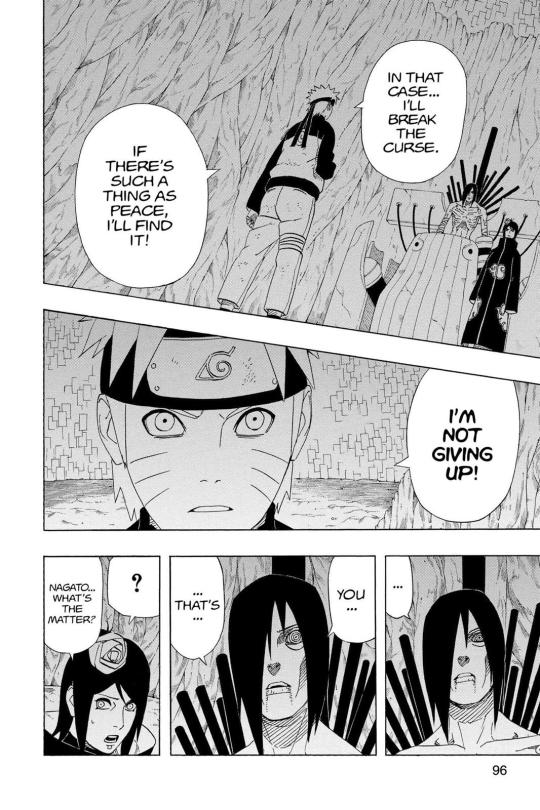
Ch. 448
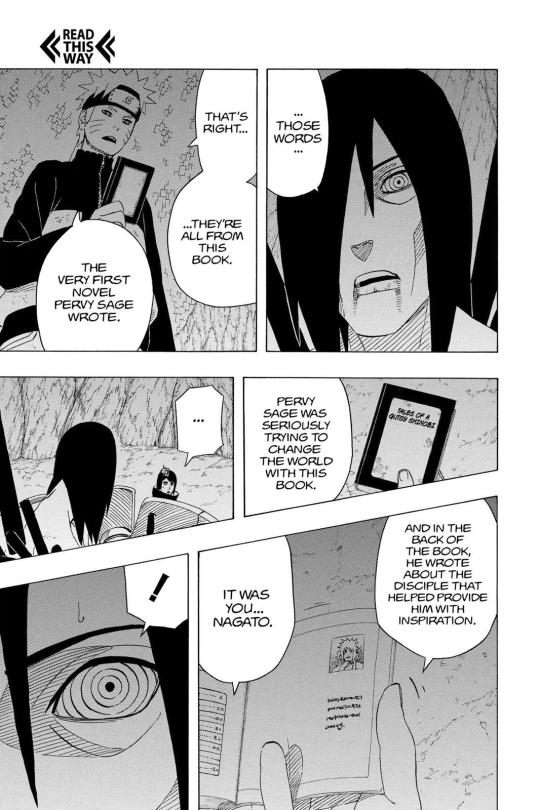
Ch. 448
Here, we come to the penultimate moment where Madara's hold over Nagato is shattered. The dissolution of his nihilism, the clash that would see Jiraiya win.

Ch. 448, the moment when Nagato provided the inspiration for Jiraiya's titular main character in The Tale of the Gutsy Shinobi, a book that was like the prediction of what was to come in much the same way Morgan Robertson's The Wreck of the Titan would predict the Titanic's demise over 14 years earlier (even if Gutsy Shinobi is a lot more hopeful!).
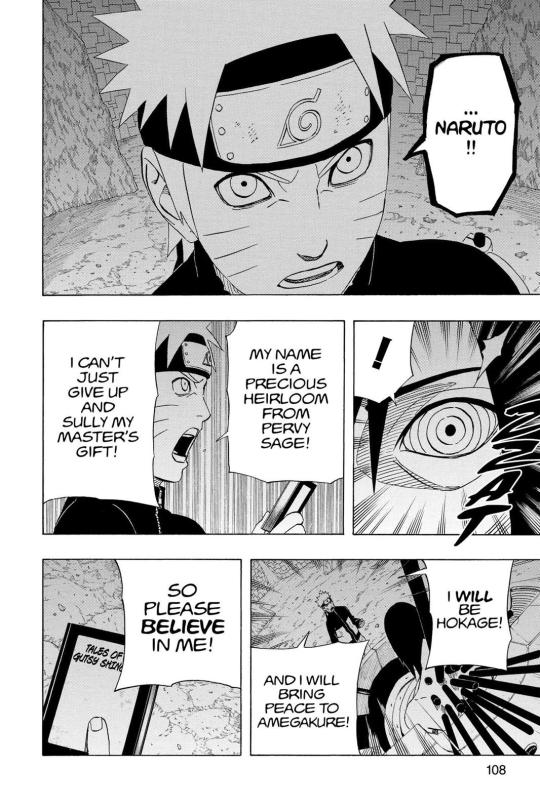
Ch. 448, where the prediction of Jiraiya's first book would come true through Naruto.


Ch. 448, in what seems to wrap up the prophecy... for now, at least.
Naruto and Obito:
It's during the Fourth Shinobi World War that Naruto and Obito - Minato's student, whom was Jiraiya's before that - finally clash with each other after Obito becomes the 10-Tails' jinchuuriki. Naruto and Obito were alike, once, before Madara broke Obito and conferred upon him his nihilism.


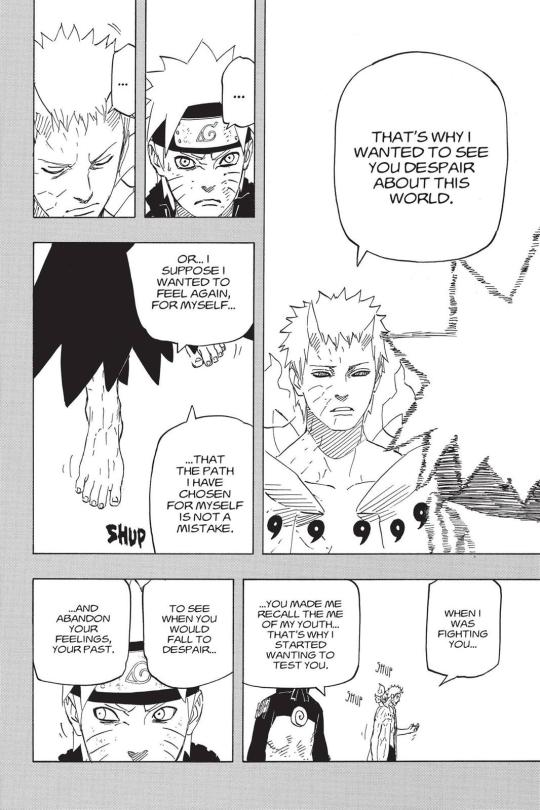
Ch. 653, where Obito outright admits to wanting to test Naruto, to pit Madara's (that he deludes himself into thinking is his own) nihilism against Jiraiya's teaching, that bolstered and matched Naruto's hope for peace in the world. A path that Jiraiya further inspired Naruto to take.


Ch. 653
Like Nagato before him, Naruto bears an uncanny number of similarities to Obito. And like Nagato, he was someone who believed and wanted peace in the world who was indirectly inspired by Minato to seek that peace through the same teachings that Jiraiya conferred.


Ch. 653, where Naruto explains what it means to be Hokage the opposes Obito's, a definition that didn't come from out of the blue.


Ch. 159, where Jiraiya defines what it means to be Hokage that matches Naruto's, that transfigured Naruto's initial dream of wanting to become Hokage for the sake of acknowledgment to what it really is: a shinobi who walks before his comrades and protects them.
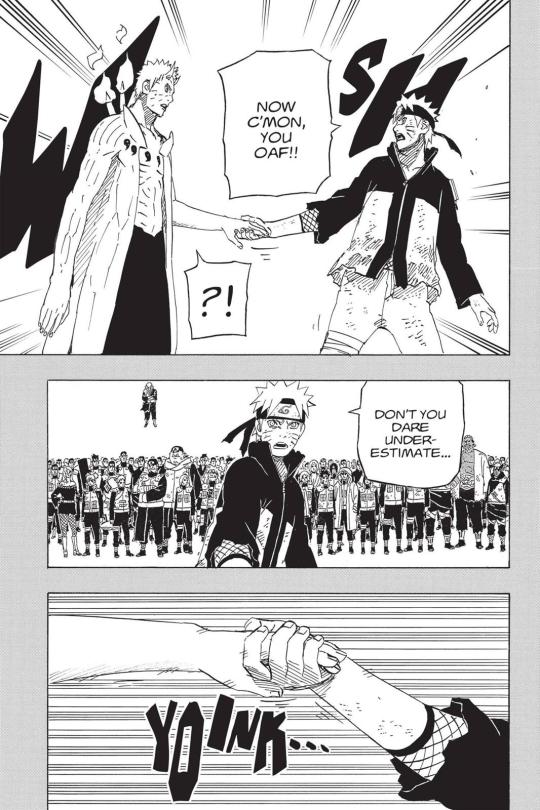
Ch. 653
And like Nagato before him, it was through Jiraiya's teachings that Naruto was able to pull Obito from Madara's darkness and fulfill yet another leg of the Prophecy. Another battle that Jiraiya spiritually won against Madara, even after his death.
Another Intersection: "Madara" & Sasuke

"As Sasuke was the reincarnation of Indra, his was a person with a destiny that was attached to the seal of Kaguya. From the SAge of Six Paths, he awakened the Rinnegan and the key to the seal…That was the evidence of Sasuke’s heartfelt [effort] and desire in wanting to rescue the world.
While jointly struggling for a long time, outstanding cooperation was shown for the children of prophecy. As expected, it was Naruto and Sasuke, similar to being half [of each other’s] bodies."
- Fourth Databook, Sasuke entry (Scan & Translation)
As written in the 4th databook, Sasuke, too, is considered a child of prophecy and makes this intersection equally relevant. While this isn't quite an example of Jiraiya and Madara's ideals pitted against each other, I think it belongs here.

Ch. 396, when "Madara" first takes Sasuke under his wing after his battle to the death with Itachi.

Ch. 397
And here, Tobi introduces himself as Madara, yet another complicated entanglement that would lead to Sasuke, a child of prophecy, also being indirectly manipulated by Madara.

Ch. 398
Even the cover chapter art for chapter 398 emphasizes the change that "Madara" makes in Sasuke, in influencing like he had Obito before him.
Now, it's rather pointless to summarize what's said, as it essentially boils down to "Madara" telling Sasuke about the truth of his brother, the Uchiha Clan Massacre, and his own backstory. Through chapters 396 to roughly 402, in telling Sasuke the truth - much in the way it had been revealed to Obito himself before him - was he changed. Not forever, but what was made apparent was that Sasuke became aligned with "Madara", his philosophy and aims, even if it wasn't to the same extreme as Obito.


Ch. 402, when Team Hebi becomes Team Taka.

Ch. 626, during the flashback of Hashirama telling of his past with Madara.
And like Madara before him, Sasuke seems to come full circle and inherit the same role Madara had as antagonist, adopting Madara's will.

Ch. 371
All according to "Madara's" original plan.
SNS Parallels: Sasuke as Madara, Naruto as Jiraiya
Another major crux of this analysis, aside from the Prophecy and the intersection of their ideals and disciples, is that Sasuke is likened to Madara and Jiraiya to Naruto. In breaking tradition, Sasuke isn't like Orochimaru despite being groomed as a new vessel and Naruto to Hashirama, despite Orochimaru being Jiraiya's narrative parallel and Hashirama Asura's former transmigrant before Naruto.
Sasuke was never meant to be like Orochimaru
Something made abundantly clear was the fact that Sasuke was never meant to be the next Orochimaru. Sasuke himself drives this point brutally home.

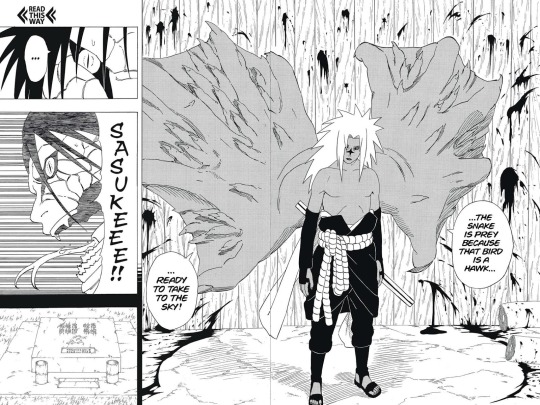
Ch. 344, when Sasuke breaks free of Orochimaru's control.
As we see here, Sasuke himself completely rejects the notion of being the next Orochimaru, both literally and figuratively, comparing himself to a fully-fledged hawk that the snake - Orochimaru - couldn't control. Before this, he tears apart Orochimaru's character, degrading them (though, I doubt that needs to be put here).

Ch. 345
And as the chapter proves, the only way Sasuke could ever be like Orochimaru is through becoming their next host, which doesn't happen.
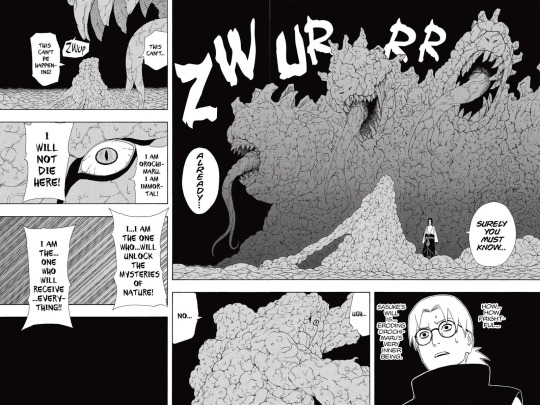
Ch. 346, where Sasuke is the one who is the victor and absorbs Orochimaru, overpowering them.
Simply put, where the generational parallels go, the very narrative refutes the notion that Sasuke is like Orochimaru, at all. Aside from being the level-headed geniuses of their generation, they're nothing alike and cease to ever be such a consideration. (Not that I think it's a bad thing. The fact that Orochimaru exists outside of the generational parallelism Kishimoto locked many of the characters in enhances the poignancy of their character, not diminished it, especially as such a fascinating antagonist acting of their own accord - not destiny or fate - in Part 1.)
Sasuke as the next Madara
However, there is one character that Sasuke is compared and considered the next iteration of, and that's Madara himself.

Ch. 309, Kurama and Sasuke meet for the first time.
As it likely doesn't need to be said, as Kurama had once been Madara's unwilling thrall, even before the plot with Asura and Indra transmigrants, Sasuke was likened to Madara. But, it's not the only time this comparison is made.

Ch. 620, where Hashirama - Madara's childhood best friend - outright calls Sasuke out as possibly being the next Madara.

While I don't quite know the chapter, Orochimaru - the one who didn't turn out to be Sasuke's parallel - outright compares Sasuke to Madara.

Another unknown, but here, Tobirama - another lifelong enemy of Madara - further emphasizes Sasuke as being like Madara.
With Sasuke not being like Orochimaru, and admitted to being like Madara by the Sannin themselves, the verdict is clear: Sasuke is identically similar to Madara - as confirmed by his contemporaries and enemies alike. Hell, even Hashirama likens him to his younger brother, Izuna.
The verdict? Sasuke is like Madara, hands down.
Naruto being like Jiraiya

Ch. 245, during Naruto and Sakura's reunion, which means Tsunade and Jiraiya's as well after 2.5-3 years.
As I've affirmed above pretty exhaustively, Naruto's philosophy and ideals mirror Jiraiya's almost exactly. To the point that Tsunade, Jiraiya's long-time friend and fellow cellmate, sees Naruto as being almost exactly like him.

Ch. 430, during Naruto's return to face off against Pein
As we can see with Naruto's arrival to the battlefield of Pein's invasion, one of the first things on Tsunade's mind is how Naruto seems to manifest the very will and dreams of his predecessors by protecting Konoha - seeing the backs of Minato, Jiraiya's student, and Jiraiya's, too.

Again, an unknown chapter.
Now, don't get me wrong, I'm willing to concede that, yes, Naruto has been likened to Hashirama before. While official material like this exemplifies it, I think it's important to keep in mind that Naruto being likened to the Sannin as Neo-Sannin has been around longer than the transmigrant plotbunny ever has. Let alone comparisons between Naruto to Hashirama outside of the predestined reincarnation cycle.
Essentially, given the extensive parallels between Naruto, Jiraiya, and his students, it's clear that Naruto has more parallels with Jiraiya than he does with Hashirama, despite being on the same reincarnation cycle as the Senju.
But, come what may...
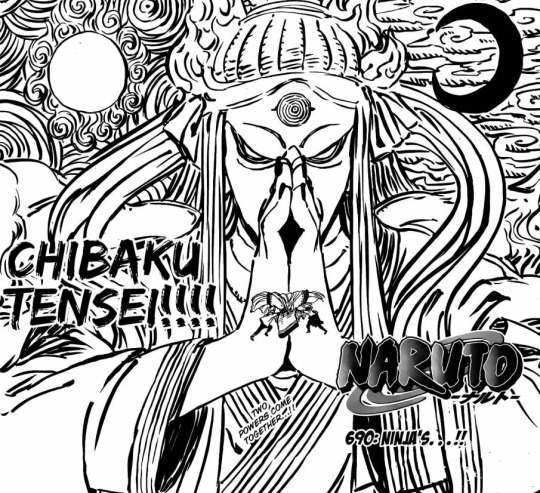
Ch. 690
...Naruto and Sasuke are the ones who fulfill the Prophecy, together, following in the footsteps of those who came before them. Two men who either realized, or came to terms with their failure in trying to bring world peace.
Headcanon: Rinnegan evolving from the Sharingan

Ch. 671, when the Rinnegan are awakened
So, if one considers that the Rinnegan are an evolved form of Sharingan, that could mean that they could retain some characteristics. While I can't prove anything, this is a headcanon I've had of Madara's Rinnegan for quite some time.

Unknown chapter that divulges how Sasuke could see Itachi's memories after he was transplanted with his brother's eyes.
Now, with all this in mind, in regards to Jiramada since Nagato had Madara's eyes for ~29-30 years (from the time he awoke them (likely 6-9 y/o) to his death), what if the Rinnegan could retain memories like the Sharingan can? And since Nagato's Rinnegan were invoked for well over 3 decades, couldn't it mean that they could record memories like the Sharingan? And if Madara could access those memories of Nagato's once he got his own eyes back and both Jiraiya and Madara managed to survive the war? (Who doesn't love a good Everyone Lives AU?) Well... I imagine it might be angsty, to say the least.
Ways I ship the Thing
To put it expressly, while I've petered my way through the canon connection and intricacies of Madara and Jiraiya's dynamic, in what ways would I ship them?
Everyone Lives AU: Seeing a lot of characters died that people didn't want to die in Naruto, Jiraiya and Madara meeting this way could be compelling.
Madara caused Jiraiya a lot of grief: If there's a compelling angle to any hero/villain ship, it's the fact that Madara was responsible for a lot of Jiraiya's pain and loss through the years. Not only would meeting the other be monumental, but Jiraiya discovering how deep Madara's villainy in his life went - especially with his loved ones and disciples - could be a perfect frame for a post-war meeting & AU.
"Madara" is really Madara: An AU where Madara was really Tobi the entire time could also yield some poignant villain/hero dynamics and struggles.
Purelands: Seeing as Madara and Jiraiya both die in canon, them working through their enmity and differences in an afterlife could also be the subject of fanfic.
Gen Swap: AU's where Jiraiya was alive in WSE/Founders' Era or Madara born in the Sannin's era is also a possibility. With four canon brothers, the Madara of such an AU in the latter scenario could've easily been someone like Izuna.
Redemption: Again, Madara was opposed to Jiraiya throughout the Prophecy. Post-war Madara having to be put under a survived!Jiraiya's jurisdiction could be sweet and complex as hell.
Honestly, regardless as to how this is approached, this entire meta is my ship manifesto; the reason why I ship such an unknown but deeply compelling couple. Not only is it a facet of the tried and true hero/villain shipping trope (or, enemies-to-lovers, enemies-friends-lovers), but the depth these two have in each other is any reason to ship them beyond just acknowledging their canon parallelism as masterminds and influencers on the manga's overarching plot, in Part II especially.
(That, and the hair... Hairpair, anyone? Oh, and the fact that Jiraiya is considered Naruto's grandfather while Madara is - typically - jokingly referred to as Sasuke's (or another family figure) and is a common fandom gag, if not taken seriously.)
Basically, this ship is deep as hell and defined a lot of Shippuden's canon despite how little it's acknowledged.
4 notes
·
View notes
Text
EVERY FOUNDER SHOULD KNOW ABOUT PEOPLE
I can tell, the first is mistaken, the second outdated, and the content was irrelevant. I've written just for myself are no good. And even in those fields they depend heavily on startups for components and ideas. A round, before the VCs invest they make the company set aside a block of stock for future hires—usually between 10 and 30% of the company. Now even the poorest Americans drive cars, and it surfaces in situations like this. For example, I write essays the same way a textile manufacturer treats the patterns printed on its fabrics. The worst variant of this behavior is the tranched deal, where the investor makes a small initial investment, with more to follow if the startup tanks, so long as you keep morphing your idea.
Universities with x departments will subscribe to the journals. This may not be the best source of advice, because I have to read all the applications. Existing needs would probably get satisfied more efficiently by a network of startups than by a few giant, hierarchical organizations, but I haven't seen it. The experience of the SFP suggests that if you let motivated people do real work, they work hard, whatever their age. History suggests that, all other things often are not equal: the able person may not care about money, or may prefer the stability of a large public company makes about 100 times as much as submission. Retailers are less of a bottleneck as customers increasingly buy online. One of the most important factor in the success of any company. Whoever controls the device sets the terms. Students be forewarned: if you start a startup. Leave the people you'd spent your whole life with, to live in a giant city of three or four thousand complete strangers? What would you think of a time when employers would regard that as a mark against you, but you probably don't.
I know. Closer to fraudulent. Will Filters Kill Spam? If the company is their performance. I'm a writer, but most can upload a file. Another of our hypotheses was that you can get. Until you have some users to measure, the more wealth you generate. Whereas top management, like salespeople, have to actually come up with answers. We can find office space, thanks; just give us the money. The point of programming languages, is that there are huge variations in the rate at which wealth is created.
What's going on? He has ridden them both to downtown Mountain View to get coffee. And that's what you do or what I do is somewhere between a river and a roman road-builder. Thousands of people must have known about this problem. Are you crazy? Startups happened because technology started to change so fast that big companies do is boring, you're going to have to pay for the servers that the software runs on, and the number of people retain from childhood the idea that we ought to be the case in individuals. The groups then proceeded to give fabulously slick presentations.
If a round takes 2 months to close, and once founders realize that, it's going to stop. I'm not claiming the multiplier is precisely 36, but it was designed for its authors to use, and a significant percentage get rich, how would you do it by fixing the things in the language that required so much explanation. All you need is strong convictions. Don't realize what you're avoiding One reason people who've been out in the end, and now he's a professor at MIT. And how do you design a language that actually seems better than others that are available, there will be a proliferation of devices that have some kind of anomaly make this summer's applicants especially good? Northern Italy in 1100, off still feudal. We decide based on about 10 minutes of reading an application plus 10 minutes of in person interview, and we invest so early that investors sometimes need a lot of work, like acting or writing books, you can't start a startup like this than a recipe site? Which means things must have been to till the same fields your whole life with no hope of anything better, under the thumb of lords and priests you had to give all your surplus to and acknowledge as your masters.
If there had been one person with a brain on IBM's side, Microsoft's future would have been before English evolved enough to make it. Ignorance can't solve everything though. The essential task in a startup depends on the kind you want. And people with that attitude are the ones who are good at it, and that's why we even hear about new, indy languages like Perl and Python. She can't do it half-heartedly. Take away the incentive of wealth, because the company would go out of business, even if it's easy and you get paid a lot. Nearly all wanted advice about dealing with future investors: how much smarter are you than your job description expects you to be a nice way of saying what all founders hate to hear: I'll invest if other people will. Whereas designing programming languages is to prevent our poor frail human brains from being overwhelmed by a mass of detail. As you might expect, it winds all over the face of the earth. A viable startup might only have ten employees, which puts you within a factor of ten of measuring individual effort. Beeton's Book of Household Management 1880, it may not just be because they're academics, detached from the real world.
It was English. Some of the smartest people around you are out of their element. And the books we did these disgusting things to, like those we mishandled in high school, I find still have black marks against them in my mind. A McDonald's franchise is controlled by rules so precise that it is practically a piece of software, could write a whole new piece of software, could write a whole new piece of software, could write a whole new piece of software, could write a whole new piece of software, and none selling corn oil or laundry detergent? Three months' funding is enough to get into second gear. Indirectly, but they want to win. Talking to reporters makes her nervous. Ideas can morph.
If I were in college now I'd probably work on graphics: a network game, for example, grew big by designing a system, the McDonald's franchise, that could then be reproduced at will all over the country, students are writing not about how a baseball team with a small group. So I think efficiency will matter, at least in our tradition lawyers are advocates: they are trained to be able to enjoy them in peace. I think they fail because they select for the wrong people. But while you don't literally need math for most kinds of hacking, in the sense of knowing 1001 tricks for differentiating formulas, math is very much worth studying for its own sake. They seemed a little surprised at having total freedom. Someone who's not yet an adult will tend to respond to a challenge from an adult in a way that was entirely for the better. Why? And she wrote three separate essays about the question of female founders. And in desktop software there is a significant correlation. For most people, the most powerful tools you can find a good teacher. This is my excuse for not starting a startup molds you into someone to whom starting a startup and failed over someone who'd spent the same time working at a low intensity for forty years, you work as hard as you can. What a company does, and the only lasting benefits were a weird ability to identify semitic roots and some insights into how people recognize words.
Thanks to Paul Buchheit, and Jessica Livingston for putting up with me.
#automatically generated text#Markov chains#Paul Graham#Python#Patrick Mooney#device#ones#laundry#things#math#people#VCs#way#employers#funding#side#anything#earth#block
1 note
·
View note
Photo
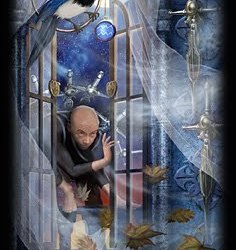
https://shadesofmidnight.wordpress.com/2011/08/23/the-7-of-swords-the-lone-wolf-complex/
The 7 of Swords is one of the more deeply-textured of the Minor Arcana cards that both novices and experts alike struggle to interpret. My own personal quest to understand the 7 of Swords has been fraught with frustration, apathy, and enlightenment in turn as the various meanings attached to this card have become clearer to me over time. The numerological suit of the 7’s speak of detachment, choice, spirituality, the analytical mind, and the scholarly aspects of metaphysics, the occult and religion. This number features prominently in the numerological makeup of philosophers, theologists, scientists and those with a decidedly left-brained slant to life. In the 7 of Swords, the cool, analytical detachment of the 7 is married with the element of Air (Swords), bringing an intensely intellectual feel to the card. Here, the mind and its cognitive faculties are given prominence, with thoughts, attitudes and beliefs playing a core role in the interpretation of this card in the context of its surrounding brethren.
Astrological Association: Moon in Aquarius.
In the Thoth deck, the 7 of Swords is titled Futility, and is astrologically correlated with the Moon in Aquarius. Lunar Aquarians are known for the eccentricities and loner-like tendencies, and the natural emotional effusiveness of the moon is tempered with cool logic and rational detachment. Those with this position of the moon tend to hold onto their independence regardless of marital status; marriage or a long-term committed relationship have no influence whatsoever on their ability to compromise. If a lunar Aquarian feels strongly enough about something, he or she will continue to pursue their path regardless of what their partner, family or culture tells them to do. Independence, willfulness, and a certain degree of stubbornness are all associated with this position of the moon as Aquarius is the sign of Fixed Air. Planets in Aquarius are focused on the mind, with the beliefs, attitudes and values assuming cognitive rather than emotional or spiritual significance, and once set, are strongly resistant to change.
There is a curious tendency for those with the moon in Aquarius to self-sabotage, especially when it comes to personal relationships and matters of the heart. Here, attachments are formed in the mind, and love is given definition in mental rather than emotional terms. Frequently, this position produces a ‘yes-but’ frame of reference in which helplessness or a sense of futility becomes prominent. It is important to remember that first and foremost, the 7 of Swords is a card of the mind, with the central sword in the Thoth deck representing the main aim/ goal to be achieved. The other six remaining swords are indicative of diverging viewpoints or ‘what-ifs’, thereby dispersing energy and making the individual less-focused on achieving said goal.
In the context of love and relationships, I’ve found the 7 of Swords to point more to an act of self-deception rather than actual deception. Look to the surrounding cards for more information. Adultery/ betrayal is more likely if the 7 of Swords is present with the 5 of Wands or 3 of Swords (and sometimes the 3 of Cups), but in the absence of these cards, it is best to explore the querent’s concerns in light of their own motivations for being in a partnership. While it is true that the ‘thief’ element introduces a certain level of negativity and is associated with ‘sneaking around’ or ‘cheating’, it becomes important to understand how trust is established in the client’s partnership. This card can point to unnecessary secrecy in a relationship that undermines the intimacy between two people. While boundaries are vital to any healthy relationship, excessive independence can lead to self-imposed isolation, leading both parties to detach from each other. Sometimes, this card can indicate a wish to get to know someone better but a lack of trust in both that person and yourself can keep you from making a move. Because of the 7 of Swords’ association with escape, evasive behavior in a partnership is possible. There can be a tendency to sweep issues under the carpet and pretend they don’t exist, or avoid communicating honestly about important problems in the relationship in the hope that they will magically disappear.
With regards to career, it is important to ask yourself if you’re shirking your responsibilities. In which case, this card could crop up as a warning that your recalcitrance might land you in hot water. Sometimes, this could also point to a career in research as depicted by the act of gathering up the swords (Air: ideas, mental concepts), or work in which written and spoken communication figure prominently. There is the possibility of sabotage through communication as well as a warning to not get embroiled in office politics, given this card’s association with deception and skulduggery.
n the context of a finance-related question, the 7 of Swords advises that ample research must be undertaken before committing to a major purchase or investment. For the time being, finances can be in a state of flux and will continue to remain so until an opportunity arrives. However, exercise caution when said opportunity does present itself as all may not be as it seems. Remember to be shrewd and discerning, and to maintain integrity at all times.
As a final word, the 7 of Swords is one of those cards that will remain ambiguous at the best of times so look to the surrounding cards for more information and don’t allow yourself to get trapped into interpreting a card based on its obvious characteristics. When I first started studying the tarot, I frequently felt frustrated by the appearance of the 7 of Swords and anticipated getting mugged/ burgled each time it cropped up as my ‘card of the day’. What I didn’t realize at the time was that because I was writing my Honours thesis, the card symbolized the act of gathering ideas….in essence, doing research!
1 note
·
View note